REIMAGINING AN INDUSTRY
NICK BAHL/ NAVDEEP SHARMA
The co-founders of ReelStar are using Web3 to rethink how the media and entertainment sector operates P.30
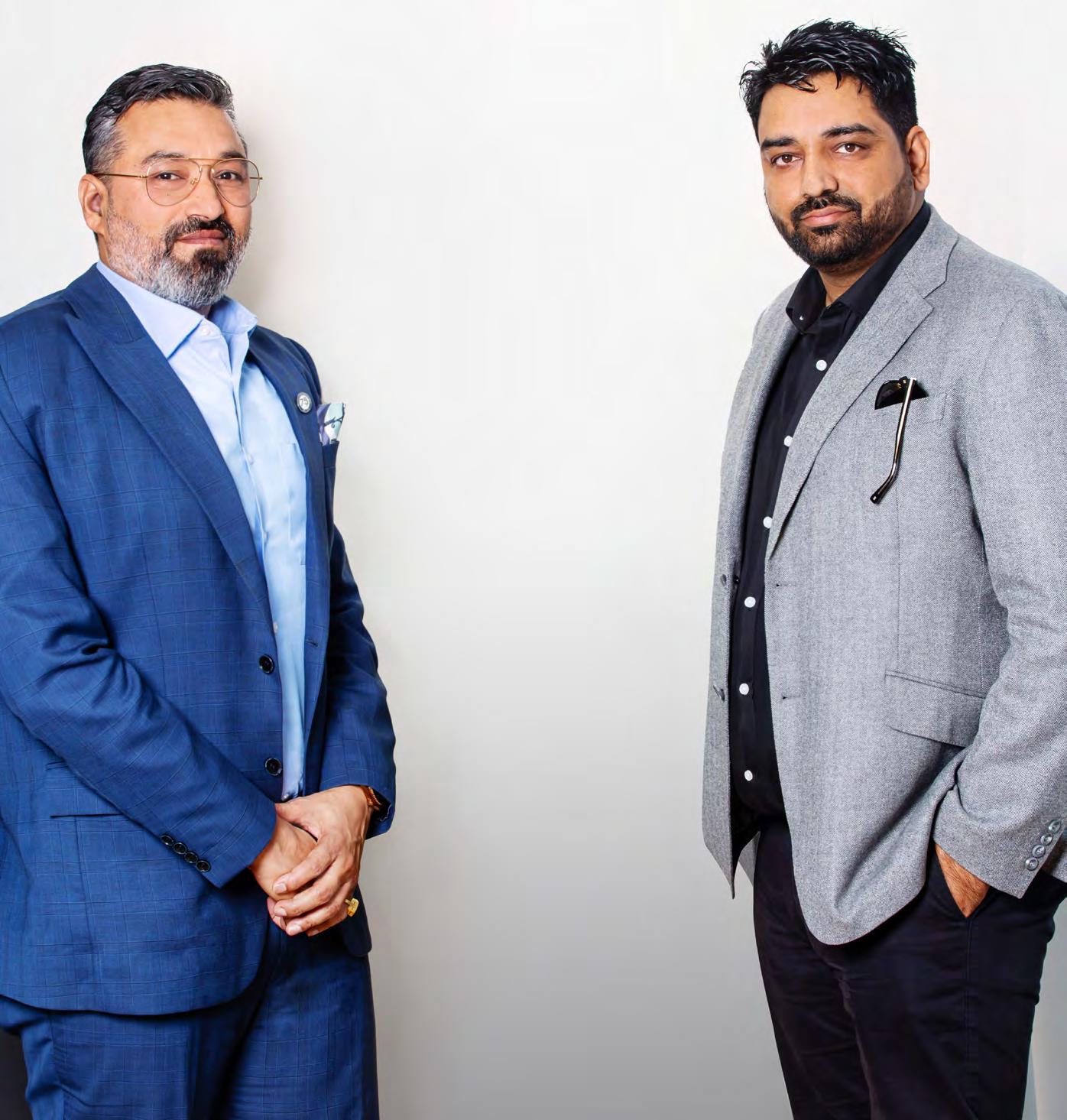
9 7 7 2 3 1 1 5 4 1 0 0 8 > March 2023
BUILDING
FOR THE LOVE OF THE STORY / Mojo Story Founder-Editor Barkha Dutt P.22
THE BOOTSTRAPPED BILLIONAIRE / Zoho co-founder and CEO Sridhar Vembu P.17
A LEGACY / Guerlain CEO Véronique Courtois P.38






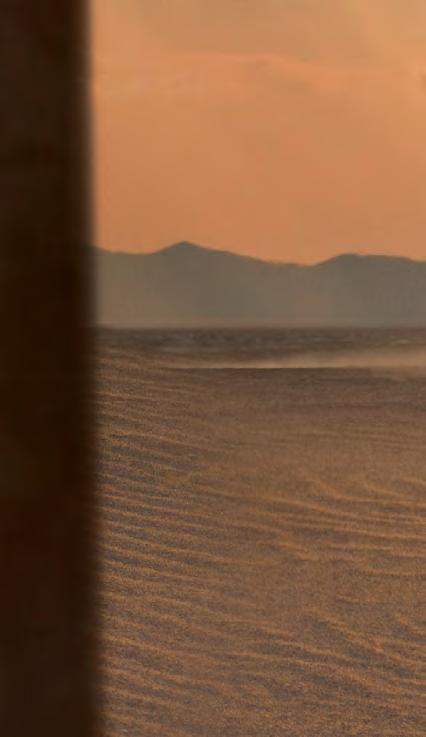
















FEATURES
P.17
The Bootstrapped Billionaire
Sridhar Vembu, the co-founder and CEO of the billion-dollar Zoho Corporation explains how the soul of his company remains grounded despite its growth.
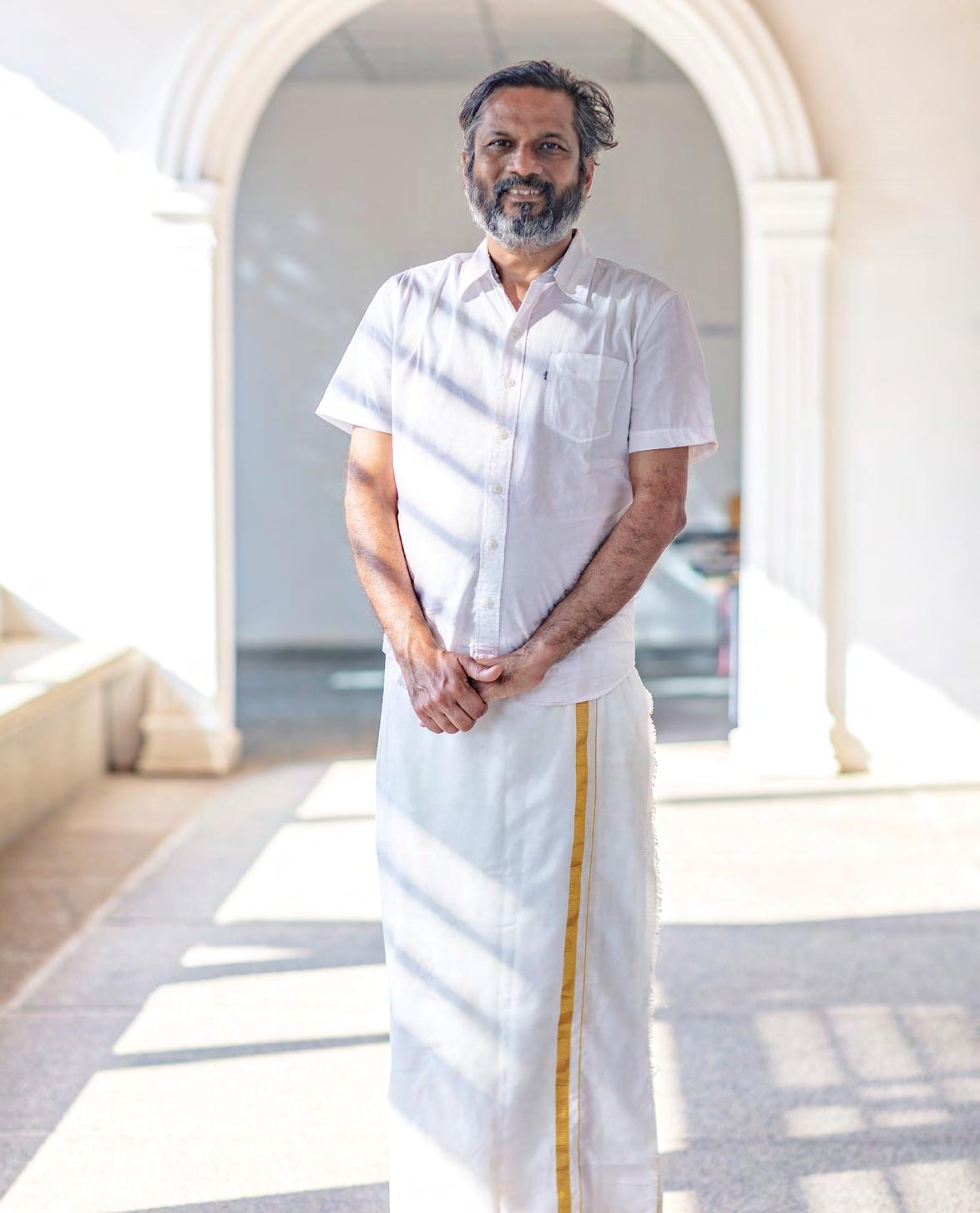 by MEGHA MERANI
by MEGHA MERANI
P.30
Reimagining an Industry
NICK BAHL / NAVDEEP SHARMA
The co-founders of ReelStar are using the philosophy and technology of Web3 to rethink how the media and entertainment sector operates.
by TAMARA PUPIC
P.38
Building a Legacy
VÉRONIQUE COURTOIS
The CEO of French beauty brand Guerlain feels a sense of responsibility for her future female successors.
by TAMARA PUPIC
← According to Forbes, ZOHO FOUNDER SRIDHAR VEMBU is the 55th richest person in India with a net worth of US$3.75 billion, as of 2021.
7 March 2023 / ENTREPRENEUR.COM /
Contents /March 2023
IMAGE COURTESY
SMIZE & DREAM



Welcome to the EXCEPTIONAL An iconic hotel featuring luxury rooms and apartments with trendy dining options in the heart of Riyadh BOOK NOW Mansard Riyadh, A Radisson Collection Hotel 4248 Prince Mohammed Ibn Salman Ibn Abdulaziz Road, Riyadh 6721-13315, Saudi Arabia 00966118290900 info.mansard@radissoncollection.com radissonhotels.com/collection
BUSINESS UNUSUAL
22 For the love of the story
Acclaimed Indian journalist Barkha Dutt discusses taking on an entrepreneurial persona as the Founder-Editor of Mojo Story.
26 Towards New Shores
Samer Hamadeh’s UAE-born F&B concept Akiba Dori expands into India with a 30-location franchise deal.
STARTUP SPOTLIGHT
69 Styling Made Simple
With her Dubai-based personal styling enterprise Wear That, Heidi Shara is offering women across the UAE a hyper-personalized way to choose outfits that define (and fit) them best.

72 Stronger Together
The story behind Saudi fintech startup Hala’s acquisition of UAE-based online payment platform Paymennt.
‘TREPONOMICS
53 The Path to (Peak) Productivity
An analysis of what it takes to become more effective (and efficient) at work.
58 Doing our Best (Instead of Doing it All)
Terming women as “superwomen” might be doing more harm than good, suggests Atteline founder and Managing Director Sophie Simpson.
60 Untapped Potential
Perihan Abouzeid, founder and CEO of PeriCare, makes the case for why companies must act quickly to welcome (and retain) working mothers.
63 Laying the Groundwork
Legal Circle Managing Partner Suraya Turk lists what startup founders raising capital need to know about term sheets.
66 Milking a Market
Founder Mustafa Koita takes us behind the scenes of how UAEbased Koita is aiming to satisfy South Korea’s organic dairy market.
EDITOR IN CHIEF Aby Sam Thomas aby@bncpublishing.net
CEO Wissam Younane wissam@bncpublishing.net
DIRECTOR Rabih Najm rabih@bncpublishing.net
CREATIVE LEAD Odette Kahwagi design@bncpublishing.net
MANAGING EDITOR Tamara Pupic tamara@bncpublishing.net
STARTUPS SECTION EDITOR Pamella de Leon pamella@bncpublishing.net
FEATURES WRITER Aalia Mehreen Ahmed aalia@bncpublishing.net
REGIONAL DIRECTOR Mahdi Hashemi mahdi@bncpublishing.net
HEAD OF INNOVATION
Sarah Saddouk sarah@bncpublishing.net
GROUP SALES DIRECTOR – B2B GROUP Joaquim D’Costa jo@bncpublishing.net
COLUMNIST Tamara Clarke
CONTRIBUTING WRITERS
Perihan Abouzeid, Fida Chaaban, Fazeela Gopalani, Mustafa Koita, Megha Merani, Sophie Simpson, Suraya Turk
SUBSCRIBE
Contact subscriptions@bncpublishing.net to receive Entrepreneur Middle East every issue
COMMERCIAL ENQUIRIES sales@bncpublishing.net
ENTREPRENEUR.COM
Access fresh content daily on our website
All Rights Reserved 2023. Opinions expressed are solely those of the
10 / ENTREPRENEUR.COM / March 2023
contributors. Entrepreneur Middle East and all subsidiary publications in the MENA region are officially licensed exclusively to BNC Publishing in the MENA region by Entrepreneur Media Inc. No part of this magazine may be reproduced or transmitted in any form or by any means without written permission of the publisher. Images used in Entrepreneur Middle East are credited when necessary. Attributed use of copyrighted images with permission. All images not credited otherwise Shutterstock. Printed by United Printing and Publishing. PO BOX 502511 DUBAI, UAE P +971 4 4200 506
2023 EntMagazineME Entrepreneur-me Contents
March
← HEIDI SHARA founded WEAR THAT in the spare bedroom of her house in 2018.
Boulevard living in harmony with nature

Homes from AED587,000* *T&C apply
Invest in upscale 1, 2 and 3 bedroom apartments featuring direct access to green parks with sports facilities and a busy boulevard with retail and dining experiences. Enjoy exclusive access to a residents’ only gym and swimming pool, and benefit from smart home features and premium white goods included as standard with every home.
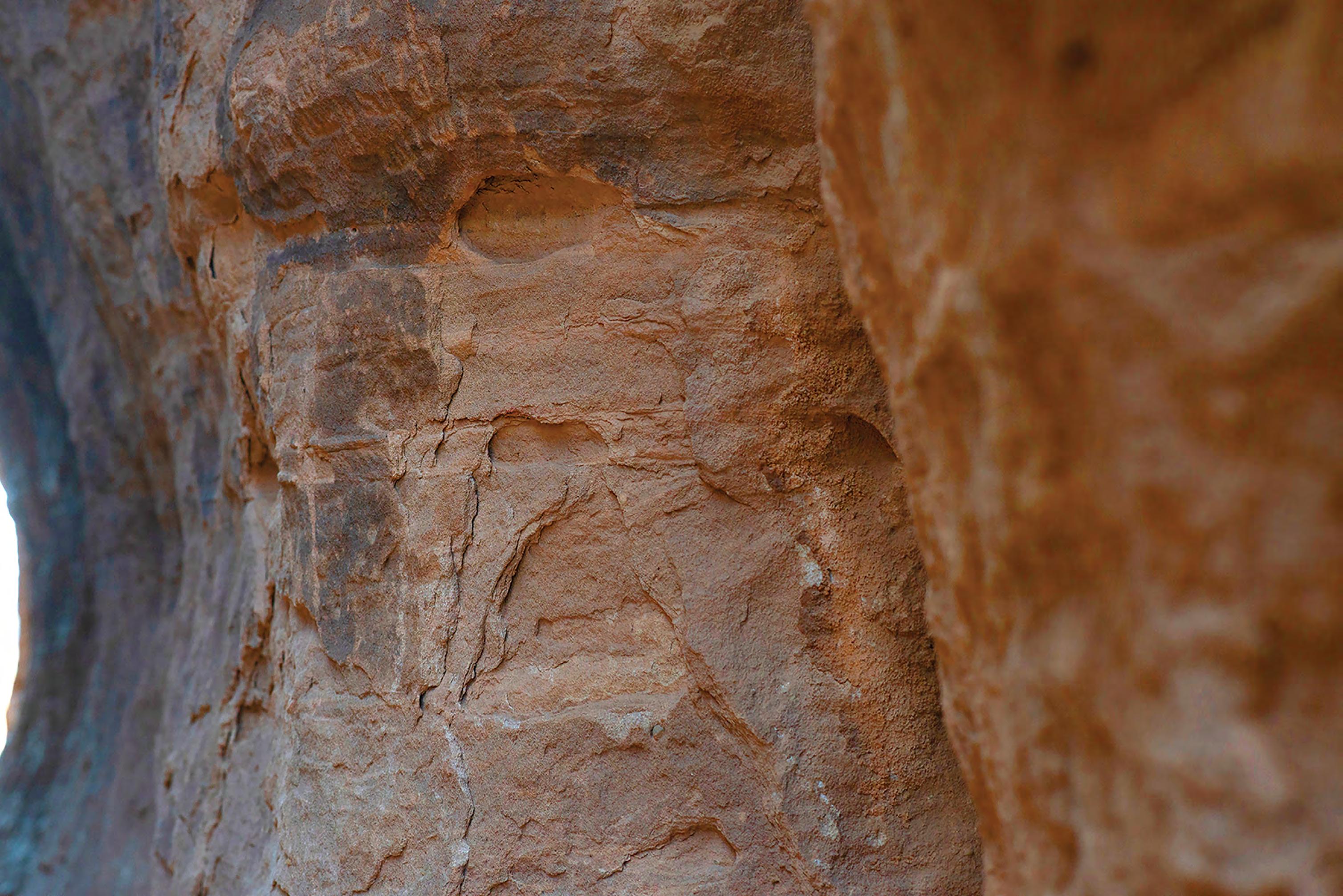



PASSING THE TORCH
(It’s not the entrepreneurial failure you might think it to be)

media platform, Mojo Story, in 2021. While she has already been able to lead her startup to become an award-winning journalistic enterprise, she readily admitted that being at the helm has been a rollercoaster ride- and this was in spite of her exceptional domain expertise. Dutt had nailed the reason for this: becoming an entrepreneur requires you to tap into a whole new set of skills that you might have previously thought you never needed. Most entrepreneurs, much like Dutt, have no qualms about getting their hands dirty to learn the tools of their (new) trade, and that’s certainly worth applauding. That said, founders would be wise to remember that they do not have to do everything themselves, and that letting others deal with aspects they are not experts in lets them to focus on their particular craft as well. Indeed, while it might seem like a founder needs to be the CEO of the venture they create, that is absolutely not the case. In fact. more good might be attained by relinquishing that role to another.
The flip side of being your own boss is that you have to think of so many things you wouldn’t have to think of otherwise.”
When the firebrand Indian journalist Barkha Dutt told me this during my interview with her in February (which has resulted in the article that’s published in this issue of Entrepreneur Middle East), I felt like I was having a deja vu moment. It’s a statement that I’ve heard from so many other founders who had decided to make inroads into entrepreneurship after having spent years becoming literal masters of their domains.

Dutt had left the news brand that she had been a part of for 20-odd years to start up her own digital
This is the realization that Dutt seems to have come to when she tells me, “I keep looking for somebody to run the business. And I haven’t found that person, but I’d really like to set free to just be a journalist.” This statement from Dutt is something I’m personally quite impressed by, as I believe it to be an indication of not just her love for the art of reporting, but also her dedication to ensuring the success and longevity of the business she has created. And if that means handing over the reins to someone else, then she’s ready to do that.
That’s a move the rest of us should keep in mind for our leadership arsenals.
Aby Sam Thomas Editor in Chief @thisisaby aby@bncpublishing.net
14 / ENTREPRENEUR.COM / March 2023 Editor’s Note /
Aby Sam Thomas with Indian journalist Barkha Dutt




The Bootstrapped Billionaire
Sridhar Vembu, co-founder and CEO of the billion-dollar Zoho Corporation, explains how the soul of his company remains grounded despite its growth by MEGHA MERANI
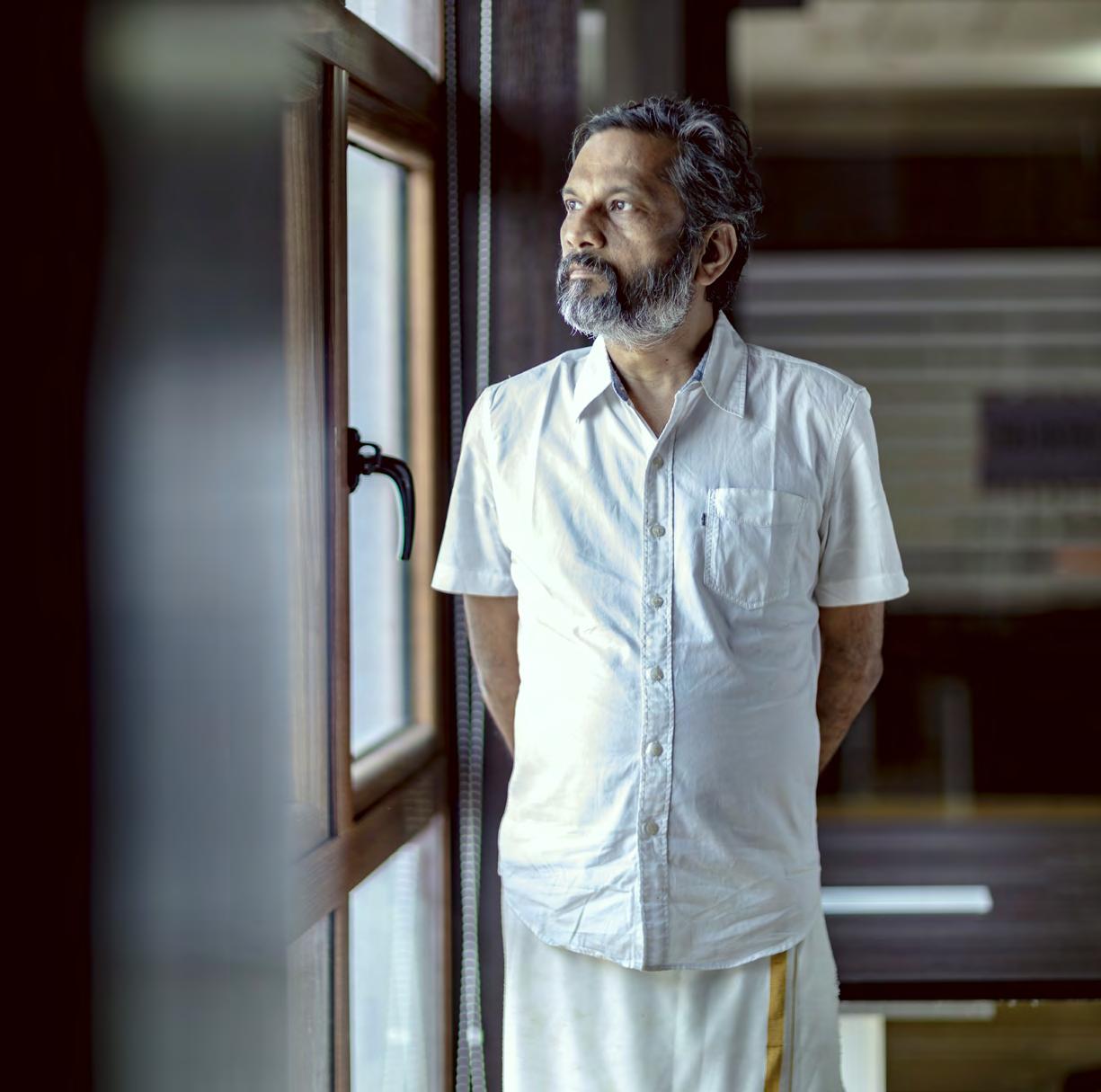
17 March 2023 / ENTREPRENEUR.COM /
IMAGES COURTESY ZOHO CORPORATION
→ SRIDHAR VEMBU’S INDIA-BORN SOFTWAREAS-A-SERVICE (SAAS) COMPANY, ZOHO, quietly surpassed US$1 billion in annual revenue in 2022, defying the global economic downturn- and proving that it is possible to grow in the absence of capital.
How many entrepreneurs do you know of that have built a unicorn without a cent of external funding?
Well, here’s one: Sridhar Vembu, co-founder and CEO of Zoho Corporation.
His India-born software-as-aservice (SaaS) company quietly surpassed US$1 billion in annual revenue in 2022, defying the global economic downturn- and proving that it is possible to grow in the absence of capital. Today, the bootstrapped company boasts 80 million users around the world across hundreds of thousands of companies.
“Our world of technology today is highly impatient,” Vembu tells Entrepreneur Middle East. “But patience is required. Whether it’s databases, compilers, or cloud software, it takes a certain amount of time to become an expert on anything. You cannot produce a global expert in three months, to build that technology, make it all work together, and make sure the customer is able to adopt it.”
Vembu founded Zoho in the mid-1990s, after ditching his career with Silicon Valley chipmaker Qualcomm to return to India, and become an entrepreneur.
“So much of top-level talent at Qualcomm was from India,” he recalls. “Yet, India could not produce a global technology company. So, I felt why don’t we go build one? I knew this would be a 25- to 30-year project, because I had studied Japan- companies like Honda, Sony, Canon, and Toyota didn’t become overnight multinationals. Nobody thinks in those terms anymore, but that doesn’t change the fundamental rules.”
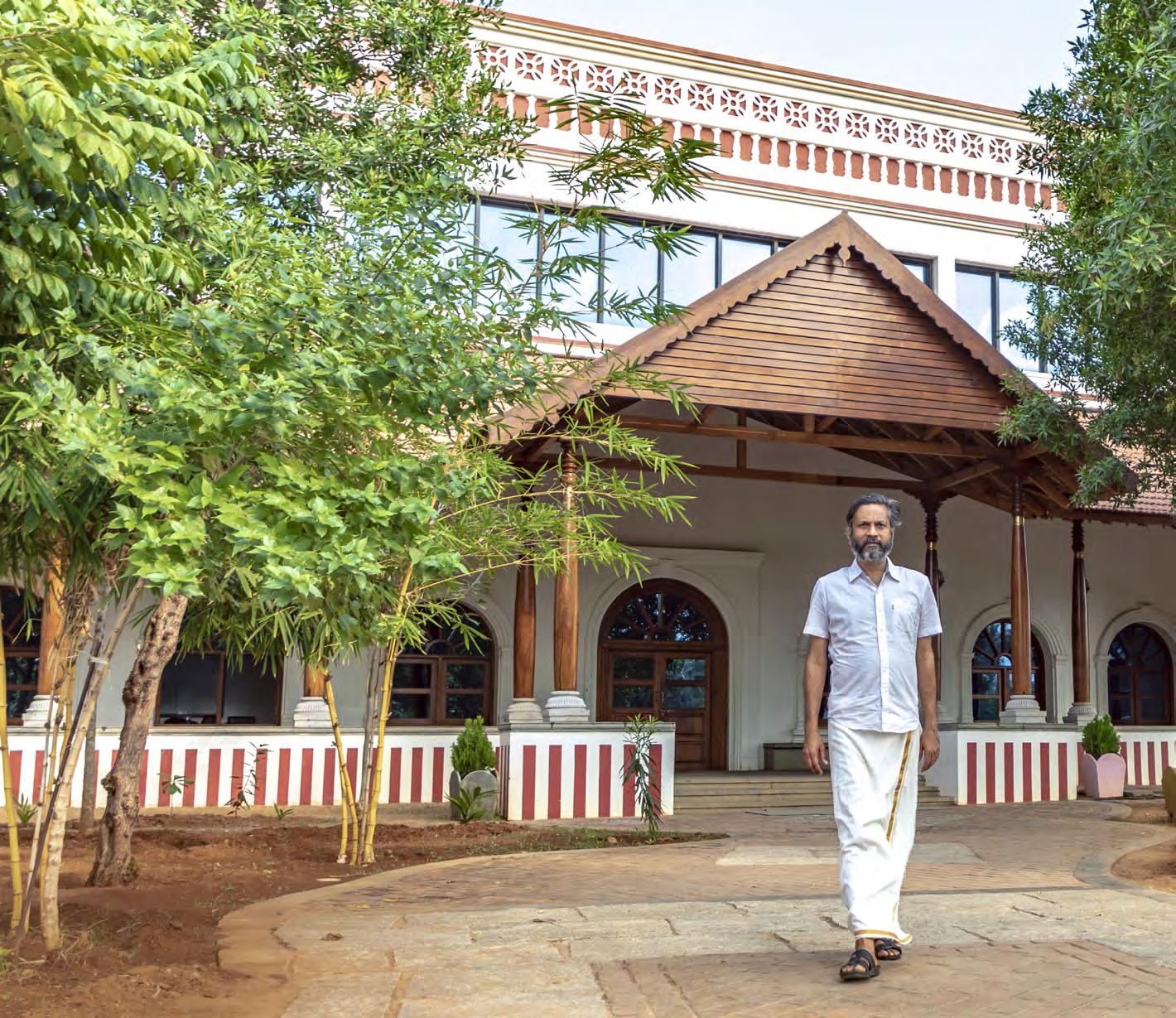
18 / ENTREPRENEUR.COM / March 2023
→ SRIDHAR VEMBU CO-FOUNDED ZOHO IN THE 1990S, in a small apartment located in the suburbs of Chennai in southern India, with a simple, yet revolutionary idea: “Build smart technology to help businesses work better.”
Here in the UAE, Zoho has grown 10x over the last five years. The Chennai-based global tech firm’s UAE revenues were up 45% in 2022, which made it the second-highest growing market for the company globally for the year. Zoho’s growth in the UAE has also been accelerated by its partnership with the Dubai Department of Economy and Tourism to make enterprise technology available to businesses of all sizes. Since 2020, Zoho has steered more than 3,500 small businesses in the UAE into its cloud, investing some AED20 million in wallet credits.
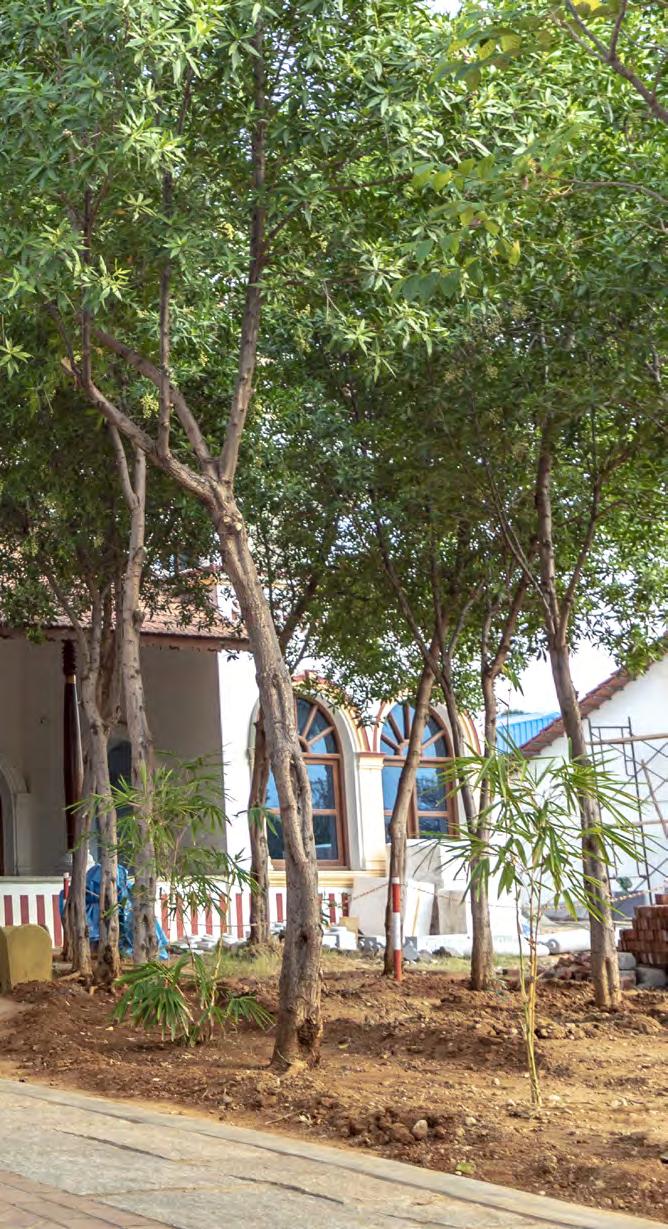
Now, as tech headlines shift from tales of record-setting raises to plummeting valuations, piling losses, and round after round of layoffs, there is plenty of blame to go all around. Vembu, however, attributes the brunt of the problem to easy money policies.
“It’s not the startups or the venture capitalists (VCs)– it’s the central banks,” he says. “It’s the Federal Reserve, it’s the European Central Bank, it’s the Bank of Japan… They kept
money too easy for too long, which fueled all these bubbles, that were inevitably followed by a bust.”
The bootstrapped billionaire added that the era of startups spurred by hundreds of millions of cheap dollars from VCs has “culturally destroyed” nascent ventures by driving them to hire too many people at once and overgrow.
“There’s only a certain rate at which you can grow,” he explains. “Raising money is not the issue. It’s inflated valuations and raising much more than you can handle. If somebody gives a company $100 million for a 10% stake, it’s not easy to spend that money wisely. You end up spending it wastefully, and those habits get ingrained in the culture. So, when money becomes tougher -and eventually it does- you don’t have the cultural habits of how to be frugal.”
Vembu also notes that while it was, of course, easy to get lost in the euphoria of fast-moving deals as investors poured in the millions, leaders have no excuse for remaining oblivious to the inevitable market cycles. “Startup founders should understand the history of technology and economic cycles,” he points out. “The Japanese bubble of 1989. The telecom bubble in Silicon Valley in 1999. History is our only guide. That’s how we can develop perspective.”
THERE’S ONLY A CERTAIN RATE AT WHICH YOU CAN GROW. RAISING MONEY IS NOT THE ISSUE. IT’S INFLATED VALUATIONS AND RAISING MUCH MORE THAN YOU CAN HANDLE.
According to a Crunchbase tally, more than 140,000 jobs were slashed from just American public and private tech companies last year -and another 100,000 or so this year- as they were forced to confront slowing revenue growth, higher interest rates to battle inflation, stock price plunges, and the chilly funding landscape. The likes of Google, Microsoft, and Salesforce -which Zoho competes with- have each laid off nearly or more than tens of thousands of employees, citing overhiring during the boom period.
“A certain type of corporate management has come to believe that people are an expendable resource,” Vembu says. “We don’t agree with it at all. That approach is not good for technology. It’s too easy to think, ‘I’ll hire a bunch of people when I need them, and let them go when I don’t,’ but research and development (R&D) requires very long investment timeframes. This is a high-context industry. We work on a lot of our products for five or 10 years before we achieve a state of perfection, where the customer likes the product. For this, employees have to be vested and committed, and that means the company has to be committed to them. I cannot ask employees to focus on long-term technology while they have a sword hanging over their heads. Insecurity is not good for innovation.” }}
19 March 2023 / ENTREPRENEUR.COM /
B /The Big Idea
Vembu adds here that Zoho has not axed jobs, despite a “substantial” slowdown in the company’s growth. “We have never resorted to layoffs due to market conditions, and we won’t [because] it would destroy morale,” he says. “In the boom followed by the COVID-19 crisis, we were growing 35-40%. Now, it’s at 20%, or below.”
According to American venture capital fund Bessemer Venture Partners, SaaS revenues in India are growing at a 20% annual rate. The SaaS business in India is expected to be worth $50 billion by 2030, the fund said.
And Vembu’s approach has certainly helped Zoho created a strong foundation for long-term advancement. Zoho has its own tech stack built in-house from the ground up, spanning apps, platform and network, to even running its own data centers.
“We use our own frameworks,” Vembu explains. “We believe deep integration is important to offer an incredible user experience. In particular, we are not using public clouds like Google Cloud or Microsoft Azure. I work on our background technologies myself. We are also one of the very few companies that know how to run structured query language databases on graphics processing units (GPUs), and that’s a very hard technical problem. The benefits of this highly specialized technology are immense. Queries run faster, and data center expenses are much lower.”
The company continues to work on core technologies like compilers, databases and operating systems, Vembu adds. It is also investing significantly in artificial intelligence (AI), and, perhaps more importantly, making it affordable.
This March saw OpenAI announce that it is launching developer application program interfaces for its viral AI chatbot, ChatGPT, to be integrated into numerous apps and services. Commenting on this development, Vembu draws attention to an in-house tool that’s already in use at Zoho.
“We already have our Zoho Intelligent Agent (ZIA) search,” Vembu says.
“Fundamentally, natural language models are very similar, but it’s about the scale in terms of the number of parameters. ChatGPT is the largest of those very large number of parameters that are trained, but that also makes it very expensive to run. The question now is can we make the technology more affordable to run with fewer parameters, but some other smart [features], which is where a lot of our R&D is going.”
As ChatGPT -and Google’s rival to it, Bard- stun users and evolve at breakneck speed, fears have mounted over whether the bots could take over jobs, particularly in fields like content creation or customer service. But Vembu disagrees with this notion.
“AI is going to accelerate the technology creation process,” he says. “The first thing that people see is that ChatGPT can summarize and write text well, and then people think, ‘Oh my god, all the writing jobs will go away.’ But I believe
these tools will have much more impact on programming than writing. It’s going to make developers much more productive. You can maybe get 10 times more productivity from programmers.”
However, he dismisses the idea that creating software faster will slash coder roles. “Cultural adoption of technology requires human support,” he says. “The job shift will occur where maybe fewer people are programming directly but a lot more in helping people adopt the technology.”
When asked what he thought about the botched Bard demo last month that saw parent company Alphabet’s shares dropping by more than 9%, Vembu likens the scenario to being “not much different than a star cricket player scoring a duck.”
“All the time in technology, we joke about the demo gods punishing you,” he says. “You can never take any demo for granted. It could happen to anyone. It
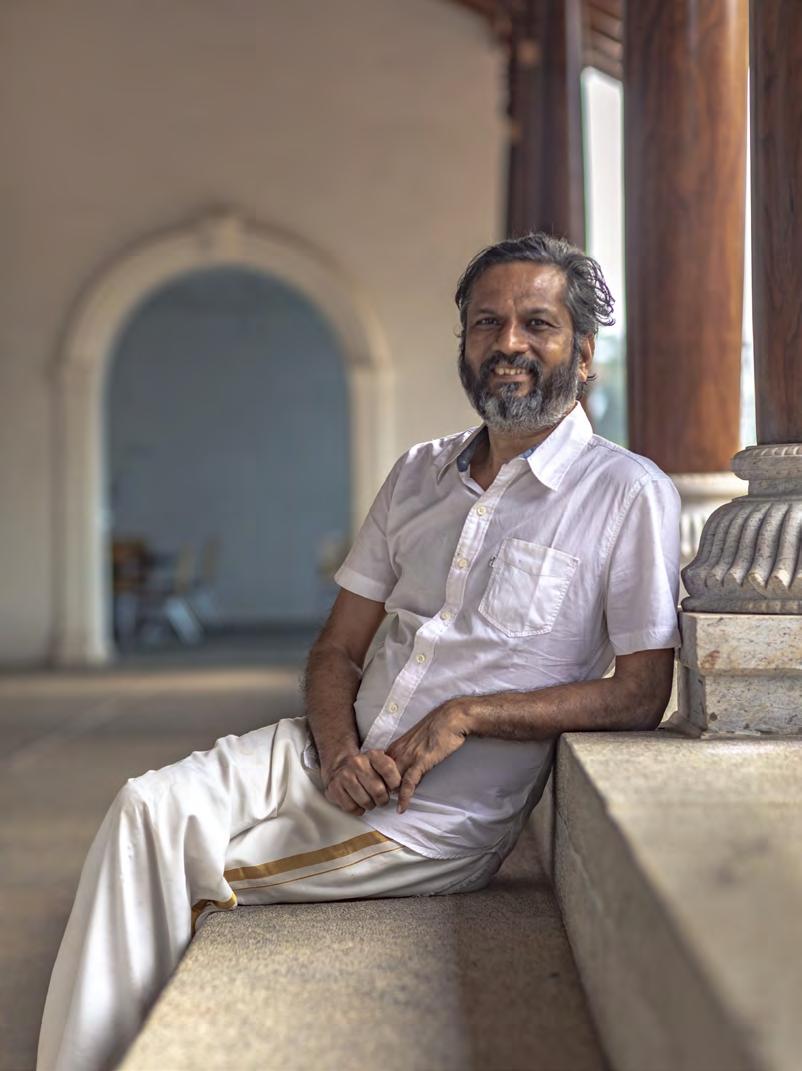
20 / ENTREPRENEUR.COM / March 2023
→ IN THE UAE, ZOHO HAS GROWN 10X OVER THE LAST FIVE YEARS. The Chennai-based global tech firm’s UAE revenues were up 45% in 2022, which made it the second-highest growing market for the company globally for the year.
has happened to me too. It’s just that we are not so high profile, so we can recover. I know the stock market melted down, but a launch-day glitch is not evidence that the technology is bad. We have to look long-term.”
It’s also another reason for him to keep his business bootstrapped, Vembu jokes. “It’s freedom really,” he says. “The operational and philosophical freedom for our rural expansion, for example.”
Japan, and even China, and so, the future of our industry, like every industry, is going to [struggle] to find talent,” he says. “There are talented local people in rural areas around the world. We just have to train [them]. Today, it’s possible for the daughter of a rural, landless worker to learn how electrical motors or JavaScript frameworks work. Zoho Schools is the future of not just our company, but technology itself.”
Zoho’s “technology-enabled” rural revival includes empowering villages to be self-reliant with deep tech know-how through its schools, and setting up multi-point distributed workplaces in remote areas across the country.
Vembu says the definition of running a profitable business means different things to different people. But Zoho’s goals and philosophy go beyond short-term, flashy gains.
“I’m talking about 10- or 20-year life cycles, so it’s a different mindset,” he adds. “But stock markets reward quarter-toquarter performance, and I really don’t care for those day-to-day swings in stock prices. I don’t want to be distracted by it. Like Steve Jobs said, to truly think different, you have to be brave. Even Jobs essentially ignored the stock market. But most CEOs cannot ignore that pressure. I want to retain my job. If I go public, I won’t retain my job.”
Future talent is a major challenge the tech world should be thinking about today, Vembu stresses– which is also why he’s so passionate about the cause.
Vembu, who graduated from the Indian Institute of Technology in Chennai before he went on to do his Ph.D. at Princeton in the United States, is fervent about recognizing the “deep despair” in India’s rural areas arising from structural economic changes caused by agricultural hardship, as well as the decline of rural craftsmen and artisans. “With 1.4 billion people, with 60% in rural areas, I am not sure there is any way forward for an India that simply accepts rural decline,” he said on Twitter earlier this year.
About 15% of Zoho’s workforce don’t have a college degreebut they are graduates of Zoho Schools, which provide free, contextual, and experiential education, training its students to successfully perform in the various domains of the company. The schools also provide software training to students looking for a full-time alternative to conventional college education in technology, design, and business, with one year of classroom training, followed by a year-long internship at Zoho.
Zoho refuses to refer to its schools as a corporate social responsibility (CSR) initiative, because it claims it benefits by gaining a talented and loyal workforce. “Increasingly, we are in a world of demographic implosion everywhere, US, Europe,
The founder, who is among the few business leaders in India to receive a Padma Shri (the country’s fourth-highest civilian award), is also focused on fixing the dichotomy between the rural and the urban. “I’m here in Dubai, which is one of the most happening cities in the world today,” he says. “It’s a beautiful city, but I also see the mirror image of the rural areas of places I live in. These two are not separate. We cannot just draw everyone from rural areas into giant cities. It won’t work for either side. Just the cost of real estate in Dubai is sky-high, which means that we have to find a balance where cities thrive and rural areas thrive. That integration is very important. These are the things that startups and the tech world aren’t thinking about.”
To bridge the gap, Vembu is simultaneously expanding across both rural India and in cities like Dubai. Zoho has committed AED100 million in investment for expansion in the UAE, which will go toward local hiring, growing its partner network, adding Arabic support to its products, and integrating with local payment gateways to adapt solutions for the local market.
Meanwhile, Vembu, the 55th richest person in India according to Forbes in 2021 with a net worth of $3.75 billion, has shifted his home to the village of Mathalamparai in the Indian state of Tamil Nadu– not only because he prefers the simple life, but also to encourage more businesses to look at villages as talent pools.
Perhaps it’s his preference for the humble life that keeps the soul of his company grounded despite its growth.
“Nothing at all changed,” he replies, when quizzed about how fame and fortune has affected him. “Fundamentally, how I live hasn’t changed from when I was an employee earning a salary. If anything, my lifestyle has simplified. I probably spend less money than I was 10 or 15 years ago. I still work with engineers. I still code. I don’t enjoy the jet-set life, truly. I am just doing what I enjoy.”
Megha Merani is an independent journalist with more than 10 years of newspaper, magazine, and web reporting experience in the United Arab Emirates, writing hard news, investigative reports, features, and opinion pieces. Her passion for storytelling coupled with a proven instinct for identifying talk-generating issues has resulted in breaking stories and insightful features that have made local, regional, and international headlines. Her work has been published across Thomson Reuters, Zawya, Bloomberg Middle East, Gulf News, former local daily 7DAYS, and government publications.

21 March 2023 / ENTREPRENEUR.COM /
WE BELIEVE DEEP INTEGRATION IS IMPORTANT TO OFFER AN INCREDIBLE USER EXPERIENCE. I WORK ON OUR BACKGROUND TECHNOLOGIES MYSELF.
For the Love of the Story BARKHA DUTT
ABY SAM THOMAS
As a journalist who hails from India, I couldn’t help but feel starstruck when I found myself face-to-face with Barkha Dutt, one of my native nation’s foremost broadcast media personalities, on the sidelines of her participation in this year’s Emirates Airline Festival of Literature in February in the UAE.

I was a teenager when I first witnessed Dutt’s prowess as she reported for Indian news media company NDTV from the frontlines of the Kargil War between India and Pakistan in 1999. And my respect and admiration for her has only grown in the years since, be it with her reportage on everything from the 26/11 terrorist attacks in Mumbai in 2008, to more recently the COVID-19 crisis that hit India in 2020. Today, Dutt is able to boast of a journalism career that
has spanned more than 20 years, and has seen her win more than 50 national and international awards, including India’s fourth highest civilian honor, the Padma Shri. All of this should be enough to understand my awe when meeting this legendary journalist in Dubai, but I had to also keep reminding myself to put my fan moment aside, because I was there, on behalf of Entrepreneur Middle East, to interview Dutt in her role as the Founder-Editor of Mojo Story, an independent digital media platform that she had launched in India in 2019. To her credit, Dutt didn’t miss a beat- as soon as we sat down to chat with each other, she leaned forward to tell me the three words a journalist would love to hear from whoever they are interviewing. “Ask me anything,” she tells me- and that’s exactly what I do in the 20 or so minutes I had with her.
22 / ENTREPRENEUR.COM / March 2023
The acclaimed Indian journalist discusses taking on an entrepreneurial persona as the Founder-Editor of Mojo Story by
B /The Big Idea IMAGES COURTESY MOJO STORY
My first question was focused on Dutt’s reasons for launching Mojo Story- after all, she had spent more than two decades at NDTV when she left the enterprise in 2017, and one couldn’t help but wonder why she’d leave all of the luxury and comfort she had there, to take on all of the entrepreneurial pains of starting something new from the ground up. “Mojo means magic, and I felt that I wanted to reclaim the magic of storytelling that I felt was diminishing in television as it was evolving in India,” Dutt replies. “Television had become very loud, very talk-oriented. When it was talk-oriented, the conversations weren’t meaningful. The emphasis was on the sound bite; the emphasis was on getting people to face off with each other. There was very little reporting, even in big newsrooms- money was not being used in sending people out. And then, frankly and finally, I felt that it was a ‘now or never’ moment for me in making the difference between being an employee and an entrepreneur, and I wanted to own my own corner of the sky. I felt that technology was moving, people were moving towards consumption on their phones, and I didn’t want to be behind the curve. So, it was either me making up my mind and saying, okay, TV, with all its flaws, is what I’m going to do for pretty much the rest of my life, or jump, take a leap into the deep unknown- [I told myself] you’ve often done that in your reporting; now, do it at the other end of it. And so was born Mojo Story.”
Dutt didn’t know it then, but she had launched Mojo Story just three months before the coronavirus pandemic hit the world at large in 2020, and the ensuing COVID-19 crisis’ effects in India would form the crux of the venture’s reportage for the next two or so years. It all started, however, with
Prime Minister Narendra Modi initiating in India what has since become known as the world’s largest lockdown in response to the first wave of the coronavirus pandemic. That’s when Dutt got into her car with three other Mojo Story personnel to report on how all of what was happening in India was affecting people on the ground in the country. And there were stories aplenty to be told- for instance, there were those of the migrant workers, who, after losing their livelihoods in the cities they worked in as a result of the lockdown, had to travel hundreds of kilometers (many by foot) back to their homes in their villages. There were also tales to be told of the beleaguered healthcare workers across the nation (many of whom lost their lives in the line of duty), or those of the gravediggers who, in their attempts to give victims of the COVID-19 virus dignity in death, had to prepare and dig graves with their own hands. All of these stories and more found an outlet in Mojo Story through its YouTube channel (@mojostory) and associated social media channels, and Dutt led the charge as she traversed across the length and breadth of the country to build these reports- note here that this was a journey of more than 30,000 kilometers, spread over the course of over 120 days, all of which was done amid the first wave of the pandemic in India.
The devastation that the COVID-19 crisis wrecked on India is now fairly well-documented, but in those early days, Dutt remembers that Mojo Story was among the few media entities on the ground reporting on the tragedy that was unfolding. Dutt herself went on to cover the coronavirus pandemic in India for the next two years (and counting), with her stories highlighting everything from the shortage of beds in the
intensive care units (ICU) of hospitals, to the difficulties in finding funeral sites for victims of the COVID-19 disease. In this period, she also found herself being personally affected by the issues she was throwing the spotlight on when her father fell victim to -and later died from- COVID-19. She recounts this heart-wrenching experience in her book, To Hell and Back: Humans of COVID, which was published by Juggernaut Books in 2022- here’s an excerpt: “As I travelled from the villages of Uttar Pradesh to the paddy fields of Kerala, from the mountains of Ladakh to the bastis of Mumbai, from the graves of the Ganga in Varanasi in which corpses floated, to documenting the pile-up of abandoned COVID bodies buried in the sandbanks of Prayagraj, one day, in April 2021, I became the news I was reporting. My father died from COVID, and in the fight to get him an ICU bed, an ambulance, an oxygen cylinder -and later, space at a crematorium- I literally became the same story I had chronicled.” }}
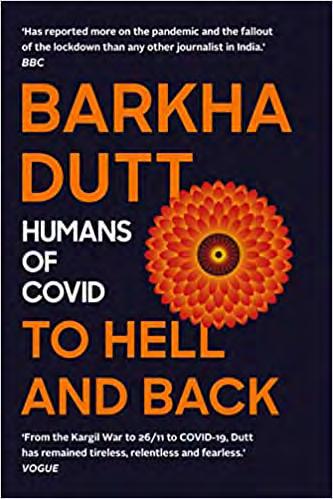
23 March 2023 / ENTREPRENEUR.COM /
→ BARKHA DUTT is one of India’s foremost broadcast journalists. After two decades with NDTV, she is now the Founder-Editor of Mojo Story, an independent digital media platform. A columnist for The Washington Post, she has received more than fifty national and international awards, including the Padma Shri.
I WOULD SAY THE BOOK IS ABOUT INDIA, THE BOOK IS PARTLY ABOUT ME, THE BOOK IS PARTLY ABOUT MEDIA, [AND] IT’S [ALSO] ABOUT THE PEOPLE I MET. IT’S ABOUT LOOKING FOR HOPE IN THE MIDST OF SOME OF OUR BLEAKEST TIMES.
B /The Big Idea
The day Dutt cremated her father was also when she found out that she had -for the first time-contracted the COVID-19 virus. Dutt remembers staying in her basement, not knowing what to do with her grief, and so, she recalls, “I worked right through it.” There’s visceral proof of this in an op-ed she published for The Washington Post only a few days after her father’s death- “I am haunted by unrelenting sorrow and doubts about what I could have done differently,” she wrote in it. Dutt goes on to tell me that To Hell and Back -her second book after This Unquiet Land: Stories from India’s Fault Lines- was also a way for her to process and deal with
this loss that she had personally incurred, as well as everything else she had borne witness to. “The book was part of acknowledging everything I had seen and felt, but postponed feeling,” she says. “The book was part of acknowledging my father and his role in bringing me and my sister up as a single father. (My mother died when I was 13; she was also a journalist.) And so, the book is not [just] about COVID. I would say the book is about India, the book is partly about me, the book is partly about media, [and] it’s [also] about the people I met. It’s about looking for hope in the midst of some of our bleakest times.”
In her book, Dutt declares the COVID-19 crisis in India to have been “the biggest news story” in her lifetime, and as if tackling that as a journalist weren’t enough, it’s worth noting that she was also then simultaneously embarking on her entrepreneurial career. Dutt readily admits that being the FounderEditor of Mojo Story hasn’t been a cakewalk. “I’m not going to lie and tell you that it’s all been rosy,” Dutt says. “That would just be an absolute lie. It’s been very difficult at times; it’s been very lonely and isolating at times. There are times when you ask yourself, ‘Why did you do this?’”
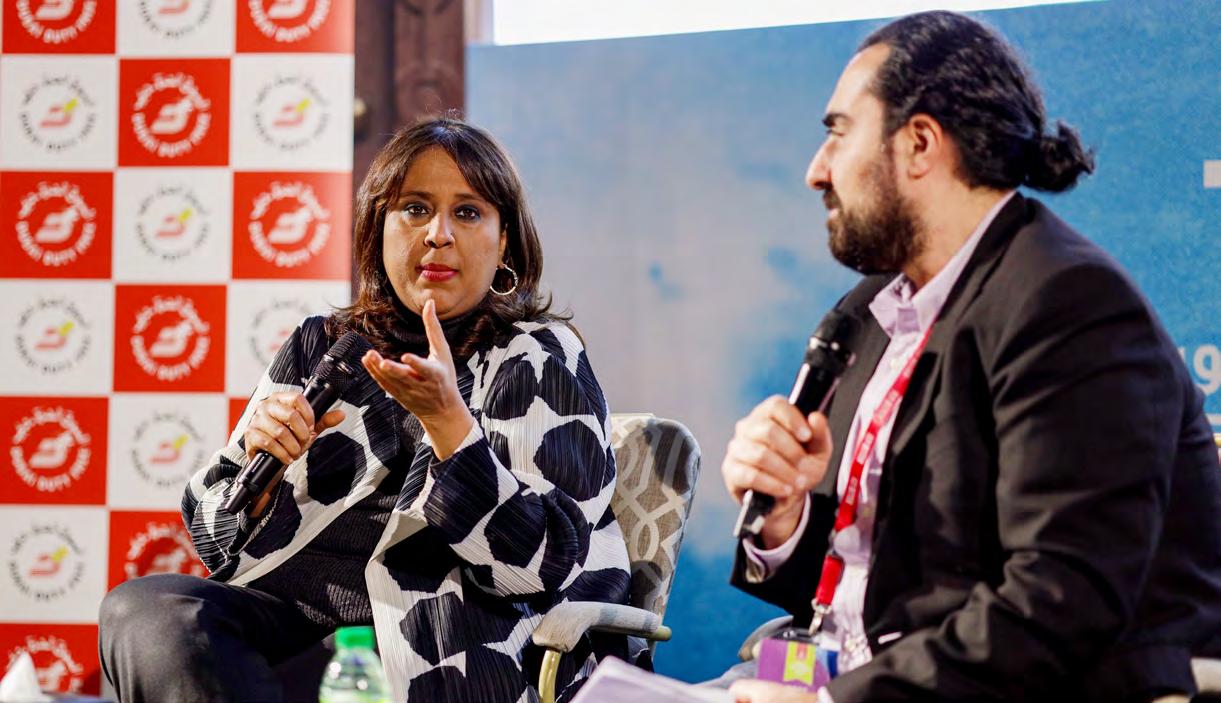
24 / ENTREPRENEUR.COM / March 2023
THE BEST KIND OF LEADERSHIP IS SHOW, DON’T TELL. AND I ALWAYS THINK THAT IF YOU CAN SHOW THAT YOU CAN DO IT, YOU’D BE A MUCH BETTER LEADER, AND A MUCH BETTER ENTREPRENEUR.
↑ BARKHA DUTT in conversation with Mustafa Alrawi, Assistant Editor in Chief at The National, at the 2023 Emirates Airline Festival of Literature.
While Dutt agrees that every entrepreneur out there must have had moments like these, the fact that she’s running a business in the media industry means that she has to tackle challenges unique to it as well. For one, the manner in which people consume (and react to) media has changed by leaps and bounds, and Dutt had to make sure these variations were taken into account when building Mojo Story’s offering. And while there was definitely a lot of learning through the process, Dutt acknowledges that there was also a fair bit of unlearning for her to do owing to her background in television journalism. “For example, I do a primetime show every evening called Bottomline with Barkha,” she explains. “For that show, on television, I would’ve needed at least a 15or 16-person crew, and, today, I do it with two people.”
When Mojo Story started out in late 2019, Dutt remembers its YouTube channel having only around 30,000 subscribers; today, that number stands at 906,000. Dutt tells me that the company has a team of 21 people now, and when it comes to the matter of funds, she explains that Mojo Story currently has a few different sources of revenue. The first is from YouTube itself- besides being a monetized channel on the platform, Dutt points out that Mojo Story is now an official YouTube Partner channel, and that allows it to competitively bid for money from the enterprise as well. “We also have foundation grants that fund public interest journalism, [plus,] we have some high-net-worth individuals who’ve decided to put money to back this kind of content,” Dutt continues. “We are also starting paid subscriptions, and while we will not paywall anything, we will have extra perks or extra features for those who do become our paid subscribers.” Mojo Story is also in the business of events- one of its offerings in this space is the very popular We The Women, which is described as “a community and space for women and their unfettered freedom,” and is in its fifth year now. “We also do production- for example, we’ve designed public service video campaigns on public health messaging, and so, we have clients in that space,” Dutt adds. “And we are hoping very much to get into the long-form production- movies, documentaries, etc. So, I think the way I’m seeing Mojo Story is not like a news channel; I’m seeing it as a content storytelling platform that will interface with different kinds of mediums and storytelling formats.”
With such aspirations in the picture, Dutt is clearly thinking big when it comes to the future of Mojo Story, and so, I ask her, if, despite the challenging road she has had, the entrepreneurial journey she has embarked on has been worth it. “I guess the honest answer would be that there have been really bad days, and then there have been really brilliant days, and
it’s been a rollercoaster ride, but it’s one that I’ve never regretted,” Dutt replies. “I’m very proud of what we’ve created. A lot of people told me, why don’t you just do a ‘Barkha.com,’ you’re the personality that’s driving this, and I was like, I might be the personality that’s driving this, but I have to build something that builds a team. I have to build a product that’s beyond me. Many people have gone the way of individual-centric YouTube channels, and I’m not doing that. We are creating new personalities, we’re creating new properties, we have a team of more than 20 people now, we are hiring a few more, and so, I think, all in all, I would say I’m proud of what we’ve done, but it hasn’t been without its terrible days.”
And powering Dutt through all of what the entrepreneurial journey throws at her is a drive to prove that she can build a venture that stands the test of time. “I think that every entrepreneur -or every employed person who wants to become an entrepreneur- would’ve been told, at some point, that they’re taking a risk,” Dutt notes. “They’d have been asked, ‘Why would you leave your safety net?’ And I think what keeps me going right now is the challenge of proving that we can make something special out of Mojo Story, and that it can prove that you can build something beyond an individual.” At this point, I ask Dutt for tips she’d give her fellow entrepreneurs, and she replies, “My advice for entrepreneurs is [to know that] nothing is too small for you to do and learn as the owner of your company. I may have 23 years of journalism experience, and I may be an award-winning journalist, but if I have to pick up my lights and set them up myself, I will. If I have to learn how to design the graphic myself, I will, and I do. If I have to learn to edit by myself, I will. Nothing is beneath you. In fact, I think the best kind of leadership is show, don’t tell. And I always think that if you can show that you can do it, you’d be a much better leader, and a much better entrepreneur.”
But given all of the success that Dutt has experienced in her journalism career so far, one might wonder what is it that gets her to do what she does today, and to that, she replies that her motivation remains the same as it was when she started working in this field. “It’s honestly the same impulse that sent me to Kargil in 1999, to report from the frontlines [of the war] between India and Pakistan,” Dutt declares. “It’s the same impulse that took me out on the streets during the COVID-19 crisis. I love reporting, and I love telling a story powerfully as much as I did 23 years ago. That passion has not dimmed one tiny bit, and if I were to bookend my life thus far, which doesn’t mean that I’m in putting my boots up, but so far, if I were to bookend my life from Kargil to COVID, it is the same person. It’s the person who can’t, in a way, remain inside a studio if there’s something enormous happening out there- I’m not saying I don’t do any studio work; of course, no one can be out there permanently. But every time there’s something cataclysmic or enormous in the life of a nation, or even in the life of the world, I feel like I can’t be sitting behind a table telling this story. I genuinely love nothing more than to be out there reporting.”
25 March 2023 / ENTREPRENEUR.COM /
THE WAY I’M SEEING MOJO STORY IS NOT LIKE A NEWS CHANNEL; I’M SEEING IT AS A CONTENT STORYTELLING PLATFORM THAT WILL INTERFACE WITH DIFFERENT KINDS OF MEDIUMS AND STORYTELLING FORMATS.
TOWARDS NEW SHORES
Samer Hamadeh’s UAE-born F&B concept Akiba Dori expands into India with a 30-location franchise deal by TAMARA PUPIC
It’s a restaurateur’s dream to take their restaurant abroad,” says Samer S. Hamadeh, founder of Akiba Dori, a Dubai-born Japanese concept restaurant that recently celebrated its fifth anniversary with a major announcement: it has signed a 30-location franchise development deal for India.
“I wouldn’t go as far as saying that franchising Akiba Dori was the idea all along, because the truth is it’s impossible to know if a brand works or not until you actually launch it, and give it a real shot,” Hamadeh adds. “That being said, it took us over a year to finally lock in this deal, and trust our master franchisee/developer in India with helping us grow the brand at such a fast pace in a market the size of India.”
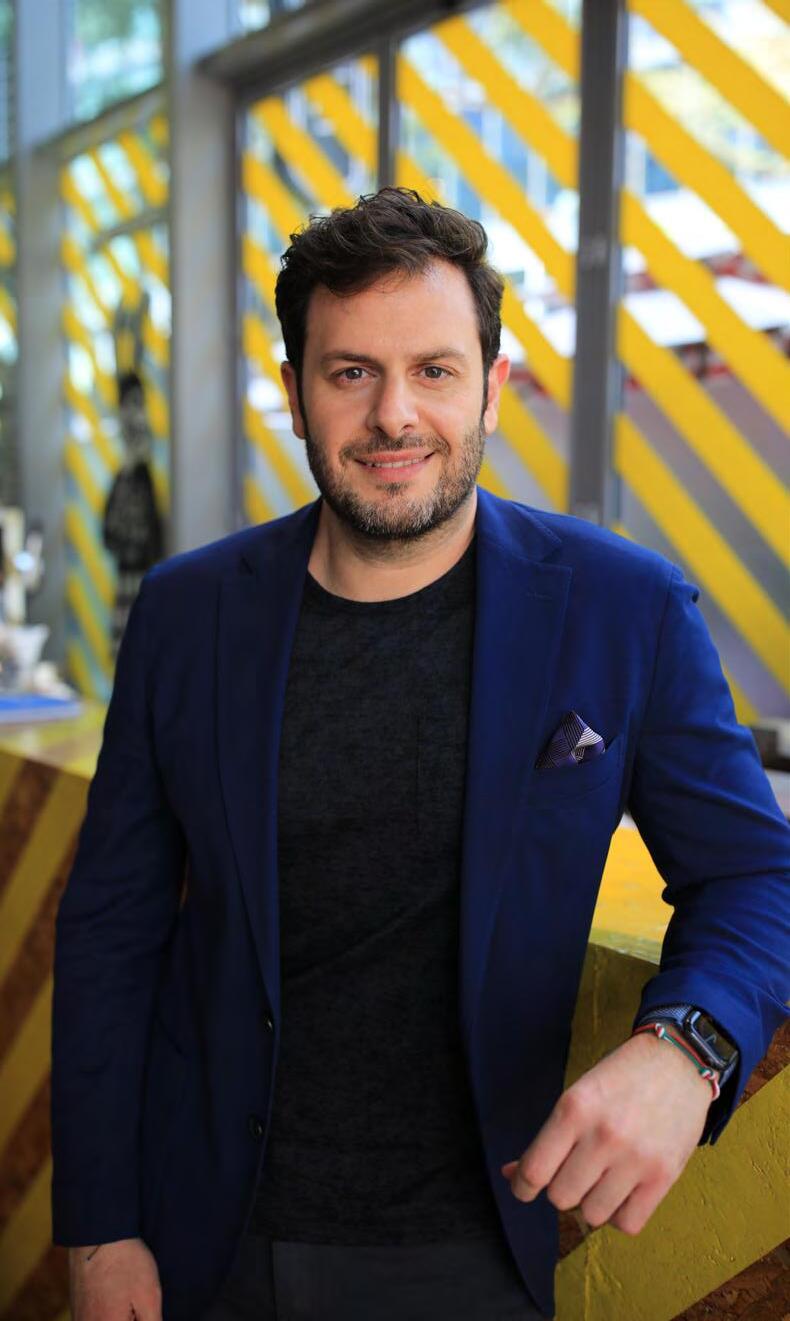
26 / ENTREPRENEUR.COM / March 2023 B /Q&A
IMAGES COURTESY AKIBA DORI
→ One of the veterans of the UAE’s F&B space (the UAE population would know him for the many concepts he has built including One on One, Republique, and Stereo Arcade), SAMER HAMADEH launched Akiba Dori in Dubai Design District in 2018.
One of the veterans of the UAE’s F&B space (the UAE population would know Hamadeh for the many concepts he has built including One on One, Republique, andStereo Arcade), Hamadeh launched Akiba Dori in Dubai Design District in 2018. His mission was to marry affordable and high-quality in one Japanese restaurant and bar- an idea that had been unseen until then.
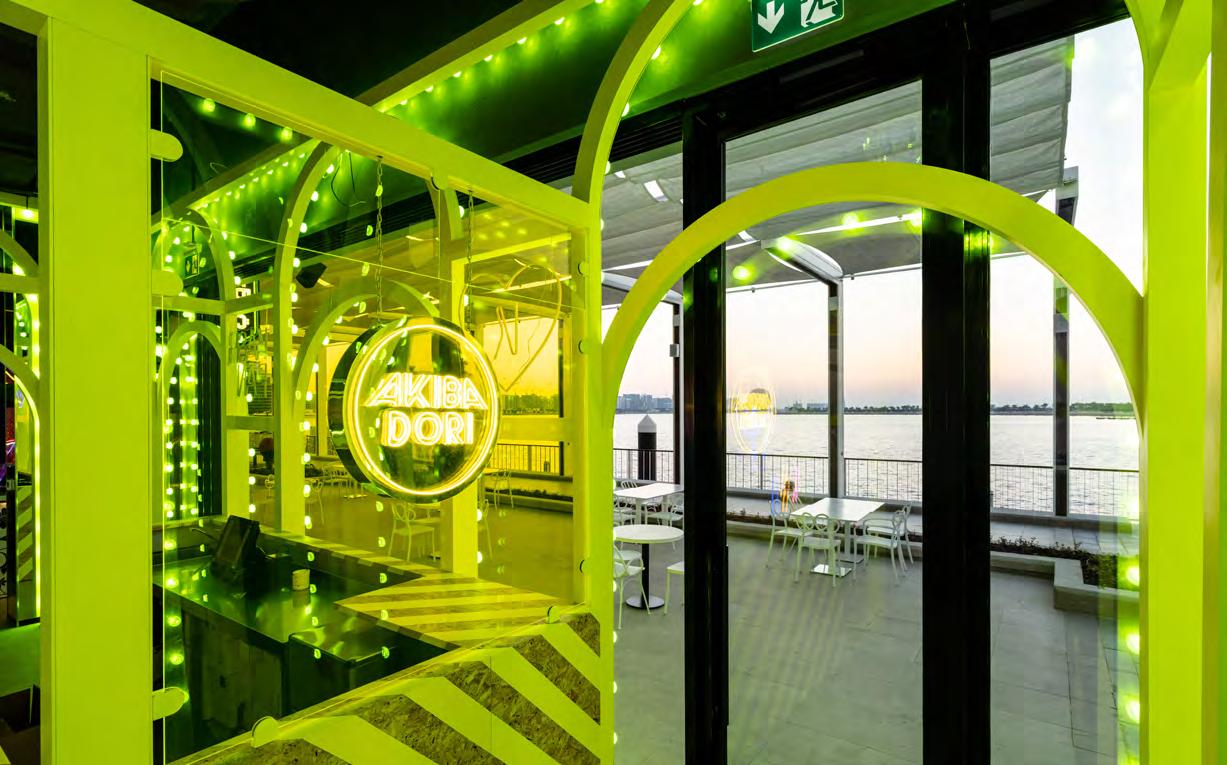
Five years on, Akiba Dori now has five locations in the UAE and KSA, and it also became a part of the “Made in Dubai” initiative developed by Dubai Department of Economy and Tourism to support and promote homegrown F&B brands in the city and beyond. Achieving all this was no easy feat, but
Hamadeh also states that he’s appreciative of the competitive nature of the UAE F&B scene.
“With one of the most popular destinations in the world, you’re going to get a lot of competition, but that’s not always a bad thing, as competition (usually) leads to innovation, and most of the innovation in the region comes from the UAE,” he says. “The public relations (PR) power of Dubai helps local brands get international exposure just by being in the city, so that is a major benefit brands get here, and I see more and more homegrown concepts taking advantage of this PR power to look across borders to new destinations.” }}

27 March 2023 / ENTREPRENEUR.COM /
→ DUBAI-BORN FAMED MODERN JAPANESE CONCEPT AKIBA DORI is celebrating its fifth anniversary with the announcement of a 30-location franchise development deal for India.
IT TOOK US OVER A YEAR TO FINALLY LOCK IN THIS DEAL, AND TRUST OUR MASTER FRANCHISEE/DEVELOPER IN INDIA WITH HELPING US GROW THE BRAND AT SUCH A FAST PACE IN A MARKET THE SIZE OF INDIA.
Right at the end of 2021, Akiba Dori opened in Jeddah in Saudi Arabia, which became the restaurant’s first international outpost. “The KSA market is becoming increasingly more competitive, as thousands of new brands make their way to one of the fastest growing countries in the region, so it will be interesting to see how the next few years play out,” Hamadeh notes. “My overall take about the KSA market is how great it is to see how many Saudi entrepreneurs have emerged strong in a market full of major international brands.”
Having interviewed dozens and dozens of successful entrepreneurs over a decade, I can clearly see patterns and invisible dots that connect them all- one is always to get straight to the point and as soon as possible. In Hamadeh’s case, it sounds like this- when asked about the target audience for his restaurant, he says, “Our target audience has always been the same, and it won’t matter where we go- people who want modern Japanese street food. It really is that simple, and it works for us.”
And when asked about what it takes to run a successful F&B business anywhere, Hamadeh is firm that the answer is a good operations team- although it can sometimes be easier said than done. “Some countries, like the UAE, make it easier to hire the right people and build your dream team,” Hamadeh explains. “Hiring staff is more complex in Saudi Arabia for now, and I’m not sure what the plans are for the future, but seeing how much effort is being put into making the market more business-friendly, I’m sure we will see some new adjustments to the labor law happening as we go along.”
The international expansion of Akiba Dori, Hamadeh continues, was on the table for a long while, but “it was either not the right time, or not the right fit”- and then, he got his eyes set on the market potential presented by India. “The Indian market is going to double in size from US$40 billion a year, to $80 billion a year in the next five years- it’s a no-brainer for any
brand to want to be there,” Hamadeh says. “I can say this deal was over a year in the making, but the team we’re dealing with in India is led by one of the most respected entrepreneurs in the franchising space, and not just in India, but globally, so it was much easier than I would have imagined it to be.”
Hamadeh’s partner in India is one of the country’s legends when it comes to the franchising space- Gaurav Marya, Chairman of Franchise India and FranGlobal. In a statement, Marya said, “We are excited to work in tandem with Akiba Dori in their India expansion journey! Certainly, such a novel and inimitable concept is sure to
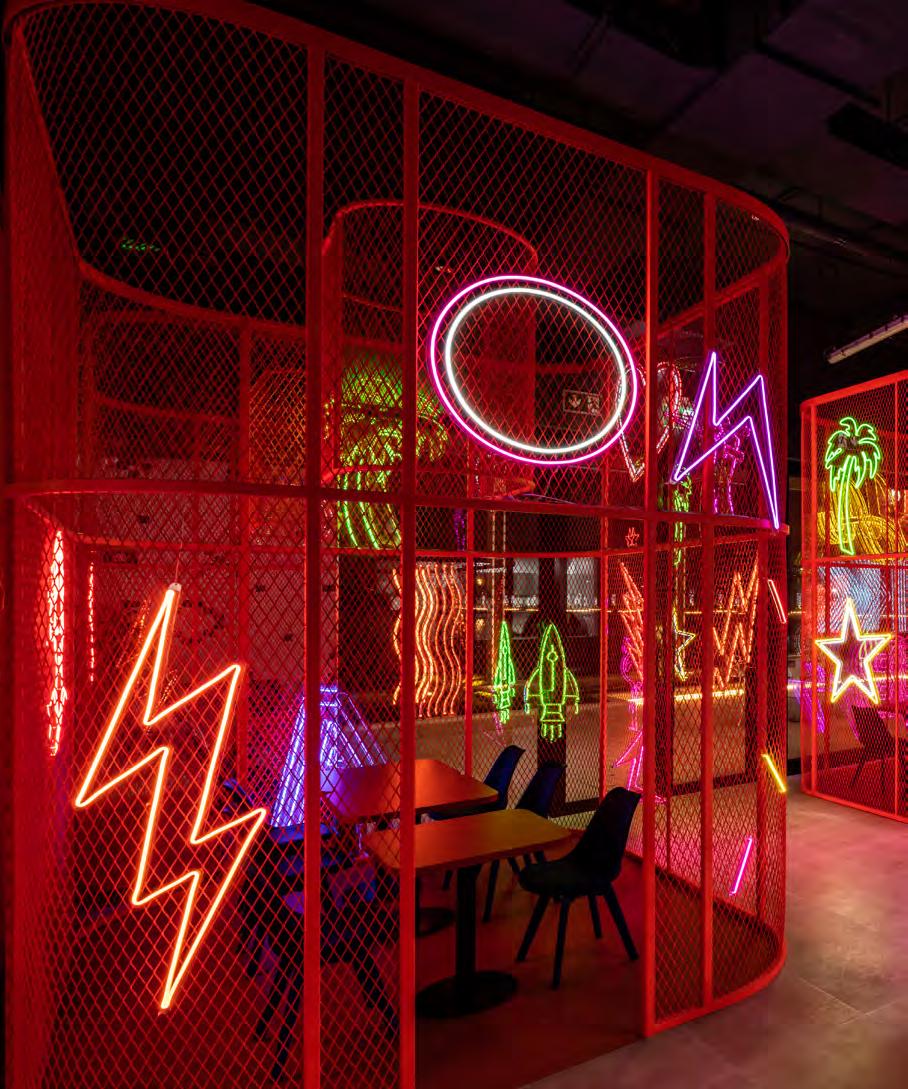
28 / ENTREPRENEUR.COM / March 2023
B /Q&A
THE SINGLE MOST IMPORTANT STEP IN GETTING READY TO FRANCHISE IS TO PROTECT YOUR INTELLECTUAL PROPERTY, SO FIND A TRADEMARK LAWYER, AND START THERE.
find success among the Indian consumers, who are always on the lookout for not just food, but great experiences as well.”
Hamadeh reveals that formulating the franchising concept has required some adjustments, as well as creating smaller versions of the restaurant to work in food halls and other smaller spaces in order to be able to accommodate different operators in different cities. That said, Hamadeh was adamant that “it should not be anything that takes away from the incredible experience of dining at Akiba Dori.”
“Keep in mind that all the pressure is usually on the franchisee, who have strict timelines to deliver, and while you can never truly guarantee how things go, you can always protect your brand by starting off on the right foot,” Hamadeh
‘TREP TALK
} THINK GLOBAL FROM THE START
"If you're planning on franchising, don't localize your content. Make it appealing to a wider audience, no matter how difficult that seems at first."

} GET A GOOD LAWYER
"Navigating agreements is like being in a maze built by Dali–even when you think you understand what's going on, you really have no clue, and interpretation is comically underestimated."
} YOUR CORE VALUES MATTER
"Going through the process for the second time around opened my eyes to a few things I didn't consider when we first franchised to Jeddah, and one of them was in terms of where I want to hold the training sessions. With Jeddah, I sent my team there; with India, we will train the head chef and General Manager in Dubai. The reason for that is I want the franchisee to really be immersed in the culture, and see how we do things here."
explains. “And that brings me to say that the single most important step in getting ready to franchise is to protect your intellectual property, so find a trademark lawyer, and start there.” The second most important step, Hamadeh says, is to develop a franchise manual. “We created ours before we franchised to KSA, and we update it regularly,” he says. “Having a world-class manual and your intellectual property (IP) registered form the base of getting ready to franchise.” And just as I think that Hamadeh will be focused only on one thing at least for some time, he surprises me by saying that he’s started a new venture, and I am (once again) reminded to never underestimate the relentless energy of an entrepreneurial mind. “Going through this process has made me an accidental expert on it,” Hamadeh reveals. “So, we’re actually offering advisory services through Big Mouth Concepts, my concept development consultancy, and we already have a few clients on board.”
29 March 2023 / ENTREPRENEUR.COM /
Akiba Dori founder Samer Hamadeh shares his tips for entrepreneurs chasing expansion for their concepts
↑ AKIBA DORI is a part of the “Made in Dubai” initiative developed by Dubai’s Department of Economy and Tourism that was created to support and promote homegrown F&B brands in the city and beyond.
NICK BAHL AND NAVDEEP SHARMA AND have envisioned ReelStar as a sustainable, decentralized, extensible blockchain, Web3-ready platform and ecosystem, designed from a smartphone-first perspective to enable and democratize participation and contribution to the media and entertainment industry, globally.
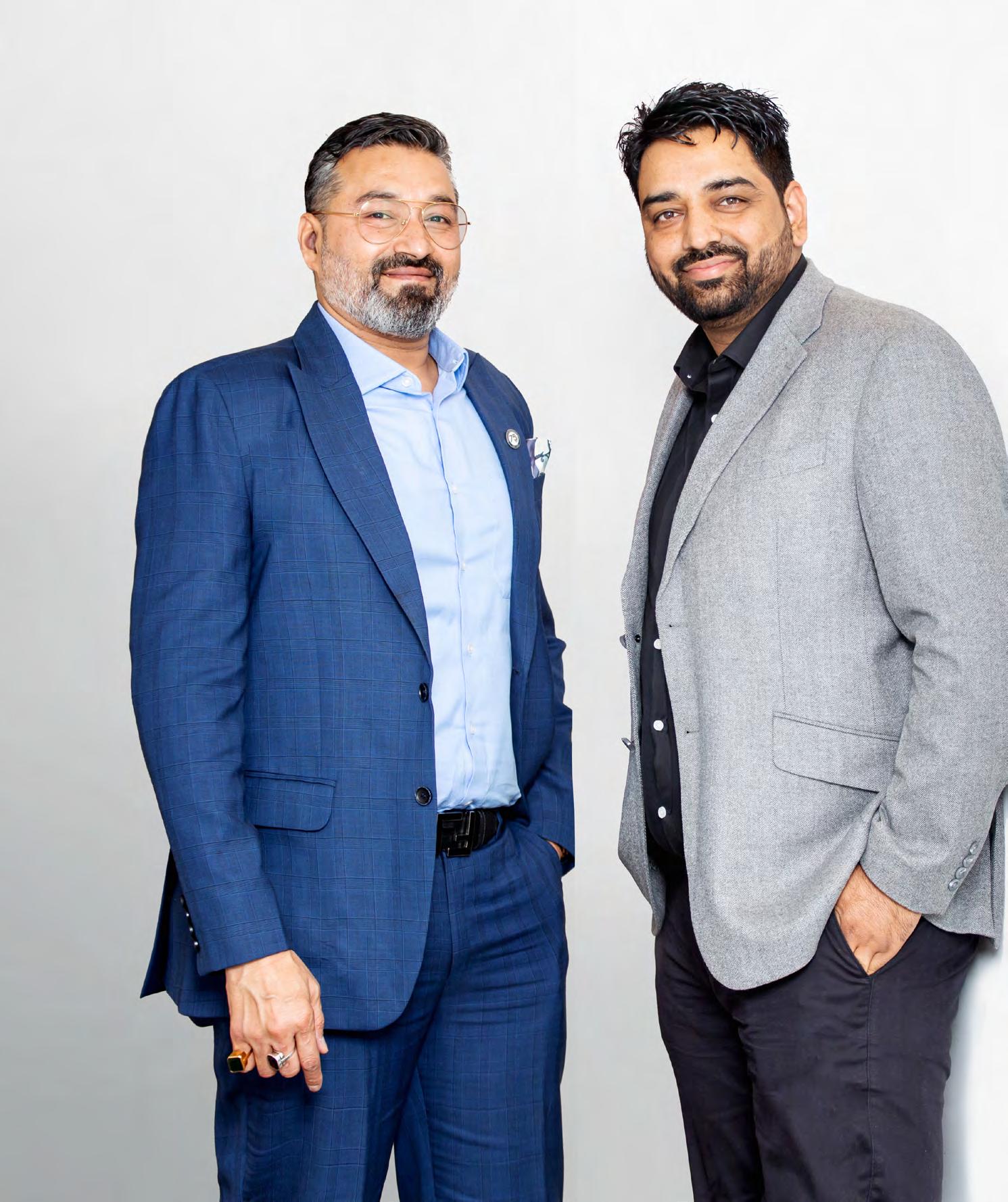
REIMAGINING AN INDUSTRY

NICK BAHL / NAVDEEP SHARMA
hen building their Web3-integrated social media platform ReelStar, co-founders Navdeep Sharma and Nick Bahl had one goal in mind- to create a blockchainbased platform for the media and entertainment industry that would empower creators operating in this particular sector. And that’s what the two entrepreneurs believe they have since created, with ReelStar being a decentralized platform that integrates multiple social media, Web3, and payment functionalities to help users to distribute and monetize their content.
“The platform uses smart contracts to ensure that content creators are paid fairly and on time, and that revenue is distributed transparently,” Bahl explains. “Users can also earn rewards for watching and sharing content, which incentivizes engagement, and helps content go viral.” Here, Sharma adds that the ReelStar solution will serve not “just the stars for their revenue-producing capacity,” but also everyone within this ecosystem. “Web3 philosophy and technology will drive a new artist and fan-centric revenue model that is democratized, and offers greater engagement and artistic development potential, as well as reduced costs for all participants,” Sharma declares. }}
31 March 2023 / ENTREPRENEUR.COM /
The co-founders of ReelStar are using the philosophy and technology of Web3 to rethink how the media and entertainment sector operates by TAMARA PUPIC | PHOTOGRAPHY FAROOQ SALIK
Described by its creators as the world’s first “everything” app, ReelStar offers its users a number of functionalities, which include live streaming, video sharing, peer-to-peer chat, audio/video calling, and more. One of its key features is ReelPay, a mobilefirst, global payment solution with seamless integration of fiat and cryptocurrencies, which has been designed to put creators more in control of their work. ReelPay was launched in Dubai in the last quarter of 2022, but Bahl recalls that the development process wasn’t an easy ride. In fact, it took them two years to get to the point where they are confident that their product has all the desired functionalities. That said, there were a couple of important lessons learnt during this development process for ReelStar, and Bahl points toward the importance of flexibility as being one of the key ones.
“While having a plan is important, unforeseen challenges and changes can occur during the development process,” Bahl notes. “Therefore, it’s essential to be able to pivot and adapt to these changes. Communication is another key learning during the process. It is important to establish clear and open communication channels to ensure that everyone is on the same page, and that any issues or concerns are addressed promptly. To put across the vision and goals effectively to the development team to ensure that the final product meets their expectations has been a key aspect.” For his part, Sharma draws attention to the need for garnering as many viewpoints as possible from one’s end consumers. “By gathering feedback from users through the beta version of ReelStar, we have gained valuable insights into the user experience,” Sharma notes. “This feedback has resulted in making changes to the app.”
As serial entrepreneurs, both Sharma and Bahl have had hands-on experience of developing several internet-based ventures, and as such, they are especially attuned to the importance of being an early adopter when it comes to the evolution of technology. Their experiences have made them hyper aware about how the Internet has changed how people consume media, but also that the industry at large is still plagued by issues like piracy, a broken revenue-sharing model, and lack of transparency. “The media and entertainment industry is a multi-billion dollar industry that has traditionally been dominated by a few big players,” Sharma says. “We both felt that the Web3 space had achieved sufficient technical maturity to support not only its application to the ReelStar venture, but that it was ripe for the kind of innovation that we envisioned bringing to the space.”
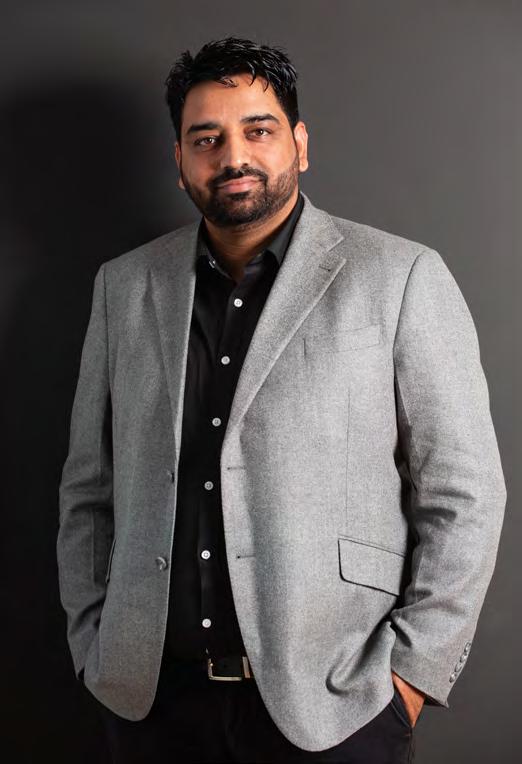
The ReelStar solution has, so far, been funded by seed capital from the co-founders, together with limited funding rounds and private and preliminary token offerings- the company raised over US$5 million from the initial token offering of its utility token, ReelToken (REELT), which is based on a multiblockchain platform, with its architecture making use of networks by Polygon and Binance Smart Chain. Looking back on how the venture has raised funds so far, Bahl says, “If we had the opportunity to do things again, we probably would have condensed the offerings into fewer funding rounds. The use case of the utility token, and the opportunity within the Web3 space, is what piques the interest of investors and potential users of the application. Everyone is keen to see how we can change the way we do things, and stand apart from the plethora of other offerings in the market. We aim to do it differently and better than other app providers, and distinguish ourselves as a market leader.”
Given how sectors centered on the blockchain have been experiencing tremendous growth and development over the past few years, the ReelStar co-founders believe that the industry has now gained mainstream attention from investors, institutions, and governments. “Many new use cases have emerged, ranging from decentralized finance to non-fungible tokens, and the industry has attracted significant investment and attention from both retail and institutional investors,” Sharma says. “However, the $2 trillion industry is also facing challenges, such as regulatory uncertainty, scalability issues,
32 / ENTREPRENEUR.COM / March 2023
“We aim to do it differently and better than other app providers, and distinguish ourselves as a market leader.”
↑ AS ONE OF THE CO-FOUNDERS OF REELSTAR, NAVDEEP SHARMA brings years of experience across multiple areas of information technology (IT) to the group. An information technology hardware professional who became an entrepreneur, he has created and grown businesses in both the IT and media and entertainment sectors.
and environmental concerns.” In the UAE, he says, there has also been a growing interest in this sector, with the government launching various initiatives that helped the UAE become a hub for crypto and blockchain startups. “However, the regulatory framework for the industry in the UAE is still evolving, and there is a need for clarity and guidance from the authorities,” Sharma adds.
Bahl shares the opinion that the blockchain sector will continue to grow and mature with new use cases emerging; however, he expects this to be coupled with the increased regulatory scrutiny and oversight. “Governments and regulators will seek to balance innovation with investor protection and market stability,” he says. “The environmental impact of cryptocurrencies will also be a key focus, and we may see more sustainable approaches to mining and energy consumption also emerge. Overall, I believe that the crypto/Web3 sector has the potential to revolutionize many industries, and that it will continue to be an exciting and dynamic space to watch, and since the UAE leads the world in average mobile download data usage, that is a key indicator that there is already significant adoption and potential within and for the UAE.”
According to Sharma, crypto and Web3 entrepreneurs like himself choose the UAE as a base for their businesses because of its proactive and innovationfocused government, supportive regulatory environment, and strategic location. That said, he advises his peers entering this market to be mindful of local regulations as well as cultural differences. “One of the main considerations for crypto and Web3 entrepreneurs expanding their businesses in the UAE is to ensure compliance with local regulations and laws,” he says.
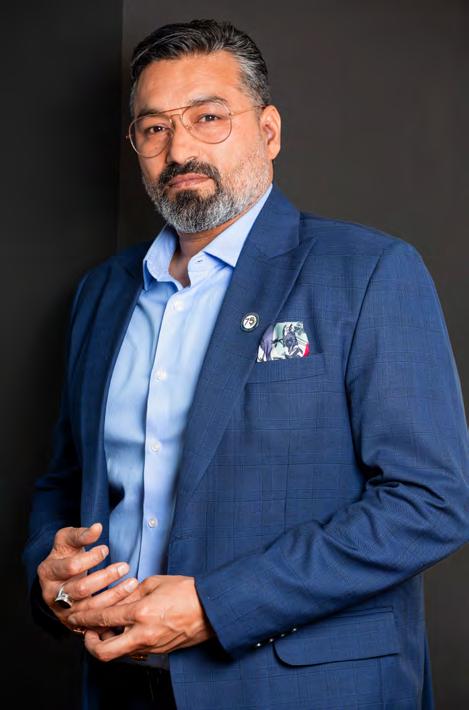
“While the UAE is a welcoming destination for businesses, it also has strict regulations that must be adhered to. Entrepreneurs need to understand the local regulations, and seek guidance from legal experts to ensure compliance. Another consideration is the cultural differences and business practices. The UAE has a unique culture and way of doing business, and entrepreneurs need to understand and respect these differences to build successful relationships with local partners and customers.”
Since one of the key goals for ReelStar in 2023 is to expand its presence especially in the MENA, the co-founders say that they are going to be training their focus on building strategic partnerships with key players in the media and entertainment industry in the region. “We plan to further develop our platform and ecosystem, with a focus on increasing user adoption and engagement, as well as to expand our range of services and offerings to cater to the diverse needs of our users and clients,” Sharma adds. }}


33 March 2023 / ENTREPRENEUR.COM /
→ THE REELSTAR APP IS A PORTAL to a new world of endless possibility, made possible by Web3 technologies, decentralization, and the ubiquity, affordability, and power of smartphones.
↑ NICK BAHL brings the acumen of a business baron with multiple companies ranging from media and entertainment to property development. He founded Sizzlen Productions 13 years ago, and grew it into an award-winning media and entertainment company specializing in arranging live concerts, film productions, and film distribution in Australia.
“Furthermore, we will continue to focus on delivering a seamless and user-friendly experience for our customers, with an emphasis on security and privacy. We also plan to contribute to the growth and development of the Web3 ecosystem by collaborating with other projects and sharing our knowledge and expertise.”
Our conversation now turns to a talent gap in the blockchain sector, and Sharma and Bahl use it as another opportunity to make a call for more education about -and in- the industry. “There is a need for skilled professionals who can design, develop, and implement decentralized applications and systems,” Bahl explains. “My advice for Web3 founders looking to address this talent gap would be to invest in education and training programs to develop the skills of current employees, and attract new talent. This could include partnering with universities and online learning platforms to offer courses and certification programs in blockchain and decentralized technology. Founders can also consider establishing mentorship programs or internships to provide practical experience to aspiring professionals.”
Sharma adds that another route to
achieving the same goal could be leveraging decentralized hiring platforms, and collaborating with other Web3 companies to share talent resources, and pool their expertise. “It’s important to create a culture that fosters innovation and continuous learning to attract and retain the best talent in the industry,” he concludes.
“Overall, the talent gap in the Web3 sector is an opportunity for innovative and forward-thinking founders to invest in human capital and develop a competitive advantage. By nurturing a skilled and diverse workforce, Web3 companies can unlock the full potential of decentralized technology and drive the growth of the industry.”
ReelStar co-founders Navdeep Sharma and Nick Bahl share their tips for entrepreneurs in the Web3 space
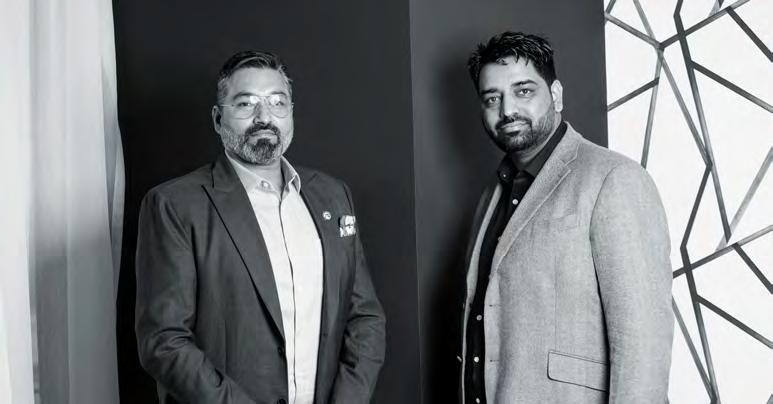
} STAY LASER-FOCUSED ON YOUR
MISSION “With so many exciting developments happening in the crypto/Web3 space, it can be easy to get distracted by new opportunities and ideas. However, it's crucial to stay focused on your company's mission and long-term goals. This will help you avoid shiny object syndrome, and ensure that you're building a sustainable business that delivers real value to your users.”

} BUILD A STRONG COMMUNITY “Crypto/Web3 is all about community, and building a strong community around your project can be a key driver of success. Focus on creating a product that people love, and then work to foster a sense of belonging and ownership among your users. This will help you build a loyal following, and create a virtuous cycle of growth.”
} EMBRACE EXPERIMENTATION “The crypto/Web3 space is still in its early days, and there's a lot of experimentation happening. Don't be afraid to try new things, and take risks. Be willing to iterate quickly, and adapt to changing market conditions. The ability to experiment and pivot is a key advantage of being a startup, and that can help you stay ahead of the competition.”
34 / ENTREPRENEUR.COM / March 2023
‘TREP TALK
“The talent gap in the Web3 sector is an opportunity for innovative and forward-thinking founders to invest in human capital and develop a competitive advantage.”



V got it all
• V Hotel Dubai’s party suite promises to be the ultimate des-res
• The grand Amazing Room as the perfect event venue with illumining walls
• A hotel that blurs the lines between work and play


• Retro-futuristic, picture-perfect guest rooms for friends to party under one roof
• Located in the heart of Dubai and by the banks of Dubai Water Canal
T: +971 4 436 6666 thevhoteldubai.com

 V Hotel Dubai, Curio Collection by Hilton Al Habtoor City, Sheikh Zayed Road, Dubai, UAE
V Hotel Dubai, Curio Collection by Hilton is fully eligible for Hilton Honors rewards programme
V Hotel Dubai, Curio Collection by Hilton Al Habtoor City, Sheikh Zayed Road, Dubai, UAE
V Hotel Dubai, Curio Collection by Hilton is fully eligible for Hilton Honors rewards programme
BUILDING A LEGACY
by TAMARA PUPIC
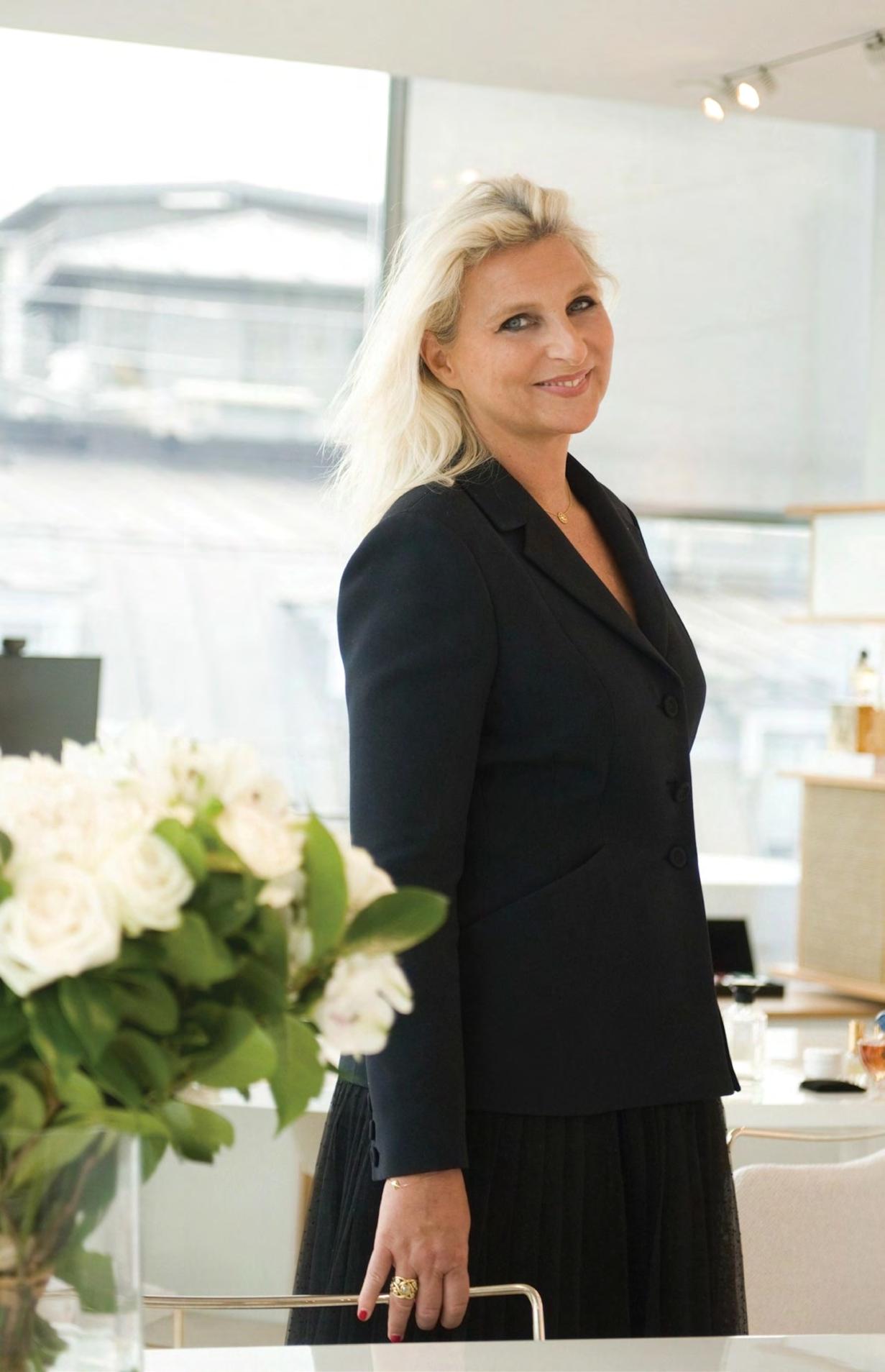 Véronique Courtois, the CEO of French beauty brand Guerlain, feels a sense of responsibility for her future female successors
Véronique Courtois, the CEO of French beauty brand Guerlain, feels a sense of responsibility for her future female successors
IMAGES COURTESY GUERLAIN 38 / ENTREPRENEUR.COM / March 2023
When Véronique Courtois, CEO of French beauty brand Guerlain, says that her career has been an incredible journey, she certainly means it. Her career in the beauty industry started at Beauté Prestige International, Shiseido’s fragrance arm, and in 2000, she joined LVMH for her first stint at Guerlain, which lasted for a decade and ended with her becoming its Marketing Director. She then spent a decade at Christian Dior, namely Christian Dior Couture and Parfums Christian Dior, only to return to Guerlain in 2019 as its CEO. “You have to find your place, create it even,” she says, in response to a question about advice on rising through the corporate ranks. “As a woman in a man’s world, it is important to remember to make a point of being a woman. That is how you find your path and make the difference. That is how you change the deal, and I feel that I have a strong responsibility and challenge to pave the way for future female leaders. I cannot fail, and this is probably my biggest personal challenge.”
And as if shouldering that responsibility was not enough, Courtois’ tenure as the CEO of Guerlain is also focused on one more legacy-building task, which is to support the brand’s sustainability initiatives. Speaking about her priorities at the helm of Guerlain, Courtois says, “The focus is on sustainability, without question. Second to that, it is on technology, and I would add that a third and fundamental one is taking care of people. It is absolutely key. It is actually the bond between all other areas of focus. It is of strategic necessity. Without your teams, we will not succeed. And Guerlain is a family, I keep that in mind, always.”
Since 1828, Guerlain has become a synonym for French excellence in fragrance, skincare, and makeup, and 14 years ago, it announced its four new goals- to preserve biodiversity by sustainably sourcing its ingredients, to innovate sustainably by creating more natural formulas in more sustainable packaging, to act for the climate by becoming carbon neutral by 2030, and to create a positive social impact through its “Women for Bees” entrepreneurial beekeeping program built in partnership with the United Nations Educational, Scientific, and Cultural Organization (UNESCO). “Within Guerlain, we are on a never-ending mission to
continuously evolve and innovate in the pursuit of beauty in the name of biodiversity, climate, ecoinnovation, and social impact,” Courtois says. “Nature is both the inspiration behind Guerlain’s creations and its tool, offering its most marvelous materials for the house to elevate as beauty. As a company, we understand that we borrow from nature, that no resource is without end, and that we must be conscious of how our products interact with and rely on the fruits of our environment.”
Her results, Courtuois believes, will be the outcome of a marriage of the old and the new. “Guerlain has three credos -craftsmanship/ expertise, elevation as art, and sustainability- but Guerlain has also always made it its mission to remain contemporary, if not ahead of its times, at any given period! Guerlain is not only a heritage brand, but it has a legacy of firsts. My mission is to honor this, and convey it to the world. So, I would say that my personal goal is heritage, yes, absolutely, but always reinvented in the light of the present times, always looking towards the future to innovate, and create desire!”
Leading a brand that has been around for two centuries is certainly not without challenges, and Courtuois believes that her strength for overcoming difficult period comes from the ethos of resilience and ambition for excellence that are part of Guerlain’s DNA. “Overcoming the COVID-19 pandemic while still carrying out transformation at Guerlain was incredibly challenging,” she recalls. “We first had to think about the urgency of
39 March 2023 / ENTREPRENEUR.COM / IMAGE COURTESY VURSE
the present moment, and the Guerlain people. It was about keeping cohesiveness among teams, giving them the courage to overcome difficulties together, and keep fighting, despite a very dull
and anxious context. And also, it was key to contribute to the global effort, just like we did by producing hydro-alcoholic gel for hospitals. Yet, this had to be addressed in parallel of
laying the grounds for the future.” At the same time, together with her team, Courtuois also made use of the period to write a new and contemporary brand identity for the brand. “From a brand and business side, it was all about writing a new strong and contemporary brand identity: reinventing it, rethinking it, by diving into the archives and the past, and bringing it to the light of day,” Courtuois explains. “The relaunch of our High Perfumery L’Art & La Matière collection is perfectly emblematic of this approach that I cherish. All in all, and like for most of us, this period taught me the importance of being resilient, the value of courage, and the necessity to look at life with optimism.”
Courtois has also been learning from her superiors through the course of her career. For instance, from Bernard Arnault, Chairman and CEO of LVMH, she learnt to value excellence and to build unique and ultimately desirable brands. But most of all, Courtuois says, she was influenced by Chantal Roos, former president at Beauté Prestige International, with whom she worked at the beginning her career. “As a figure in the fragrance industry, with the incredible track record that she can boast, she taught me early on that being a female leader was possible,” Courtuois says. “Looking back, I am not certain I would have believed in myself as much as I did, if I had not had an inspiring female mentor like her.”
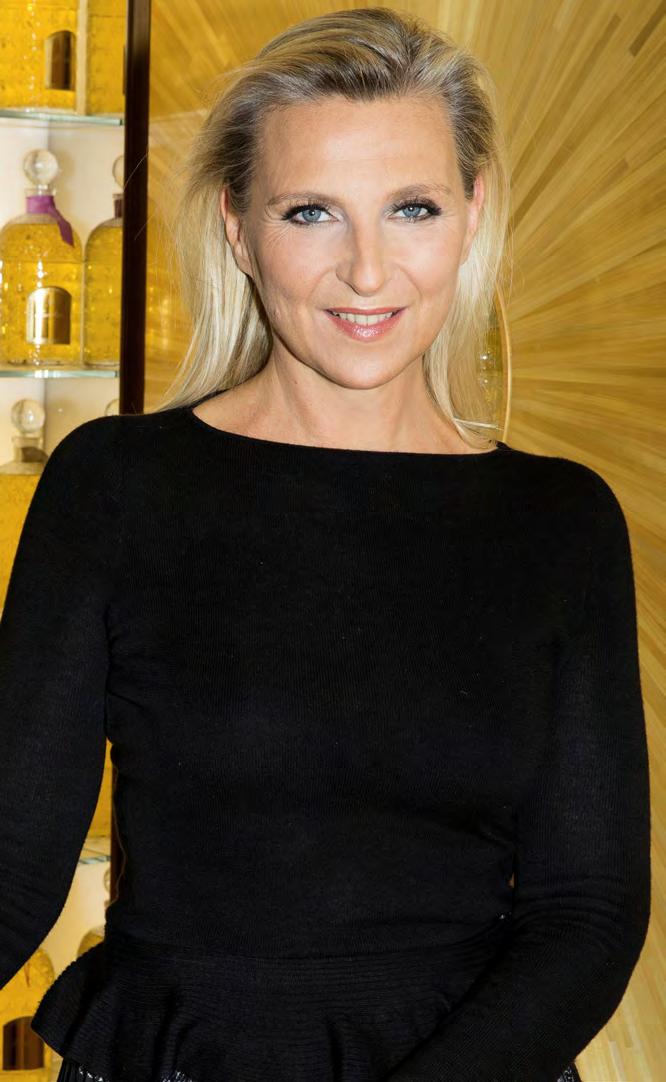
Going forward, Courtuois aims to follow Roos’ lead in being that kind of positive influence on her younger
colleagues. “I have always believed in the power of the collective, and that can only exist and thrive with diversity,” she says. “This is my motto, and I do everything I can to abide by it. I also make it a personal and constant endeavor to motivate my teams in every way. To inspire them to raise the bar always higher, reaching for the stars to achieve nothing less than absolute excellence. This is my nature. So, I would say that it is all about giving energy and passion to people. It is both the most difficult, as it requires constant involvement, but it is by far also the most exciting. To give them that spark that will ignite teams, the courage to dare and conquer, and achieve collective success.”
THE EXECUTIVE SUMMARY
Tips for business leaders from Guerlain CEO Véronique Courtois
} TAKE YOURSELF OUT OF YOUR COMFORT ZONE
“It pushes you to learn more and advance further, dare to be bold, and take chances, and always be curious. This is the only way to be innovative.”
} EXCELLENCE IS A NEVER-ENDING QUEST
“It comes with a blend of passion and hard work. But this is how you create beauty.”
} BEING HUMAN IS WHAT MAKES YOU A LEADER
“It will create the engagement within your teams to move mountains, because you can never succeed alone.”
40 / ENTREPRENEUR.COM / March 2023
“THIS PERIOD TAUGHT ME THE IMPORTANCE OF BEING RESILIENT, THE VALUE OF COURAGE, AND THE NECESSITY TO LOOK AT LIFE WITH OPTIMISM.”










A Life Well Lived
SUDHA MURTY
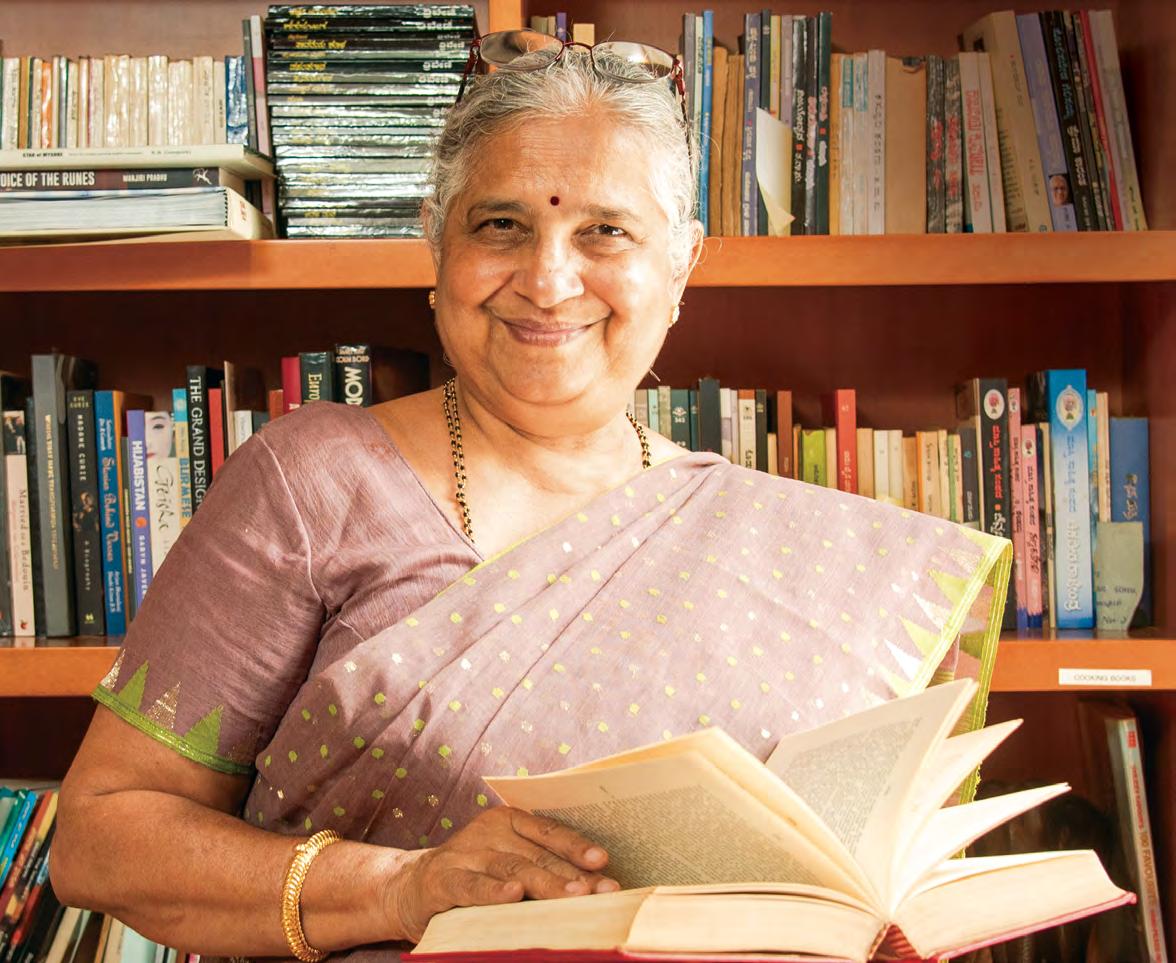
When one meets Sudha Murty (née Kulkarni), one may be inclined to look at her as a kindly Indian grandmother, and while she is indeed that, one would be very mistaken to construe the 72-year-old as being only that- she is also a path-breaking engineer, an acclaimed educator, a celebrated author, a renowned philanthropist, and, yes, an entrepreneur too. She also happens to be the wife of Narayana Murthy (the difference in their surnames is because Murty believes her spelling of the name is right), who is the co-founder of the Indian information technology multinational, Infosys, which, in its 41st year of operations, is a US$17.94 billion
enterprise, with a market capitalization of about $75.39 billion. Besides being the founder and Chairperson of its philanthropic arm, Infosys Foundation, Murty was also one of Infosys’ early employees- and she was one of its earliest investors as well. In fact, the company owes a lot to her for getting itself off the ground- but I think I am getting ahead of myself here. As an homage to Murty’s storytelling prowess (indeed, I got to meet her because she was a guest of the 2023 Emirates Airline Festival of Literature that happened in the UAE in February), I believe that I need to start telling her tale from the beginning- and that starts in her hometown of Hubli in the Indian state of Karnataka.
44 / ENTREPRENEUR.COM / March 2023
Insights and inspiration from the founder and Chairperson of Infosys Foundation by ABY SAM THOMAS
IMAGE COURTESY INFOSYS FOUNDATION
← SUDHA MURTY is an Indian educator, author and philanthropist, and the co-founder of the Infosys Foundation. She was awarded the Padma Shri, the fourth highest civilian award in India, for social work by the Government of India in 2006.
Born in 1950 to a middle-class family, Murty remembers that once she finished her schooling, she was expected to follow the path of most other Indian women in that era, which was to get a basic higher education degree, and then, well, get married. Most of her peers were seeking liberal arts degrees, and there was a fair bit of interest in the field of medicine as well, but the sector Murty wanted to pursue an education in was one that had scant interest from women at the time: engineering. And when Murty announced her intentions to the world, she recollects the general reaction to have been as through she had dropped a bomb- that’s how unusual it was for a girl in her family (and the wider community) to pursue an engineering degree. “My father was a doctor, and he asked me why I wanted to study engineering,” Murty recalls. “I told him that I always believed that humankind progresses with the applied science. Applied science can change our lifelook at computers now, or automobiles then. [I told him] these innovations are nothing but an application of science, and that’s what I want to doand to do that, I need to study engineering.”
Her family acquiesced to Murty’s ambitions in the end- but she had more hurdles to get past to realize them. The educational institution that Murty was aiming to attend -the B.V.B. College of Engineering in Hubli- had no female students on its roster then, and it too tried to dissuade her from joining its classes, with worries galore about, say, how the male students would respond or react to her being their classmate, or, well, a more practical issue in that there was not a single toilet for women in its premises. “But even with all of this opposition, I still wanted to study engineering there,” Murty says. “And so, they put three conditions on me if I
were to join the college: I should wear a sari, I should not go to the canteen where a lot of boys come, and I should not talk to boys. I agreed to all three.” And thus began Murty’s four-year stint studying engineering, and she readily admits that she found college life very hard at the beginningalthough that had nothing to do with the curriculum. “The boys would not talk [to me], nobody would share their notes [with me],” Murty recalls. “And there was no toilet… But I trained myself in such a way that I’d not have to use the toilet during college hours.”
Murty has a matter-of-fact tone while telling me all of this, and she adds that today, she looks back on all of it as having been a pivotal learning moment for her. “All those experiences really ended up helping me in the long run,” Murty says. “When you look at difficulties, yes, they are hard, but they also teach many things. For instance, in my case, I realized the importance of toilets- and in my later life, I built more than 14,000 ladies’ toilets in rural areas in India through my work at Infosys Foundation.” Plus, Murty points out, she was very good in her studies- and she found herself getting the first rank continually in the exams at her college. “That’s when I realized it was so easy,” she recalls. “Who says engineering is a man’s domain? Knowledge is no gender’s domain; it’s a seeker’s domain… Also, I became so independent, and dependent on no one else except me. So, I became autonomous in myself, in the sense if I have any difficulties, I know that I have to sort it. I learnt that if I face an issue, there’s not somebody else who will come and help; it has to be all me. That gave me a lot of confidence in life, and that has remained with me since.”
Murty ended up getting her engineering degree with flying colors (she was actually awarded a gold medal for her academic performance), and she then secured a scholarship for a master’s degree at Bangalore’s Indian Institute of Science, colloquially known as the Tata Institute, given that it was set up with the active support of Jamsetji Tata, the founder of what is today one of India’s biggest conglomerates, the Tata Group. When she was about to complete her education there in 1974, Murty was eyeing a Ph. D. degree from outside of India to add to her educational laurels- but that was when a recruitment advertisement on the Institute’s notice board caught her attention. Murty remembers it as seeking engineers to join one of the Tata Group’s companies called Telco (now called Tata Motors); however, a line towards the end of the ad stood out to her. “It said that lady students need not apply,” Murty says. “As I’ve said, I’ve always believed that knowledge is no particular gender’s domain, and I felt the same way about jobs… So, I was like, how can you say that women cannot apply? That’s unfair, I thought. You interview her, and if she is not capable, then you can always say no. But you can’t make use of a difference in gender to deny someone a chance at a job or opportunity.”
The discrimination was too much for Murty to take this time around, and it irked her more given that it was being done on the banner of the Tata Group, which was (and remains) one of India’s most respected business enterprises. Murty decided that a complaint needed to be made to the upper echelons of the Tata Group- however, she didn’t know who exactly in the company should she address it to. But in what was perhaps an indication of the daring of youth, Murty chose to direct her grievances to the man at the helm of the Tata Group then, Jehangir Ratanji Dadabhoy Tata (more popularly known as JRD), a bona fide legend in India’s business landscape. And Murty did so by penning a strongly worded note on a postcard, and sending it to what she thought was JRD’s address in Mumbai, and then forgetting about it. As it turns out, }}
45 March 2023 / ENTREPRENEUR.COM /
FAILURE IS OKAY- I TRIED, I FAILED, WHAT WOULD I LOSE? THERE WAS NOTHING REALLY FOR US TO LOSE- FOR TWO, OR THREE YEARS, WE COULD TRY, AND IF IT DIDN’T WORK, WE’D COME BACK TO WHAT WE WERE.
Murty had got JRD’s address wrong- but the man was so well-known that the Indian postal system got her postcard to him anyway. And when it did, Murty’s words were enough for JRD to demand the concerned teams at Telco to remove such gender-centric barriers to its job offerings- and this plucky young woman from Hubli found herself getting called for an interview in less than 10 days after she sent that postcard. Murty aced that interview (of course), and she ended up becoming the first female engineer to be hired at Telco, with her going to have a fruitful career at the Tata Group for many years.
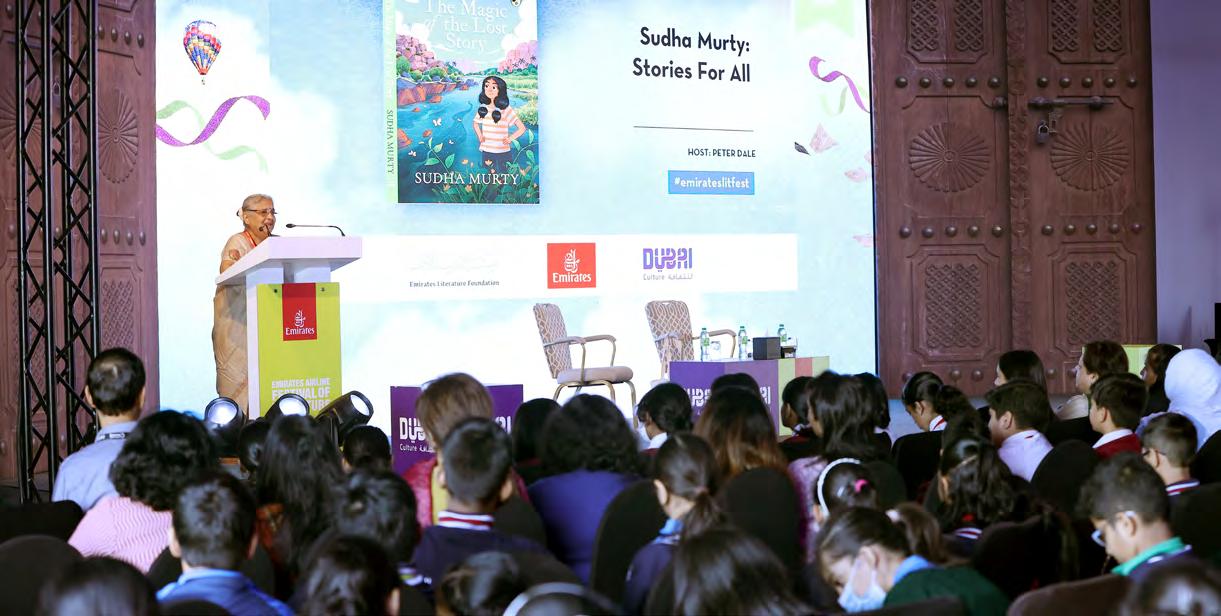
When I ask Murty if she ever got to meet JRD and discuss the aforementioned episode with him, she confirms that she got to meet the titan of Indian industry quite a few times during her years at the company; however, their conversations never touched upon the matter of her postcard until, funnily enough, she was getting ready to exit her employment at the Tata Group in 1982. By then, Murty had gotten married, and she had had her first child, Akshata Murty, too (yes, she made sure her children got the right spelling of their surname!), and she was working out of Telco’s Mumbai offices at the time. Her resignation was prompted by the fact that her husband was, at the time, setting up an entrepreneurial venture called Infosys in a neighboring city called Pune, and she was going to join
him there. And on the day Murty wrapped up her final settlement at the Telco office in Mumbai, she ended up running into JRD while there. “He was coming down the stairs, I was going up,” Murty says. “He used to call me by my maiden name, and he said, ‘Kulkarni, what are you up to?’ I replied, ‘Sir, my husband is starting an adventure called Infosys, I don’t know whether it will be successful or not, so I have to leave my job, and I have to go to Pune, because they’re starting in Pune.’ And he said, ‘You fought your way in, and now you’re leaving?’ That was the first time he indicated to me that he actually knew how I had made it into his company.”
Murty has a beautiful, broad smile as she shares this memory with me, and she goes on to tell me that this chance encounter with JRD had a lasting impact on her life. “In reply to his question, I said, ‘Sir, I have to help him out. Otherwise, I would not have left,’” Murty recalls. “He said, ‘Okay. But, Kulkarni, why start with diffidence? Start with confidence.’ He was then going to leave, but then he turned back, and said, ‘Kulkarni, what will you do when you are successful, when you make a lot of money?’ I replied, ‘Sir, I don’t know if we will make money.’ And he said, ‘When you make money, please remember that our society is giving you so much, and so, you have a duty to our society. You don’t
46 / ENTREPRENEUR.COM / March 2023
↑ SUDHA MURTY addressing children at the Emirates Airline Festival of Literature in Dubai
I BECAME AUTONOMOUS IN MYSELF, IN THE SENSE IF I HAVE ANY DIFFICULTIES, I KNOW THAT I HAVE TO SORT IT. I LEARNT THAT IF I FACE AN ISSUE, THERE’S NOT SOMEBODY ELSE WHO WILL COME AND HELP; IT HAS TO BE ALL ME.
WHO SAYS ENGINEERING IS A MAN’S DOMAIN? KNOWLEDGE IS NO GENDER’S DOMAIN; IT’S A SEEKER’S DOMAIN…
SUDHA
own that money; you are just a trustee of that money, and you are to give it back to people.’” Murty remembers this as being the last time she saw JRD alive, and his words to her then have never left her. Indeed, JRD’s advice to her formed the basis of what she ended up launching and building several years later with the Infosys Foundation, and those principles continue to drive her philanthropic work to this very day. Now, the Infosys story is the stuff of legend- its journey from being a fledgling software startup to becoming a global leader in next-generation digital services and consulting is something any tech entrepreneur out there would want to follow for their own enterprise. As the co-founder and first CEO of Infosys, Murthy’s role in its roaring success is widely celebrated, and rightfully so- but one should also highlight his wife’s contribution to it. And no, I’m not talking about her role just as Murthy’s spouse- as it so happens, Murty was also Infosys’ first investor. That’s right- the INR10,000 (equivalent to $250 at the time), which is famously known to be the capital with which Infosys was set up with in 1981, came from Murty. You see, Murty
was in the habit of saving money for “emergencies” back then, and that’s the “fund” her husband requested her to make use of to invest in the company he was launching. “I remember thinking, what if I don’t give the money to him?” Murty tells me. “Then, he may not start it, and he may go on to regret it. I thought regret is worse than failure. Failure is okay- I tried, I failed, what would I lose? There was nothing really for us to lose- for two, or three years, we could try, and if it didn’t work, we’d come back to what we were. But I never wanted my husband to regret… I had ₹10,250 in my savings then. I kept ₹250, and I gave him ₹10,000.”
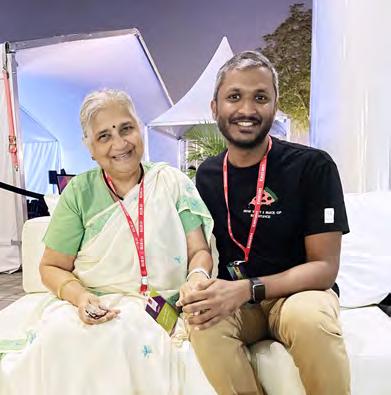
And the rest, as they say, is historyInfosys went on to become the success it continues to be today. Murty herself was one of Infosys’s early employees, although she decided to exit the enterprise following a decision made jointly by her and her husband that she’d focus on taking care of their two children (her son, Rohan, was born in 1983), while he would train his sights on building the company, which had shifted its base from Pune to Bangalore by then. Murty then took on a role as a professor at educational institutions in the city, and then, in the 90s, when Infosys came into its own, so to speak, Murty started a new chapter of her career as the founder and Chairperson of the Infosys Foundation. As an enterprise centered on “supporting the underprivileged, creating opportunities, and striving towards a more equitable society,” Infosys Foundation has supported a multitude of social projects across India, which range from the construction of libraries (and toilets!) in the country’s villages, to the donation of funds for, say, scientific research, cancer treatment, or even mid-day meals at schools.
Murty, who was 45 years old when
she founded the Foundation, says that she was driven to launch it following an argument she had with her then 16-year-old daughter over the matter of social work. This episode is recorded in Murty’s book of short stories, Here, ThereandEverywhere- in it, Akshata is quoted as saying the following words to her mother: “Amma, when an educated person like you, well-travelled, well-read, and without love for money, does not help poor people, then don’t expect anyone else to do. Is it not your duty to give back to those unfortunate people? What are you looking for in life? Are you looking for glamor or fame? You are the daughter of a doctor, granddaughter of a schoolteacher, and come from a distinguished teaching family. If you cannot help poor people, then don’t expect anyone else to do it.” Akshata’s words resonated with Murty, and she tells me they also reminded her of JRD’s words to her all those years ago in Mumbai. “I was sleeping, and my daughter woke me up,” Murty says, and the Infosys Foundation came into being shortly after.
The work Murty has led at the Foundation has earned her plenty of accolades from around the world; earlier this year, she was also presented with the Padma Bhushan, which is India’s third highest civilian award. Murty is today one of India’s most also prolific authors as well, especially with her non-fiction, which is built off the experiences she has had through her lifetime. At this point though, given all of the achievements Murty has had through the course of her life, one would certainly not mind if she were to, well, just withdraw from everything that she does, and, well, just sit back and relax. But Murty doesn’t seem to even have entertained such a thought in her mind- after all, she has a purpose learnt over the course of a lifetime driving her. “When I look at poor people, I feel like I have a duty towards them,” she explains. “That keeps me working hard, that keeps me traveling and touring, that keeps me writing my experiences, that keeps me wanting to share my experiences with the next generation… Because I have a duty.”
47 March 2023 / ENTREPRENEUR.COM /
↑
MURTY with Entrepreneur Middle East Editor in Chief Aby Sam Thomas
FUN COMES GUAR ANTEED
YOU DECIDE WHEN THE PARTY STOPS WITH 24HR FOOD & DRINK. NOW OPEN AT DUBAI D IGI TAL P ARK.

R ADISSONHOTELS.COM/RED
#TamTalksTech
Gadgets and doodads that you might’ve missed out on, sourced by a tech aficionado. by
TAMARA CLARKE
Oh snap! →

/Samsung Galaxy S23 Ultra
Take crisp photos and videos from dusk till dawn with the Samsung Galaxy S23 Ultra’s most advanced camera system. Galaxy S23 Ultra is equipped with five cameras: a 12MP selfie camera, a 12MP ultra-wide camera, 200MP wide-angle camera, a 10MP 10x-optical-zoom telephoto camera, as well as a 10MP 3x-opticalzoom telephoto camera. Low light selfies are enhanced by artificial intelligence (AI) for crisp details and accurate color. The device is also optimized for gaming with it featuring the brand-new Snapdragon 8 Gen 2 Mobile Platform for Galaxy, the most powerful and efficient platform ever in a Samsung Galaxy smartphone, as well as the fastest Snapdragon available today. It also features a 5000mAh battery, Corning Gorilla Glass Victus 2, and a newly designed central processing unit (CPU) micro architecture, which boosts the
processing abilities of the Galaxy S23 series by about 30%. Finally, Galaxy S23 Ultra has a striking symmetrical design composed of recycled and eco-conscious materials, and its polished metal frame is available in phantom black, cream, green, and lavender.
Listen up ←
/OPPO Enco Air3

OPPO Enco Air3 are the first earbuds in their price range to include a HiFi5 digital signal processing (DSP) module. The wireless earbuds give you 25 hours of battery life, noise cancellation for phone calls, and better sound quality than its predecessors. It also handles OPPO Alive Audio processing in the earbuds themselves, for a more immersive, three-dimensional listening experience.
Screen time ↓ /AOC V5 Series Monitor
The AOC V5 series is an ideal complement to any office setup that requires a webcam, while keeping desk space neat and free of unsightly wires. The CU34V5CW/BK is equipped with Windows Hello Webcam alongside advanced sensors for facial recognition, allowing you to easily and securely log in to your computer. Additionally, the monitor supports embedded webcam and picture-by-picture multi-view, which works well for online presentations, live streaming, working remotely, or engaging in video conferencing. The ultra-wide monitor offers curved vertical alignment (VA) panels with wide quad high definition resolution; plus, it’s equipped with a 100Hz refresh rate that outshines the 60Hz of regular office models. The V5 series also features a four-port USB 3.2 hub and a USB-C connector with 65W power delivery. The monitor is striking, yet unpretentious. It comes in black featuring a three-side borderless design with a very narrow chin at the bottom bezel, and a super-thin base (3.5mm), that allows for swivel, tilt, and 130mm height-adjustable modes for an ergonomic use in either work or entertainment settings.

Beyond audio, OPPO Enco Air3 adopts the newest generation Bluetooth 5.3 low-latency transmission, and supports functionalities like double-tap to control camera, as well as dual device seamless switching, where you can connect the earbuds to two devices at the same time, and easily switch between them, without manually changing device settings.

TAMARA CLARKE, a former software development professional, is the tech and lifestyle enthusiast behind The Global Gazette, one of the most active blogs in the Middle East. The Global Gazette has been welcomed and lauded by some of the most influential tech brands in the region. Clarke’s goal is to inform about technology and how it supports our lifestyles.
Talk to her on Twitter @TAMARACLARKE theglobalgazette.com

49 March 2023 / ENTREPRENEUR.COM /
B / Gear
IMAGES © SAMSUNG | OPPO | AOC
The Executive Selection
From better goods to better wardrobe bests, every issue, we choose a few items that make the approved executive selection list. In this edition, our picks include Fendi, Perpétuel, Paco Rabanne, and more.
MORE THAN WHAT MEETS THE EYE → Fendi

Designed by Fendi’s Artistic Director of Accessories and Menswear, Silvia Venturini Fendi, the brand’s Fall/ Winter 2023 collection brings together sophistication, comfort, and luxury. Inspired by classicism, we see capes turned into sweaters, as well as soft furs, one-shoulder tops, with accents of Swarovski and sparkling sequins. There are also
leisure suits in cashmere and fleece, along with unstructured shirts, blanket coats, and ponchos. Besides playing with asymmetrical silhouettes and volumes, the line also offers a palette that includes shades of dove grey, oatmeal shade, burnt umber, mocha, mauve, lavender, deep navy, and black. fendi.com


B
/Gear
50 / ENTREPRENEUR.COM / February 2023
FOR THE HISTORY BUFFS ↓ Perpétuel
As a purveyor of distinctive timepieces, in January of this year, Dubai-based gallery Perpétuel has released the first limited edition of a collaboration between renowned watchmakers, the late Derek Pratt and Luca Soprano. With the timepiece aimed at being an embodiment of Pratt’s love for mechanical movements, craftsmanship, and art, it has several distinct features,


which includes a remontoire in a tourbillion, as well as a salmon colored dial with Eastern Arabic numerals in stainless steel. Designed and assembled in the Ateliers 7h38 workshop, this timepiece is powered by Caliber DP07, with a 36-hour power reserve. If you’re fascinated with tradition and antiquarian horology, this timepiece deserves a spot in your collection. perpetual.com

EDITOR’S PICK
No matter the season, a statement pair of sunglasses is a great addition to any ensemble. For a classic black pair of sunnies, we’re a fan of Saint Laurent’s M119 Blaze sunglasses. Made in Italy, it features quintessential cat-eye frames with nylon lenses, as well as the unmissable oversize Cassandre logo, a sculpted jewel YSL signature adorning the temples, for a swanky bold look. Offered in black and Havana brown, grab a pair of these vintage inspired sunglasses, and add a subtle layer of oomph to your look. ysl.com


PUSHING THE LIMITS ↓ Paco Rabanne
2023 sees Paco Rabanne offering a new scent with Invictus Victory Elixir, a rich blend of spice, wood, and freshness. Designed as “the ultimate expression of victory,” the eau de parfum offers a woody amber scent, with fresh aromatic lavandin, green cardamom, and black pepper upon first impression. As for its heart, it’s made up of blends of woody Indonesian patchouli, followed by notes of vanilla bean as well as tonka bean on its base. Its bottle also features an engraved golden V for victory in the
glass, which stands out against the gradient of black to dark blue. pacorabanne.com

51 March 2023 / ENTREPRENEUR.COM /
IMAGES COURTESY FENDI | PERPETUEL | PACO RABANNE | SAINT LAURENT
SAINT LAURENT

E-COMMERCE MADE EASY Supercharge your ecommerce and online operations with Lyve. Get fast, flexible, and full-featured delivery and technology solutions that meet your customers’ needs and allow you to focus on what you do best. Go Lyve Today lyveglobal.com/ecommerce #golyve
The Path to (Peak) Productivity
Analyzing what it takes to become more effective (and efficient) at work
by AALIA MEHREEN AHMED
53 March 2023 / ENTREPRENEUR.COM /
IMAGE COURTESY SHAMIM KASSIBAWI
How do you introduce a topic that has been at the forefront of possibly every entrepreneur’s mind? Now, I have to admit that when I first set out to write this piece, the intentions behind it stemmed slightly from my own selfish wants. Despite detailed to-do lists and hour-based allocations for specific tasks, I sometimes found myself struggling to have a fruitful day at work. And so, I figured, who better to turn to for advice than individuals who juggle an umpteen number of responsibilities as they run their own business ventures? That’s essentially how I came to pick the minds of four UAE-based entrepreneurs on what they believe is the secret to achieving peak productivity.
who appears overly confident, and believes they can do everything, which can lead to burnout. The second is the entrepreneur who lacks confidence, lacks belief, and fears failure, and is afraid to take risks. And the third category is the entrepreneur who makes a mistake, and instead of getting back up, they constantly think, ‘What if?’”
}First, however, in order to bring in a voice of expertise and knowledge on this subject, I spoke to Niamh Jordan, Regional Partner for the Middle East at global leadership development firm TPC Leadership. “First and foremost, investing in one’s self-awareness is critical to achieving one’s peak productivity,” Jordan told me. “Entrepreneurs, in general, can be categorized into more than one category. The first category is the entrepreneur
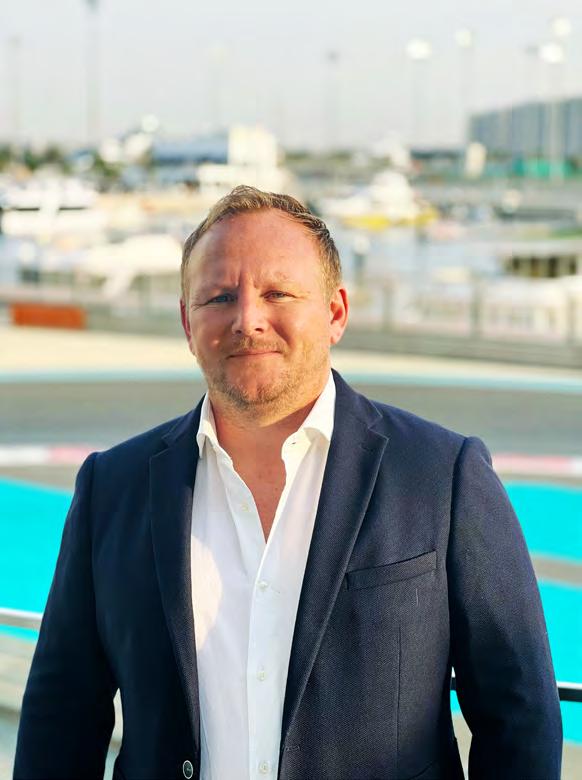
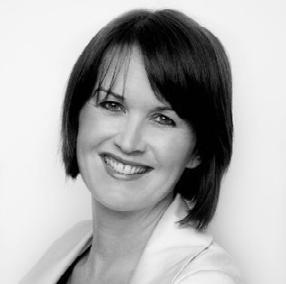
Now, for those of you reading this who are entrepreneurs, I will leave it to you to decide which of the categories you belong to. But let me to introduce you to one entrepreneur who doesn’t allow negative self-talk to hinder her own productivity: Shamim Kassibawi, founder and CEO of Play:Date, an interactive platform for parents to help build their children’s social circle. “When I wake up, I always try to keep my positive thoughts
alive,” Kassibawi says. “I think of all the amazing things I want to achieve that day. It could be work-related or more personal, such as cooking an amazing meal for my family. I also remind myself that I am going to kill it, and that today will be a hit!’ I am going through a seed funding round as we speak- you go through so many rejections, investor paperwork, emails, and research. So, it is crucial to keep my motivation and faith intact, despite me feeling that progress might be a bit slow.”
}Now, of course, an optimistic attitude such as Kassibawi’s is something all entrepreneurs want to channel- but then again, like
all good things, avoiding moderation in this regard can prove to be detrimental. As an article published on Verywell Mind, an online platform that offers professional mental health information and resources, puts it, toxic positivity is about taking “positive thinking to an overgeneralized extreme.” Also known as forced or unrealistic optimism, it is a state of mind wherein an individual incessantly forces a positive outlook on life, without taking into account the reality of a given situation. Cautioning entrepreneurs against such an approach is Daniel Solomon, founder of HeroGo, a Dubai-based startup that seeks to combat food waste
54 / ENTREPRENEUR.COM / March 2023
‘T
/Pro
↑ NIAMH JORDAN, Regional Partner - Middle East, TPC Leadership
↑ OLIVER KENT, Managing Director, ZK Sports and Entertainment
issues by supplying excess fresh grocery items directly to consumers. “Optimism is key for entrepreneurs- that positive outlook is what keeps us going no matter what comes along,” Solomon says. “But forced optimism is also a major factor in entrepreneurs getting carried away. It is important to strike a healthy balance. As entrepreneurs, we should have a realistic understanding of our abilities, set achievable goals, and prioritize self-care, which is something we often forget. However, we can’t do this alone, which is why entrepreneurs must also find a support system to provide accountability and encouragement, both within and outside of the founder community.”
}Mirroring this need to create a competent group of people one can rely on is Tahany Taher, co-founder of Hayawiia, a Dubai-based platform that offers healthy gourmet food. “Knowing that

you are present or not. We sometimes over-inflate the dependency that our company has on us. You are not needed for every meeting, or for every decision. Choosing a team that will support and run the business is the benchmark of any and all successful businesses.”
}Now, all of this isn’t to say that managing an entrepreneur’s responsibilities is a piece of cake, of course. If anything, Taher describes it best when she says that being an entrepreneur is “like being the entire football team and the manager!” She adds, “As an entrepreneur, you will always find it difficult to strike a balance, but what I have found that seems to work for me is realizing that any decision made from fear or anxiety will always lead to failure. Prioritizing is the most important thing that an entrepreneur can learnknowing that the world will not end if certain decisions
everything in your life has value is a brilliant starting point,” Taher says. “We entrepreneurs put so much energy and focus into our business that we forget about the huge revolving world around us. In order to balance this out, it is important to create a structure that allows the business to flourish, whether
are acted upon the next day is important.”
Here, Taher drops a word that often lays the foundation for productivity: prioritizing. And often synonymous with the act of prioritization are to-do lists. But while listing down one’s tasks is only part of the solution, identifying which ones need to be ticked off
first may present quite the dilemma, says HeroGo’s Solomon. “It may depend on the stage of the company or the task the entrepreneur is working on, but sometimes, it feels impossible not to feel overwhelmed- prioritizing tasks as an entrepreneur can be challenging, as all tasks often seem important, and the list never ends,” Solomon
confesses. “I think the best way one can prioritize tasks is based on impact, urgency, and effort. For impact, I refer to the potential results of a task- how it will impact the business, and what its outcomes are. For urgency, one can look at tasks with deadlines, i.e. the consequences of not completing the task on time. Meanwhile, effort refers to the amount of time and energy required to complete the task.”
For all the upstarts out there, Solomon’s three-step process to prioritize better can certainly come in handy as you run your respective ventures.
55 March 2023 / ENTREPRENEUR.COM /
WE SOMETIMES OVER-INFLATE THE DEPENDENCY THAT OUR COMPANY HAS ON US. YOU ARE NOT NEEDED FOR EVERY MEETING, OR FOR EVERY DECISION.
→ SHAMIM KASSIBAWI, founder and CEO, PlayDate
But it is also important to remember that there never has been -and perhaps never will be- a one-sizefits-all approach to ranking the urgency of tasks. This is something that Oliver Kent, Managing Director of UAE-based sports agency ZK Sports & Entertainment, can personally attest to. Take, for example, how he’s learnt to be more mindful about deciding which tasks are more important than others. “I
am famous for writing to-do lists, and never actually finishing every task on there, which can be quite demotivating,” Kent says. “Often, as soon as you focus on one of the key things on the to-do list, a phone call comes with a new issue, and then half the day is gone. As a result, I have certainly started limiting my to-do list, and only putting the core tasks for the day or the week. Otherwise, I end up with extremely long lists
that never actually get done completely, turning them into more of a burden. This is obviously the price you pay for having your own business and being an entrepreneur!”
}What Kent alludes to is a significant point to ponder upon: being super-organized may not necessarily be the answer to achieving productivity. After all, we live in a time when even world-renowned organizing consultant Marie Kondo recently confessed to not being as systematic as she used to be, having embraced the challenges of being a working mother while raising three kids. As Play:Date’s Kassibawi likes to say, it is important to “leave some room for chaos to enter.” She explains, “I like to think of myself as organized chaos. Multitask-
there is no denying that disorganized individuals are able to achieve a lot as well.”

Taher offers a very similar approach to dismissing the negative connotations that come with unfinished tasks and overflowing to-do lists. “Of course, an ideally productive day consists of me working towards achieving my goals for my business, creating an environment that gives satisfaction to my staff, and creating new avenues for growth,” Taher says. “But as an entrepreneur, my mind is always full of clutter. And realizing that everything -even my business- is made up of clutter actually shows me its importance. The one thing I do tell myself is that today’s clutter is tomorrow’s world changing business idea.”
}Now, embracing the disorderliness of entrepreneurial life is one thing. But when it comes to navigating one’s way through it, there exists a question that is a hot topic of contention: is multitasking good or bad?
ing is definitely a skill of mine, and I can work on a million things at once. I truly believe that entrepreneurs are born with this ability; there is a particular DNA in us that enjoys the volatility, the chaos, and how things can change completely throughout the course of a day. A successful entrepreneur, in my opinion, must be able to work through chaos. I think there is truth in both: being organized is productive, but
A 2021 study by Stanford University’s Neuroscience Institute found that multitasking often poses more harm than good. Multiple other studies have also shown that multitasking can negatively affect one’s brain efficiency, and thereby productivity. These are findings that Solomon would agree with. “Entrepreneurs must multitask, especially at the early stage of a company’s journey; however, multitasking can result in decreased productivity, particularly since, as humans, our brains are not built to perform multiple
56 / ENTREPRENEUR.COM / March 2023
OF COURSE, AN IDEALLY PRODUCTIVE DAY CONSISTS OF ME WORKING TOWARDS ACHIEVING MY GOALS FOR MY BUSINESS, CREATING AN ENVIRONMENT THAT GIVES SATISFACTION TO MY STAFF, AND CREATING NEW AVENUES FOR GROWTH.
‘T/Pro
↑ TAHANY TAHER, co-founder, Hayawiia
complex tasks simultaneously,” Solomon says. “Personally, I find switching back and forth between tasks can usually lead to mental fatigue and decreased accuracy when performing tasks. Although, there are certain simple tasks -such as listening to music while researching creative product design, for example- that can have a positive impact on our overall productivity. I find this helpful; however, this may not be helpful to someone else, since the ability to multitask effectively varies from person to person. It is essential to find a balance between the demands of multitasking and one’s own limitations.”
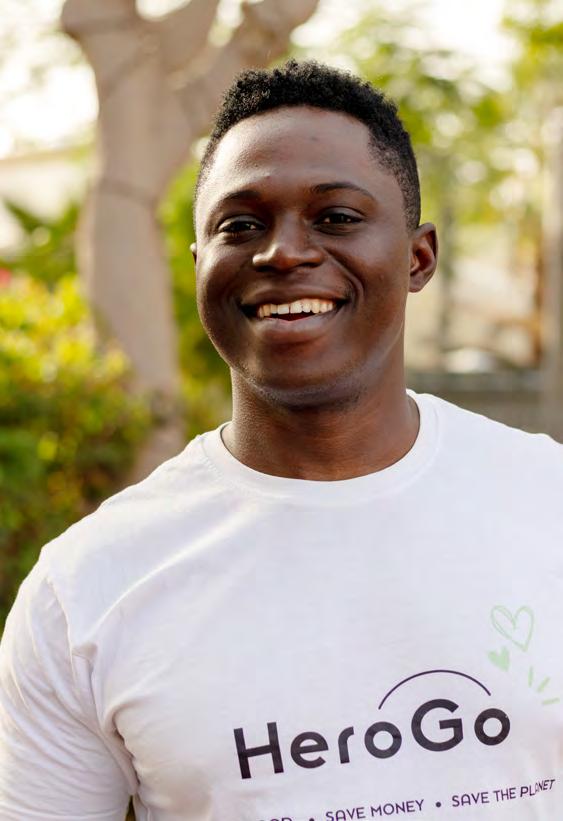
}The quality of discernment, you will find, is the hidden element in unlocking your own productivity potential. But how does one discern in a way that suits one’s best interests? “Simply put, asking others for feedback, and being in tune with the three intelligences -mind (what is my brain saying?), heart (what am I feeling?), and intuition (what is my gut telling me?)- will help distinguish between the actual reality versus the perceived reality,” TPC Leadership’s Jordan explains. “It is important to understand that it is not always smooth sailing, and if things are difficult, to have empathy and self-compassion. It takes a high level of emotional intelligence to understand our capacity, and acknowledge our limitations in the moment, and realize when it is necessary to say ‘no.’ Our greatest investment is ourselves- mind, body, heart, and spirit.”
Taking care of oneself -especially one’s mental healthseems to be yet another way to stay productive. For example, entrepreneurs with families and kids might find Kent’s approach of gauging his level of energy across different times of the day as a useful tool to adopt mindfulness. “First thing in the morning, I normally go to the gym, take the kids to school, and spend an hour or so catching up on non-essential tasks,” Kent explains. “Around 10am, I really get stuck into the to-do list, and everything we’ve got going on with clients. Around 4pm, I know that my energy levels really drop, so I take myself away from work, and go back home, see my kids for an hour or so. I always make sure to practice the sports that I love, and also make sure that I see the kids throughout the week, because those one or two hours always takes you away from the workplace, and allows you to clear your head, and focus on other things. And so, 90% of the time, I find it easy to step in and out, and not get dragged into working 24 hours.”
Now, for individuals with more “workaholic” inclinations, Taher’s self-care journey may provide inspiration. “Earlier in my life, I used to be a nose-to-the-grindstone type of person, whose entirety was based on achieving one goal only: overachieving numbers that I had either put in front of myself, or that others had put in front of me,” Taher recalls. “However, as time progressed, I started realizing that my fire hadn’t diminished, but my capacity to handle the fire had. That is when an evolution started taking place within memeditation and mindfulness changed my whole perspective on how I viewed goals. They are still very important, but
now, they have become a want, rather than a need. When something makes the transition from want to need, so does your drive. Now, I feel more energetic than ever before, and I find myself in a space that values the parts as much as the whole.”
}Kassibawi too offers a similar take on how taking better care of her mental health has led to better results at work. “The term meditation is different for everyone, and that is the beauty of it; we all meditate through our own methods,” she says. “It could be praying, yoga, exercise, walking, running, or simply sitting alone in silence. I sometimes struggle to stay focused for too long, I have to get up and walk around, stare out the window for a bit, and I find that this increases my productivity. I like to meditate as frequently as I can, usually three times per week. I am a firm believer in the law of attraction. Although we all have bad days, we can choose to turn them around by not letting that energy ruin our day.” That’s a point I’m going to keep in mind the next I feel less productive than usual- and I hope that you, dear reader, do the same. All the best!
57 March 2023 / ENTREPRENEUR.COM /
↓ DANIEL SOLOMON, founder, Herogo
Doing Our Best (instead of doing it all)
Terming women as “superwomen” might be doing more harm than good by SOPHIE SIMPSON
Superwoman.” Is it a dirty word? While its popular culture definition may be one that conjures images of an endlessly multitasking woman who can feed multiple kids with one hand, field work calls with the other, and steer the car with her feet to a charity luncheon, the reckless use of the word holds undesirable implications for womankind. Ironic? Maybe. So, what is inherently wrong with the term “superwoman”? Well, Gloria Steinem said it best: “You can’t do it all. No one can have two full-time jobs, have perfect children, and cook three meals, and be multiorgasmic ‘til dawn... Superwoman is the adversary of the women’s movement.”
} My own mother was a “superwoman,” or, at least, I perceived her to be so. An astute, motivated, caring mother who smashed the glass ceiling, and propelled herself through the next two decades as the President of multiple companies. At the same time, she juggled the demanding needs of twins, an international career, home life, and the countless other demands that a busy life delivers in its wake. Often I would ask her, “Just how did you do it all?”
And her advice to me, time and time again, be it when I began climbing the career ladder, or when I co-founded my own company with a female business partner, or, perhaps most pertinently, when I threw having babies into the equation, was this. “Don’t be silly, Sophie; women can have it all, but they can’t do it all,” she told me. “At the end of the day, we have the biological privilege to bear children. So, relish in that privilege, be kind to yourself, and simply do your very best with the support of those around you. No man is an island.”
Reflecting on her pragmatic stance on the subject, my “superwoman” mother has always had a way of putting things in black and white. Yet in all of her matter-of-fact wisdom, I’ll admit her retorts never quite explained how she’d managed to pull off the remarkable. And so I have taken her achievements as a benchmark, and her advice as my consolation.
I have countless female friends who are also working mothers, and I have heard many, on multiple occasions, express self-doubt in their abilities to “do it all.” Disenfranchised in part by the endless stream of “success stories” broadcast across social media by their virtual peers, they are often left questioning whether they measure up, and why they don’t always feel like they can bear the load- at least not as effortlessly, glamorously, or graciously “as she does.”
} Therefore, I pose the hypothesis that in all its over-used glory, the use of the term “superwoman” has begun an insidious transformation into a new, not-soempowering paradigm, a competitive discourse challenging its subjects as to who can be the most exhausted, the most
58 / ENTREPRENEUR.COM / March 2023
‘T/Pro
overworked, leaving everyone vying for the top spot of the “busiest” woman. As opposed to a superpower, it sounds more like a syndrome.
In fact, Marjorie Hansen Shaevitz first coined the term “superwoman syndrome” in 1984 in her book by the same name, suggesting it comes to pass when a woman neglects herself as she strives to achieve perfection in every role she is fulfilling, measuring success or failure against tangible outputs.
When taking on the world, and possibly at times more than our fair share, we need partners, friends, and family who know when to encourage and congratulate our vivacious and “admirable” energy, and when to cough up the home truthsi.e. “You’re doing too much,” or, “Take a moment, you seem overwhelmed.”
In all the ground we have covered over the course of the decades-long women’s movement, there has percolated an unspoken sentiment that the extra load should be quietly considered an honor to carry, rather than a burden. That heaven forbid we may be perceived as ungracious or self-absorbed should we whine about our lot.
Many of us may be feeling ashamed to second-guess ourselves, because isn’t this the privilege our predecessors went into combat for? Didn’t we ask for this? Not only that, but we may feel desperate not to show signs of failing to cope with our individual consignment, for if someone picks up on it, it could deem it evidentiary to our own suspicions that we don’t have the smarts, the strength, the competence to “do it all”- to be that “superwoman.”
But as the research shows, any woman thinking like this is not alone in feeling overwhelmed, overworked, exhausted, and/or unmotivated. Deloitte’s 2022 Women at Work research surveyed 5,000 women in the workplace across a dozen countries, and found that the disruptive impact of the COVID-19 crisis, including its pivotal role in redefining the “new normal” of work, has been overwhelming women.
Burnout, specifically, has reached perilous new heights. The research indicates burnout has led many women to make life-changing personal and career decisions in order to protect their own emotional wellbeing, and mitigate its precarious ripple effects. We have seen examples of this the world over, with many seeking more flexible work arrangements, and others opting out of the workforce altogether.
} Deloitte’s study shone the light on startling reality, with over half of respondents rating their stress levels as well in excess of what they were a year ago. It aligns with the additional finding that almost 50% felt burnt out, indicating their mental health was either “poor or very poor.” Over 30% of the sample group indicated they had taken leave due to mental health, yet the research also revealed that well under half felt they could address these issues comfortably with their employers.
Additional supporting insights drawn from research by Great Place to Work and Maven revealed that mothers in paid employment “were 23% more likely to experience burnout

DELOITTE’S STUDY SHONE THE LIGHT ON STARTLING REALITY, WITH OVER HALF OF RESPONDENTS RATING THEIR STRESS LEVELS AS WELL IN EXCESS OF WHAT THEY WERE A YEAR AGO.
than fathers in paid employment”. The analysis also estimated that 2.35 million working mothers in the USA had suffered from burnout since the beginning of the COVID-19 pandemic, citing the primary cause as “unequal demands of home and work.”
Various other studies point the finger at these double-edge home and work pressures. Labor department research from the USA has repeatedly suggested that even when both partners are in paid employment, women’s domestic load in the home outweighs that of men. This finding may well be symptomatic of a deeply entrenched social imbalance that the COVID-19 crisis’ impact has shone a spotlight on, but also intensified. There are various reasons why women, particularly those caring for children, continue to be more likely than their male counterparts to juggle a more varied set of day-to-day responsibilities, which could be generalized as a rather capricious combination of household and family-related tasks and chores, alongside their paid professional work.
In an ostensibly cruel twist, recent studies such as Female Leadership Advantage and Disadvantage published in the Psychology of Women Quarterly have suggested that society tends to hold women to a higher standard than men, and rewards them for not making mistakes. But internalizing the expectations of others -or what we think they expect- is as sure to burn us out as the sun will set. To continue ascending in our careers, we must tune in to our own standards for what’s a good -or good enough- job.
So, when it comes to our protagonist -the “superwoman”- let us always remain conscious of context, and of unique plights of each of our fellow females, when we gush in unbridled wonderment and conviction over her seemingly “superhuman” ability to “do it all.” Let us make a pact not to airbrush reality for, as ever, real conversations will better serve us to empower each other, and womankind.
And as women, let us remember that trying to do it all and have it all -and all at once at that- is a spicy recipe for burnout, and quite possibly setting us back in strides in our pursuit of fulfilment and happiness. At the end of the day, you over there are doing your best, and for that, I applaud you.
Sophie Simpson is the founder and Managing Director of Atteline, an award-winning public relations agency headquartered in Dubai, UAE. Leveraging global experience, regional insight, and local expertise, Atteline packages, protects, and propels the brands it believes in across the consumer and corporate landscape. atteline.com
59 March 2023 / ENTREPRENEUR.COM /
Untapped Potential
by PERIHAN ABOUZEID
Theoretically, there’s no doubt that the working world is gearing towards helping women in the workplace. Statistics around the importance of women in leadership roles, and the benefit that female CEOs and senior management bring to the bottom line are there for everyone to see. And while female founders receive significantly less funding opportunities than their male counterparts, the growth of women owned enterprises is on the rise.
The facts are bare though- it’s less about breaking glass ceilings and venture capital fundraising, and more about the basic, grassroots support required globally in getting women into work or back to work, with opportunities
decimated after the COVID-19 pandemic, and then actually keeping them there. It’s thus more important than ever to recognize the barriers to not only career progression, but to entry itself, on the woman who wants to work, return to work, or feel that she can do so successfully whilst raising a family.
Major world events in the recent past may have obliterated the progress made in workplace gender equality over the past 50 years, but we cannot ignore the fact that retaining women in the workplace hasn’t been a problem even before them, particularly in certain industries. For instance, in science and technology, the GCC region is crying out for participation from skilled work-
ers, and, as such, it’s a career path I often recommend to young women looking for focus, especially with the expectancy of a local boom in opportunities. Upskilling and training is vital at the outset, but when it comes to talk of flexibility, the future seems less rosy.
Globally, the percentage of women in the workplace is lower than ever. Typically, flexible or motherhood-friendly options were affected hugely by the COVID-19 pandemic and its economic ramifications. The benefits of a diverse and inclusive workforce for a company lean towards a positive bottom line; we know this- yet, why is it so hard to attract and retain female talent? The talent is there, the willingness is there- but there
are needs that the corporate and startup worlds must address head-on, if we are to encourage and retain the talent of working mothers within a successful ecosystem.
Speaking in New York, United Nations (UN) Secretary General António Guterres’ remarked to the Group of Friends on Gender Parity to mark the fifth anniversary of the Gender Parity Strategy: “Gender inequality is essentially a question of power. Our male-dominated world and male-dominated culture damage both men and women. And to transform power relations, we need equality between men and women in leadership, decision-making, and participation at all levels. Achieving gender parity is not only a personal priority, it is a strategic goal for the organization. And it’s vital for the United Nations to represent the values it stands for -the values enshrined in the charter– and to lead by example.”
The UN itself is not immune, with self-confessed “slow progress” on gender parity within professional staff. It’s important to remember here that balancing work and family life is not just a female issue; it’s a society issue. Supporting staff with the flexibility and balance required to bring their best selves to work needs to happen quickly, regardless of ongoing and chaotic world order. This is about humans. Women need their physical and mental health supported to be able to raise their families, and to become useful and successful employees.
Maternity policies and equal opportunities surrounding career trajectory, irrespective of family status, must all be in place and transparent to help women make secure decisions
60 / ENTREPRENEUR.COM / March 2023 ‘T/Pro
Why companies must act quickly to welcome (and retain) working mothers
Path to Progress
on where they work and for whom. That’s not all, even within the startup culture that is so positive across the Middle East, we see an expectation of long hours and “hustle” as standard. The latest labor law decree in the UAE (2021) means that employers are allowed to grant longer leave periods for new mothers at their discretion, but the rules specify the minimum number of days that working women are entitled to take for maternity leave.
Too many organizations are looking to take advantage of an endemic “presenteeism” culture, and too many women simply do not know their rights, or have the confidence to ask. Policies should be explained and easily accessible. Nobody should be afraid to ask questions around their contractual circumstances. Women’s physical health, at various life stages, is not something we can keep ignoring or dismissing. From the right and need to breastfeed her children, through to the challenges brought by pregnancy and menopause and other caregiving roles, support for all of this should be a given, again, on a human level, and it is most definitely the basis for a happy and engaged workforce. 47% of working mothers consider switching careers due to the lack of breastfeeding support they have experienced at work.
As a reminder, in the UAE, it is now -finally- illegal to terminate the service of a working woman, or give her a warning because of pregnancy, of obtaining maternity leave, or of her absence from work in accordance with the provisions of the latest articles. Helping women access solid maternity leave and processes, and supporting them upon return includes offering seemingly “micro” details that are an oversight to many. Mothers returning to work may need time and access to comfortable and sanitary spaces for expressing breastmilk, for example, or flexible working options around childcare issues or potential sickness within the family. When women feel supported by their management and peers, the loyalty to the company and the rewards are manifold, and we all know that it is cheaper to retain a good employee than to hire a new one. For every $1 spent by companies on supportive maternity programs, they stand to earn $3 back- not forgetting that talent retention rises to 67% also.
Progressive organizations are now offering solid programs for “returners”- the untapped talent market within women who have been out of the workplace whilst raising children is exponential. Ageism has no place in a modern business; it’s short-sighted to assume that once a woman takes time out to have or raise children, her career pathway has ended. Employers must also no longer see the rights and needs of working women as a stick to bar their career path, or even as a “nice to do”- it’s imperative, and both your company balance sheet and your employees will thank you for it.
Perihan Abouzeid is the founder and CEO of PeriCare, the MENA’s first femtech startup focused on building products for working mothers and mothers on the go. Abouzeid is on a purpose-led mission to improve opportunities for women in the workplace, and to work with organizations to ensure that parents are able to take their rightful place in the workplace in a way that supports not only themselves, but their children, and the wider economy as a whole. peri.care
Increasing paid maternity leave to 60 days is a step in the right direction for the UAE—but more needs to be done by FAZEELA
 GOPALANI
GOPALANI
As the Head of the Association of Certified Chartered Accountants (ACCA) in the Middle East, I’ve been overseeing the expansion of our Women in Finance initiative into Saudi Arabia and Oman, and with it, I am seeing that the conversation about the experiences of women in the Middle East’s workforce is flourishing. I passionately believe that it is everyone’s responsibility –and not just the work of campaigning women– to close gender gaps when it comes to education, salary, and career prospects. That’s how meaningful progress can be achieved- our society can only reap great benefits by supporting women at every stage of their career.
} As a leader who happens to be a woman and a mother, I’ve seen many positive strides towards closing the gender gap when it comes to men and women in the workplace. We see more women in management roles, and the global gender pay gap is slowly getting smaller. However, it isn’t something I take for granted. As someone who has experienced the very real challenge of giving birth and returning to full-time work very quickly after, I know from first-hand experience that we need to do much more to support women at this most pivotal and significant life milestone.
61 March 2023 / ENTREPRENEUR.COM /
In February last year, the UAE labor law increased paid maternity leave to 60 days, with 45 days on full-pay, and an additional 15 days at half-pay. It’s absolutely a step in the right direction. I think all of us instinctively understand that increasing support for women who have babies can only serve to ensure that the rich talent pool represented by the female population doesn’t dwindle during its childbearing years. I think we all instinctively also understand that 60 days of leave isn’t sufficient time for a woman to get back to full time work after birth.

} Now, when it comes to “mat leave” in the UAE, we sadly lag behind much of the world in this regard- Iceland offers both mothers and fathers four months of parental leave, Romania allows its working mothers to take 100 weeks off with an average of 85% salary covered. Estonia, Albania, Croatia, the UK and Montenegro are amongst the countries that offer over 50 weeks of maternity
leave. Conversely, the USA offers absolutely none by law– a surprising statistic from a global superpower. That said, the truth is that there are many challenges for women when it comes to navigating maternity leave in the UAE. Many women are torn between fulfilling their role as a mother and returning to the workplace earlier than they would like. There is a misconception that if a woman does not want to return to work after just 45 days, she doesn’t want to return at all, or she don’t value her job. This resonates with my own experience, and it is an issue that I feel very passionately about. It plays a huge factor for many women who feel they have no option but to quit careers to raise families. Many women, quite understandably, do not feel ready to return to work after such a short amount of time. It leaves little time to bond, heal from childbirth, and develop healthy patterns for both the mother and the child. Women should not have to make the choice between being a
mother and having a career. We should have an environment where it is encouraged to do both.
For women who run their own businesses, of course, the challenges are greater, because the reality for many entrepreneurs is that they simply don’t get days off! My own experience of maternity leave in the UK was similar to that in the UAE. I was running my accountancy practice, and I took just 40 days maternity leave. I felt I had no option but to return to work with an air of capability and calm, when I felt anything but. I was under huge pressure to attend to my clients, even with a newborn in my arms.
} That said, although the UAE’s maternity leave lags behind other countries, breastfeeding is encouraged and protected by law, something I think is worth celebrating. A female worker is entitled, according to UAE law “to one or two additional breaks each day for nursing her child. The duration of the two breaks must not exceed one hour. The woman is entitled to such breaks for six months following the date of delivery. Such breaks are fully paid for.” Such efforts show that our government has supported progress in the right direction, and private companies also need to help remove the stigma around taking time off to raise a family. It doesn’t mean a woman values her job less, or performs less. I also think we need to encourage and recognize the important role of fathers in all of this. New dads in the UAE receive just three paid days of paternity leave- one of the lowest anywhere in the world.
We have come to adopt many international best practices when it comes to doing business. As such, I believe that it’s worth looking closely at countries with longer maternity leave, and asking ourselves the question: “Are these societies at a disadvantage, because of longer maternity and paternity leave?”
I think the opposite is true.
62 / ENTREPRENEUR.COM / March 2023
Fazeela Gopalani is the Head of Association of Certified Chartered Accountants (ACCA) in the Middle East. accame.me
‘T/Pro
ESTONIA, ALBANIA, CROATIA, THE UK AND MONTENEGRO ARE AMONGST THE COUNTRIES THAT OFFER OVER 50 WEEKS OF MATERNITY LEAVE.
Laying the Groundwork
What startup founders raising capital need to know about term sheets
As a startup founder raising capital, negotiations with investors are bound to extend to more than just the actual investment amount. Before you reach this point, it’s good to have a clear understanding of the term sheet- a key document that lays out the agreed terms of the potential deal.
Term sheets are non-binding legal agreements. Once the term sheet details are agreed, parties incorporate the terms into a subscription agreement at a future date, which then becomes a binding legal agreement between founder and investor. Clearly, a term sheet is central to negotiations, and it keeps both parties on track to progress the deal to a successful conclusion.
In this article, we will explore the fundamentals of term sheets, decode some term sheet jargon, and highlight some red flags to watch out for, so you can be ahead of the game, and be term sheet-ready.
PART ONE WHO CREATES THE TERM SHEET?
Typically, investors will provide a term sheet when they have reached the decision to invest in your startup. If you are at an early-stage family and friends or seed round, then you can certainly provide a term sheet to an investor, who may be impressed that you have all your ducks in a row.
As a startup founder, your focus is on retaining as much equity and control over the
company as possible, so take some time to consider what you are willing to exchange for investment before you create or negotiate a term sheet. Consider:
• What is the valuation before the investor invests (pre-money valuation)?
• What amount do you need to raise to reach your next big milestone?
• Are you likely to raise more capital in the future (leading to further dilution of your shareholding)?
• What does the investor
bring to the table, other than the investment itself (i.e. relevant experience, networks, and/or commercial acumen)?
PART TWO WHAT IS INCLUDED ON A TERM SHEET?
When your startup requires funds to get off the ground, or, at a later date, when your company needs capital to sustain operations or expand, a term sheet is required. Here is what most term sheets should include:
/ Founder/Investor
Information Details about the business owner and investor to show which parties are involved in the term sheet.
/ Valuation Declares how much the company is worth. This can also include information on any shares issued, and the price per share. Obviously, the valuation is of primary interest to investors.
/ Investment Amount Ensure that this is clear in terms of the amount you are expecting as an investment.
63 March 2023 / ENTREPRENEUR.COM /
by SURAYA TURK
‘T/Money
‘T/Money
company founder. Here are some red flags you should be aware of:
/Significant Controlling Stake Beware of investors requesting a large stake that will give them the biggest share and basically control of your company.
/Percentage Stake Outlines the percentage of ownership the investor will hold if the deal goes through.
/Timeframe Standard practice to specify a certain period of time the investor has to examine the term sheet, and then make a formal decision.
/ Voting Rights Venture capitalists may want to secure voting rights in the company to maximize their return of investment (RoI) potential. If you are a startup founder drafting a term sheet, it can be difficult to predict which way this will go in terms of the agreement. However, you can outline the level of voting rights the investor will hold.
/ Additional Provisions These typically include an investor’s right to company information and future investments, nondisclosure details, founder’s obligations, and identification of who is responsible for paying any legal fees.
Another important point is that the term sheet should clearly state that it is a nonbinding agreement. This allows both the entrepreneur and the investor the opportunity to walk away from the deal prior to any legal paperwork being completed.
PART THREE
WHAT SHOULD YOU LOOK OUT FOR ON A TERM SHEET?
Term sheets can include a fair amount of jargon, that may make you feel overwhelmed. Here are the more common terms you can expect to see on a term sheet, with clear explanations:
/Valuation The valuation of how much your company is worth is broken down into two terms: pre-money valuation and post-money valuation. Pre-money valuation is the value of the company before you received the new investment, and post-money valuation is the value of the company after receiving the new investment. Ensure that you and the investor are clear as to whether you are talking about pre-money or post-money valuation, as any confusion will impact the
size of equity stake your investors receive, due to the fact that this affects price per share.
/ Drag And Tag-Along Rights When a company sale is on the horizon, these rights can be exercised, which ensures balance in terms of the competing interests of minority and majority shareholders. For startups, the majority of equity is owned by founders, and minority shareholders are investors. The drag-along clause states that across major business decisions or in the event of the sale of the company, minority shareholders are required to follow the lead of major shareholders. Usually, this would equate to three-quarters of shareholders being required to invoke this right. Most buyers are looking to purchase the entire company, so this right eliminates the risk of a select few shareholders blocking the business sale. Conversely, tag-along rights protect the rights of minority shareholders in the event of being sold. If the majority shareholder organizes an exit share sale, tag-along rights allow minority shareholders to sell their shares at the same price as the majority shareholder.
/ Dividends Based on company profits, shareholders are paid dividends, usually on a quarterly basis.
/ Pro-Rata Rights These are the rights an investor has to take part in funding rounds in the future. This can also include provisions that specify investors have to take part in investment rounds or pay a penalty (pay-to-play).
/ No-Shop Agreement This term limits your ability to form relationships with other investors after the term sheet is signed. You would normally wait a period of time before completing another fundraising round, and you’d include an expiration date after which you can seek additional investments. In an ideal world, any investments in your company will be smooth, uncomplicated, and benefit both parties. However, some investors may try to institute various provisions that are detrimental to you as the
/ Unfair Financing If the investor specifies that the investment is a loan for your business expenditure, check the loan terms are fair, so that you don’t become bankrupt by trying to repay the debt.
/ Limiting Terms An investor may try to put a limit on the amount of fundraising you can secure in the future, potentially not a beneficial option for your business down the line.
PART FOUR THE LAST WORD
Well-drafted term sheets are a critical step toward securing investment; therefore, it’s important to understand how they work as well as the benefits they offer your business. Watch out for red flags, such as an investor requesting a large stake in your business, offering unfair financing terms, and/or limiting your fundraising activities in the future. While not a binding contract, a term sheet will help you be on the same page as your potential investors, and save you a lot of time, money, and stress.
Suraya Turk is the Managing Partner of Legal Circle, a UAE-based law firm uniquely positioning itself as a frontrunner in the area of technology in the vital sectors. Legal Circle provides startups, SMEs, multinational companies, and government entities with practical and innovative legal and commercial solutions to navigate and develop the regulatory landscape.
As a former Managing Director of international and local law firms in the UAE, and prior to that as an Australian qualified lawyer, Suraya has led law firms and legal specialist teams. She is currently leading and cementing Legal Circle’s strong reputation for being an agile, nimble, adaptive, and innovative law firm which provides practical legal and innovative commercial solutions for clients. legalcircle.co

64 / ENTREPRENEUR.COM / March 2023
IN AN IDEAL WORLD, ANY INVESTMENTS IN YOUR COMPANY WILL BE SMOOTH, UNCOMPLICATED, AND BENEFIT BOTH PARTIES. HOWEVER, SOME INVESTORS MAY TRY TO INSTITUTE VARIOUS PROVISIONS THAT ARE DETRIMENTAL TO YOU AS THE COMPANY FOUNDER.
} THE APPEAL OF SOUTH KOREA
The South Korean market has always been on our radar for its sheer size and potential. One of the biggest markets in the Asia-Pacific region, it boasts a population of 52 million as well as a high gross domestic product per capita. It is also one of the most mature markets in the region, alongside Japan.
Organic foods, such as fruits, vegetables, juices, dairy, and snacks, are increasingly sought after in South Korea. In the country, organic foods are often associated with their health benefits, and despite their higher prices, citizens are willing to fork out more for such products. According to The Korea Herald, the organic dairy industry has grown 30% from 2016 to 2020.
This demand is likely driven by parents who are willing to spend money on high-quality food and beverages that taste good, while also being healthy for their children. That’s exactly what led me to start Koita in the first place- when I couldn’t find the organic foods I wanted to feed my own family where we live in Dubai.
Milking a Market
At my company, Koita Foods, we’re on a mission to satisfy South Korea’s growing demand for organic dairy with the recent launch of our (kids size) 200ml organic dairy milk.

Known for our range of ultra-high temperature (UHT) organic dairy milk, lactose-free dairy milk, as well as plant-based milk, our Koita family spreads the love (and milk) from our headquarters in the UAE to the rest of the Middle East (KSA, Kuwait, Jordan, Qatar), Africa (Mauritius), USA, and Asia (Singapore, Vietnam, and now South Korea). The launch into our latest market, South Korea, comes on the back of a complex approval process, which even involved a failed shipment of product- as we say at Koita, failures = learnings.
Currently, the organic dairy industry in South Korea is dominated by a few local players, such as Maeil (a Sangha brand) and Namyang Dairy Products Co. At Koita, we believe there is a growing demand for quality European premium organic milk in the market. And guess what? Koita’s milk is produced in Italy! We are committed to making the best tasting milk, and we found it on Italian organic, grass-fed cow farms.
} A LONG JOURNEY
Based on the huge potential of this market, we planned on expanding into South Korea as early as 2018, which was when we met a prospective South Korean distributor at a regional trade show. We eventually signed a contract with them in 2020, with the first order placed in mid-2020. Unfortunately, the first shipment was unable to clear customs, although this did not deter
66 / ENTREPRENEUR.COM / March 2023
Behind the scenes of how UAE-based Koita is aiming to satisfy South Korea’s organic dairy market by MUSTAFA KOITA
‘T/Pro
→ As a homegrown company, UAE-based Koita’s mission is to provide its customers with the cleanest tasting organic and hormone-free milk. Koita’s Organic Milk is 100% pure cow’s milk enriched with Vitamin’s A & D3, EU Organic Certified.
us, as the market opportunity was clearly evident.
Entering each market has its own obstacles, and the biggest challenge for us in South Korea was meeting regulatory compliance. The process involved changes to formulation and packaging, and it eventually led us to create a bespoke Koita product for the Korean market.
After that first hiccup, we knew we had to leave no stone unturned in order to gain approvals from the authorities, and to make the product fully compliant with local import laws. It took a couple of years, but we know it was worth the time and effort.
Needless to say, we knew that finding the right partner in South Korea was extremely important. It was essential that our partner believed in the brand and our values. It was also important that our partner was willing to work with us on the compliance journey, and ultimately strive towards success in the market, together.
} LAUNCHING THE PRODUCT
With the establishment of the bespoke product for South Korea, we eventually introduced our 200ml organic dairy milk. We’re targeting parents with children ages two to 15, and this format is ideal for this consumer.
For one thing, it’s an appropriate serving size for kids. Also, our milk comes in a Tetra Pak paper carton with a resealable twist cap, which makes it convenient to store. As we work to grow our presence in South Korea, this format is also great for promotional activities, like trade shows, where attendees can sample our milk.
We are also working on launching some of our plant-based products, including the 200ml- and 1l-sized almond milk and oat milk, in South Korea to target consumers interested in such offerings. After all, plantbased diets are being rapidly embraced in this market.
According to Euromonitor Korea, South Korea’s vegan food market is expected to
grow from US$11.3 billion in 2022 to $14.6 billion by 2025. Depending on demand, we have plans to introduce the larger 1l organic dairy milk format in Q2 2023.
} AN ONLINE-FIRST STRATEGY

Currently, Koita is selling the 200ml organic dairy milk product on Naver, South Korea’s first ever e-commerce platform. We’ve embraced an online-only strategy, with a focus on gathering consumer feedback.
I am personally thrilled that the initial feedback has been very encouraging. We have received over 400 reviews in the first six months, with an average score of 4.9 out of five. We have also quickly acquired a loyal customer base with numerous repeat purchases. Mothers have told us that their kids love the taste of Koita’s milk, or that their kids were not drinking milk before but are now drinking Koita. We also had reviews on our packaging, and people are saying that the resealable cap makes it easy to save for later. Adults seem to

love it too- they have commented that our milk goes well with coffee and lattes.
As the e-commerce channel in South Korea continues to grow substantially every year, we are targeting parents who are primarily online shoppers. The online marketplace is where most savvy young moms, who are better educated and more aware of organic products, are shopping. By selling online, we can reach our target consumer directly.
Our online strategy allows us to build a successful proof of concept in a new market, which is more cost-effective, time-effective, measurable, and of relatively lower risk, compared to launching a product in physical retail. In addition, the regulatory process takes longer, and it often requires more resources than expected , so our team wants to get it right beforetaking on more risk in the market. Our strategy at Koita is to continue growing the online presence in South Korea through e-commerce and online retailers like Coupang, and then eventually enter physical retail.
At the end of the day, while I will admit that entering the South Korean dairy market has not been exactly smooth sailing, I remain optimistic about our future here. If you believe in your vision, it serves as a guiding light, and every setback, failure, and challenge that you face along the way just becomes part of the process as you see it through.
67 March 2023 / ENTREPRENEUR.COM /
IMAGES COURTESY KOITA
Mustafa Koita is the founder and CEO of Koita. koita.com
→ Currently, Koita is selling the 200ml organic dairy milk product on Naver, South Korea’s first ever e-commerce platform.




Styling Made Simple
With her Dubai-based personal styling enterprise Wear That, Heidi Shara is offering women across the UAE a hyper-personalized way to choose outfits that define (and fit) them best by
 AALIA MEHREEN AHMED
AALIA MEHREEN AHMED
Ihave no idea what to wear!” That’s a line that has been uttered by many women across time. But the solution to this common predicament is seldom identical. After all, it is true that different women have different ideas of what fashion and style mean to them. To some, outfit montage scenes of female protagonists in movies, à la Jennifer Garner in 13 Going On 30 or Anne Hathway in The Devil Wears Prada,
might serve as the basis for their wardrobes. To other women, comfort and/or affordability may be the only factors determining their purchasing decisions. It would appear, therefore, that to cater to the female style quotient is to cater to a myriad of likes and dislikes- and paying attention to such individualistic preferences is Dubai-based tech-driven personal styling company Wear That.
69 March 2023 / ENTREPRENEUR.COM /
IMAGE CREDIT WEAR THAT
→ HEIDI SHARA founded WEAR THAT in the spare bedroom of her house in 2018. From then until now, seeing her clients feel confident, stylish, and comfortable has been her main goal, she says.
} “Personal styling was a service that was originally only targeted towards celebrities and very important persons (VIPs), but Wear That has opened up that space for the everyday woman,” says Heidi Shara, founder, Wear That. “These are the women who work everyday jobs and lead everyday lives, and so, they are the ones who, in fact, probably need styling help the most as busy women! Wear That offers a personal styling market for all women- from those who may have very little knowledge on how to style themselves, to the most fashionable women who don’t have the time or desire to shop, or simply require more variety in their wardrobe. We love that we have such a diverse database of women with different needs and solutions to be solved.” No wonder then that #RealGirls is the main tag line for this startup that was launched in 2018.
For Shara, the inspiration to create her own venture was drawn from a decade’s worth of experience as a womenswear buying manager in countries such as the United Kingdom, France, China, India, Italy, as well as her native nation of Australia. “Having styled thousands of women all over the world, and having spent over 10 years in fashion buying in both luxury and mass markets, I witnessed the lack of styling services available to everyday women,” says Shara. “I set out on a mission to create, change, and offer real women access to something that has traditionally only been available to celebrities or VIPs. That is how Wear That was born. Our mission at Wear That is to be the styling solution for every “real girl.” We want every woman to be able to experience having a personalized stylist! We built Wear That to save women time, make them feel awesome, and give them an opportunity to be styled.”
} For the women keen on using Wear That’s styling services, the process is simple. For starters, simply log onto the Wear That website and take its style quiz, wherein one’s clothing size, budget, and style preferences need to be filled out. Following this, users need to make a one-time payment of AED105 that offers access to unlimited Wear That boxes with no subscription fees. Wear That’s proprietary technology then allows users to chat directly with a personal stylist -who is chosen specifically based on the information entered prior- via WhatsApp. Once a given user’s likes, dislikes and other fashion needs are discussed, a Wear That box -with customized clothing and accessories- is directly delivered at no shipping cost. “After that, you get to keep what you love, and we’ll collect what you don’t- only pay for the items you want to keep!” Shara adds. “We leverage data science as well as our customers’ lifestyles to identify where to deliver personalization at scale, thus transcending traditional brick-and-mortar and e-commerce retail experiences.” Shara, however, remains adamant that the impact she wishes to create through Wear That isn’t limited to just fashion and stylingthe human touch within the startup’s offering is what truly creates a difference, she says. “We never wanted to just be a box service- we wanted to create an experience for our customers and solve the problem whether it is time, money or stress,” Shara explains. “While competitors are working to broaden their product offerings for their customers, we take a different approach, providing targeted personalized looks to make the act of shopping that much more enjoyable. You see, the problem of not knowing what to wear is not going anywhere; that problem will not change. But we use our tech system to make the solution easier for our consumers, while also having found the right balance where our stylists can still connect

S
/What’s New?
with clients on a much deeper, human level. This has led to a 65% repeat customer base month-on-month for us today.”
But despite half a decade of being in business, Wear That sometimes feels the sting of an unchanged mindset when it comes to personal styling. Owing to the perceived doubts about the cost of hiring a stylist, as well as the lack of body diversity within the fashion industry, Shara says her enterprise’s core offering is still labeled as an inaccessible luxury service by many. But she also believes Wear That is slowly pushing the envelope with its presence in the market. “We chose very early on to focus on the contemporary market when it comes to our product mix as we wanted our clients to be able to afford the outfits they loved,” Shara shares. “The days of only wanting to wear high fashion are gone; our clients want a mix. We also are one of the only styling solutions to be fully size-inclusive as well as style-inclusive, and we have hired stylists in all these [areas of] expertise, as we don’t believe in excluding anyone. Quite the opposite, in fact! Overall, the fashion industry in the UAE and the wider Middle East has the potential to be more personalized and accessible, and Wear That makes that a reality.”
} In working towards ensuring that Wear That’s services feel accessible to the everywoman, a purely customercentric approach has been necessary, says Shara. “Fashion buying was a great training ground for what I wanted to achieve at Wear That, as you buy collections for women based on feedback,” Shara says. “You remove yourself completely from what you like, and transform your energy into what the consumer will like. Our model at Wear That is therefore entirely based on feedback- we know what you like
and what you don’t, and we use this information to provide you with a better experience each time you receive our outfits. Understanding women, their preferences, and identifying the common pain points has never changed, whether I’m in fashion buying or Wear That. The difference is using that knowledge to provide a better solution for women, and having enough resilience as an entrepreneur and trust in yourself to do something differently and provide a better solution.”

} It is a sentiment, Shara admits, that hasn’t changed ever since her startup’s humble beginnings. “I started Wear That in the spare bedroom of my home, and [the joy of] seeing our clients look and feel amazing has never changed,” she says. “They should feel confident, stylish, and comfortable in their new looks. When a woman ‘wears that,’ she should transform into the most captivating version of herself. Our mission is to ensure our #RealGirls always have the best personalized looks styled head-to-toe for their unique size and shape.” Over the years, this ideology -of using styling as a means to help women build confidence- has certainly ensured the startup’s financial success as well. “When I started Wear That, the business was totally bootstrapped, and we focused on one thing only: what our customers wanted, and how we were going to get it for them,” Shara recalls. “This has never left the culture of Wear That, as one of our values is to ‘do more with less.’ When we started Wear That, we had a waitlist before we had a website, so we knew the problem we were solving was far greater than heavily investing in things we didn’t need at that stage. We also took a slower approach to building our tech at the beginning, and we spent the first 18 months or so really understanding what our customers wanted, what were their bottlenecks, what issues did our stylists face, and we started implementing solutions piece by piece to solve and optimize these bottlenecks, which, I believe, has led to our hyper growth rates of over 200% year-on-year.”
Looking to the future, Shara remains confident that her enterprise will only go from strength to strength. “Our mission is to be every real girl’s styling solution, which means we are taking Wear That to become a global brand,” she reveals. “Scaling our stylists, our tech solution, and geographical expansion is next. Also, expect to see from us new ways to shop to make your life easier, better ways to get styling advice, and how women all over the world can embrace their unique size and shape by simply clicking on Wear That. I’ll keep the rest as a surprise!”
71 March 2023 / ENTREPRENEUR.COM /
WE CHOSE VERY EARLY ON TO FOCUS ON THE CONTEMPORARY MARKET WHEN IT COMES TO OUR PRODUCT MIX AS WE WANTED OUR CLIENTS TO BE ABLE TO AFFORD THE OUTFITS THEY LOVED
↑ After making a a one-time payment of AED105, Wear That users can gain access to unlimited Wear That boxes with no subscription fees.
STRONGER TOGETHER
by AALIA MEHREEN AHMED
Saudi Arabia-based fintech startup Hala has acquired UAE-based online payment platform Paymennt.com (Paymennt).
Founded in 2018, Hala is a fintech platform that offers financial services and digital tools to empower small and medium enterprises (SMEs) in their growth and expansion journeys. Regulated by the Saudi Central Bank, Hala’s point-of-sale solution is a device that can be activated in as little as 15 minutes before it is delivered to any given location. Merchants using the Hala platform can also process card payments without the need of a bank account, as long as they own a legally registered trade license.
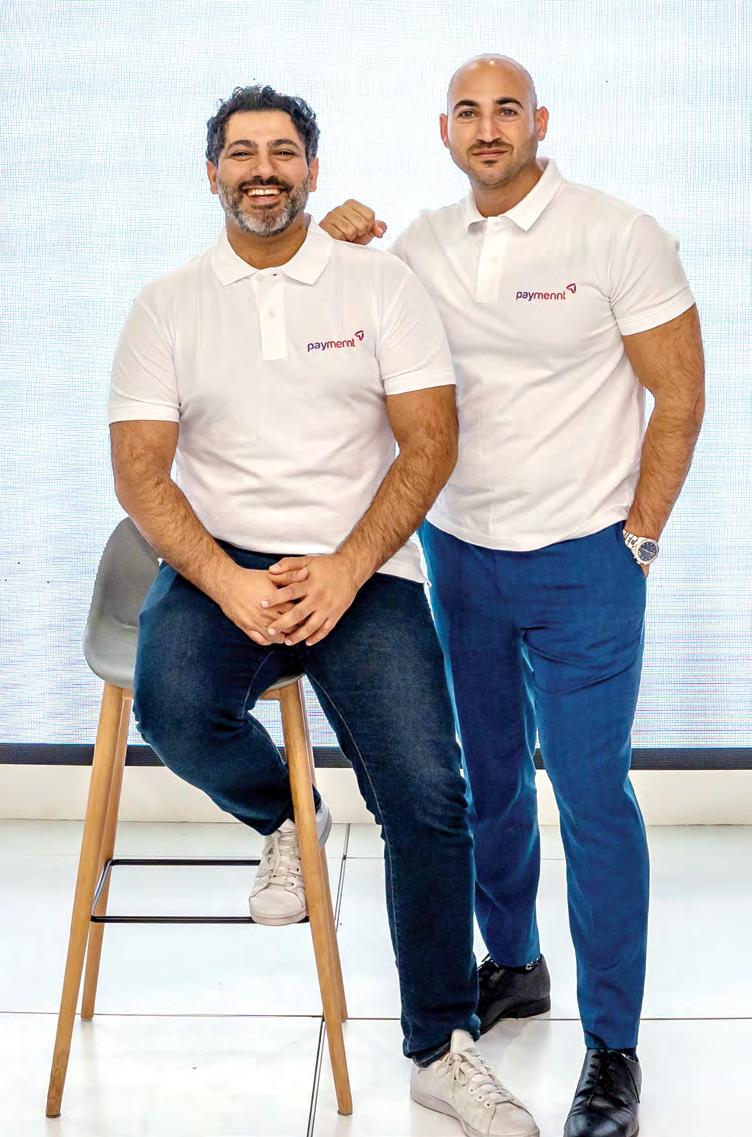
} Paymennt, on the other hand, was launched in 2017 as an online payment platform that enables SME merchants to process online payments through payment links, e-commerce payments, and QR code payments. Additionally, it also offers application program interface integration that allow SMEs to launch a web-based store, via an application
process that can be completed within five minutes. Since its inception, Paymennt -which was formerly known as PointCheckout- has built its reputation by helping over 3,000 micro and small businesses widen their reach across the e-commerce realm.
“Our merchants are already able to process online transactions without
having an online presence through payment links, for example, and social media sales, and the same account enables them to publish their items or services online on their website with a click of a button,” Ghobar explained, during an interview with Entrepreneur Middle East. “These tools allow merchants to slowly move online at their own pace
while keeping their current process so as not to shift the business entirely from day one or pay hefty fees upfront. With Hala’s tremendous experience in acquiring over 50,000 merchants within two years, we look to exponentially grow across the region and bring such tools to more merchants, and couple one account with online and offline payments.”
72 / ENTREPRENEUR.COM / March 2023 S /Ecosystem
The story behind Saudi fintech startup Hala’s acquisition of UAE-based online payment platform Paymennt
IMAGES COURTESY PAYMENNT
↑ BASHAR SALEH AND TAREK GHOBAR, co-founders, Paymennt.com
} Having thus observed and understood the needs of SME merchants in the UAE over the years, Paymennt co-founder Tarek Ghobar believes his entreprise is well-positioned to contribute towards Hala’s overall vision. “I believe it was our team and our growth story, and also the fact that the two company products complement each other [that made the Hala team go ahead with this acquisition],” Ghobar says. “An important next frontier in Hala’s product roadmap is online payment processing, and, similarly, our expansion plan included a regional rollout and launching additional value added services for our SME merchant base. Together, we will be able to provide merchants with a comprehensive solution to processing payments, starting from the business inception and in-person payments, and all the way to their venture into online sales and payment processing.”
} It’s clear, then, that this acquisition is one that has positively catered towards the business missions of both companies. Indeed, this would mark the second successful acqusition for Hala- the first being that of Saudi startup Fresh in 2021, which led to the addition of a new feature on its platform called Hala Cashier that allows the integration of non-financial value-added services to SME customers. That said, Ghobar admits that acquisitions are not always the easiest of exit strategies for startup owners. “However, more often than not, it is also a logical choice,” he adds. “The conversation with Hala started
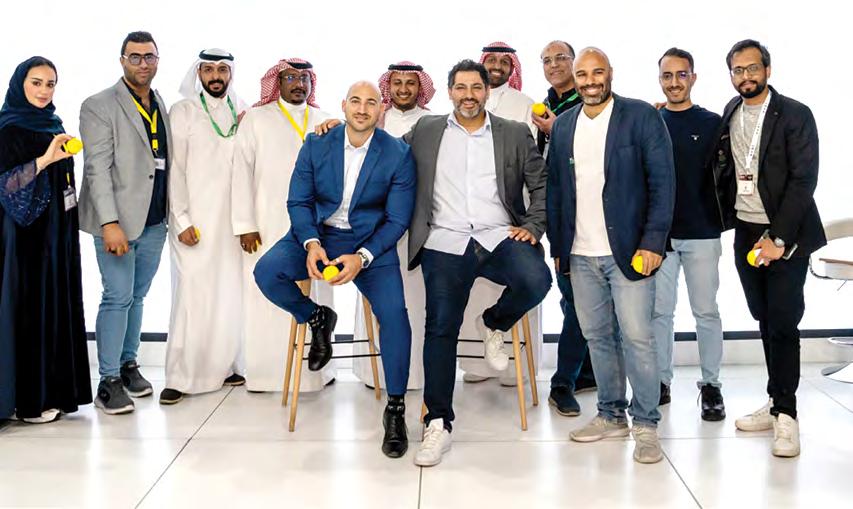
while we were fundraising for our company, and it quickly developed into that of an acquisition. We could not ignore Hala’s key performance indicator growth, and the potential for our company being part of their organization. But most importantly, we found mutual understanding in Hala’s leadership when it comes to business ethics, value creation, and entrepreneurial spirit. Credit goes to Hala’s founders for addressing our concerns, and working towards a deal with the flexibility required in such a complex conversation.”
Looking to the future, Ghobar remains confident about what Paymennt and Hala can achieve together. “The shared vision is to truly become a one-stop-shop for all payment processing needs and across all of the merchants’ customer interactions for small businesses, and then export this process to the rest of the world where similar challenges exist in their SME payment infrastructure,” he concludes.
Paymennt co-founder Tarek Ghobar on what entrepreneurs should consider before accepting an acquisition proposal
}The wellbeing of the team is first and foremost “Make sure their career comes with stability and growth opportunities.”
} Investors’ returns should be just as important “Engage the investors early on in the conversation so they can also help with leverage and/experience.”
}Make sure the acquiring company has a fitting culture “Often, corporates acquiring startups bring in a big mismatch for team members and founders, which isn’t always apparent from the initial talks and can cause the team to leave and results be affected.”
}Do the needed due diligence “Ask about the financial health of the company, and consult their investors if possible. In case the acquiring company had any other acquisitions in the past, certainly get in touch with other entrepreneurs, and get their feedback on their progress and any unmet promises.”
}The founder compensation (shares, salaries, cash, etc.) need to reflect their hard work “This is much more critical when the choice is between the founders’ financial outcome, and that of investors.”
73 March 2023 / ENTREPRENEUR.COM /
IT’S CLEAR, THEN, THAT THIS ACQUISITION IS ONE THAT HAS POSITIVELY CATERED TOWARDS THE BUSINESS MISSIONS OF BOTH COMPANIES.
↑ The founding teams of Hala and Paymennt.com
TREP TALK
IN FOCUS
A roundup of the up-and-coming startups in the Dubai-based Mohammed Bin Rashid Innovation Fund (MBRIF) accelerator program that you should be keeping an eye on
by AALIA MEHREEN AHMED
Clutch Space Systems
Built upon the belief that softwaredesigned systems can bring economic and technical advantages to space operations, Clutch Space Systems (Clutch Space) was created in 2018 in the English county of Surrey. “Our systems are a revolution in satellite communications, with massive capacity compared to traditional reflector dishes,” says Martin Philp,

co-founder and CEO of Clutch Space. “They are also designed to complement and enhance current ground-station-as-a-service (GSaaS) providers network with additional capacity at existing sites, and enhance coverage by filling in gaps between their established ground stations. Our services also include ground station services and developing systems- including those meant for commercial satellite operations.”
important to know that most artificial satellites -used for telecommunication, meteorology, and astronomy, among other things- are launched into low earth orbit (LEO), which is at an altitude of 2,000km or less. Within the space industry, LEO happens to be the lowest altitude a spacecraft must reach in order to orbit the earth.
Clutch Space, therefore, has two offerings- services catered towards satellite communications, and software systems targeted towards the ground segment
of space. “We have three sources of revenue: services on a subscription basis, services on a project basis, and systems sales,” Philp adds. The focus of this story,

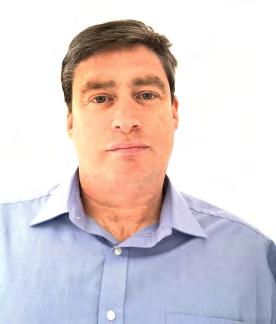
however, is on the startup’s software systems. But to understand them, one would first need a breakdown of the landscape Clutch Space operates in. For starters, it is
} But when it comes to the operations behind artificial satellite systems, there are three clearly demarcated areas: ground segment, space segment, and user segment. Ground stations, you will find, are the main base for parabolic antennas -also
74 / ENTREPRENEUR.COM / March 2023
S /Q&A
/clutchspace.com /
IMAGES
COURTESY
CLUTCH SPACE SYSTEMS
↑ MARTIN PHILP, AIGUL ANARBAYEVA, VLADIMIR TEN, founding team, Clutch Space Systems
known as reflector dishesthat exchange electromagnetic waves with LEO satellites. It is in this ground segment -an increasingly growing market expected to be valued at US$78 billion by 2031, as per global consulting firm Euroconsultthat Clutch Space primarily operates in. “We are concerned with the rush to commercialize the space industry, particularly because organizations with limited experience of operating in the space environment have a mentality of ‘fail fast and move on,’” Philp explains. “The consequences of such an approach are greater than merely financial ones. Essentially, the operational model for satellites in LEO is unfit for current and future purposes due to limitations in capacity, availability, and cost. For new space companies, contact time between operator and spacecraft is as low as 10% of the mission lifetime.”
} What Philp and his team deem “unfit” in contemporary LEO satellites has a lot to do with the dependence on hardware solutions. And although the cost of building and deploying LEO satellites has decreased over the years, it still requires sufficient capital expenditure to maintain and scale ground stations. In its quest to address these issues, Clutch Space has therefore come up with a software-designed GSaaS solution that is functionally compatible with most known legacy hardware units, so that it can be seamlessly integrated into an existing ground station setup. This not only ensures high performance communi-
cation, but also allows for an optimal reuse of equipment that is already installed, thereby reducing costs and increasing capacity. Plus, it is an offering that Philp and his team believe will greatly benefit the space industry.
“Since we design from first principles, we take a very different view to most in the industry,” Philp explains. “We have found this delivers
WE HAVE FOUND THIS DELIVERS THE FOUNDATIONAL CHANGES NECESSARY TO SUPPORT THE VAST QUANTITIES AND DIVERSE DEMANDS THAT WE ARE ONLY JUST BEGINNING TO SEE IN THE SPACE INDUSTRY.
the foundational changes necessary to support the vast quantities and diverse demands that we are only just beginning to see in the space industry. For example, we have re-approached the reflector dish for LEO operations- a design which has single satellite capacity, and had been used since [the time of] Russian cosmonaut Yuri Gargarin, who was the first person to go to outer space, and American astronaut Alan Shepherd. It is usually expensive to build and locate; however, with our own digital phased array system, we have been able to significantly reduce the form factor and cost, all while massively increasing the capacity from one to 20 satellites simultaneously.”
} Clutch Space, however, is only on the cusp of launching its software systems into the global market. Having used revenues generated through its services to fund its research and develop-
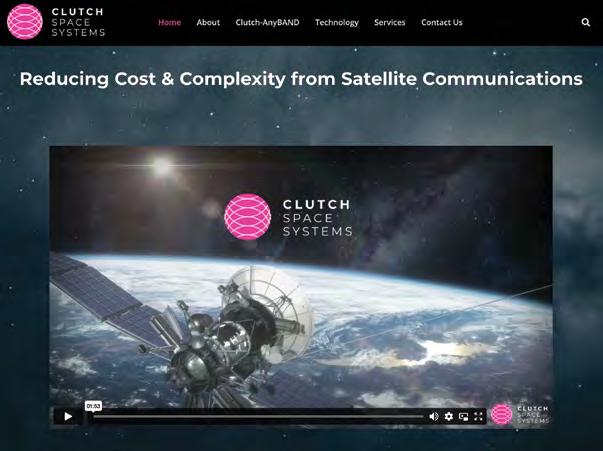
ment, the team has spent the last few years fine-tuning its solutions. And now, Philps says, they are ready to dream big. “We are coming to the market for two reasons: first is to obviously gain traction for the systems and services we provide, but to also raise funds for developing for the scale we are seeing in the demands for our systems and services,” he adds. “Our scaling from here knows no limits! We have applications at the core of the new space and deep space industries, as they grow into the trillion-dollar industries many are anticipating.”
} To its credit, the startup has already been making itself known within the space industry. In November 2020, Clutch Space entered into a collaboration with the European Space Agency to install one of its systems for the latter’s research related to spacecraft operations and related activities. It will come as no
surprise then that Philp hopes to create a buzz in the UAE next- a country that has taken rapid steps towards its space-related missions. For example, through its participation in the MBRIF accelerator program, the Clutch Space team hope to get acquainted with the Mohammed Bin Rashid Space Centre (MBRSC), a Dubai government organization working on multiple UAE space programs including the Emirates Mars Mission and the Emirates Lunar Mission.
“We see our location in the UAE as critical to our future success,” Philp says. “The location is essential for logistics, production, global operations, as well as our international recruitment. Our aim matches the ambition of the MBRSC, as well as the government of the UAE when it comes to their plans for operating and successfully exploiting opportunities in space.”
75 March 2023 / ENTREPRENEUR.COM /
Digital Energy
Launched in 2016, Dubai-based tech startup Digital Energy uses artificial intelligence (AI) to help energy intensive companies track, trace and then sustainably optimize the resources they use. To describe the ecosystem in which his startup operates, founder Morgan Eldred has coined the term “environmics”- a combination of sustainability practices and economic strategies.
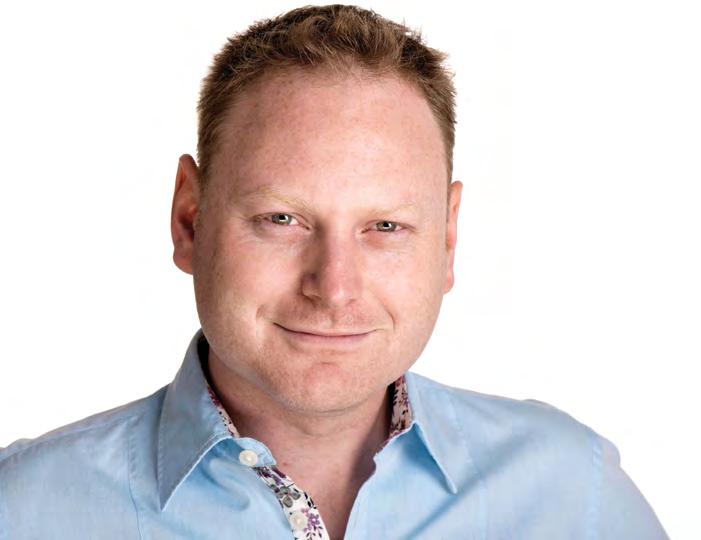
“Digital Energy aims to address the high levels of emissions from industrial waste of energy and water, which then leads to inefficient costs,” Eldred explains. “Being in the UAE -which places a high importance on environmental protection, and is the host of the 28th session of the Conference of the Parties (COP28)- inspires the company to improve supply chain operations and field work with advanced digital solutions. The goal is thus to create a sustainable future for the coming generations. Dubai is a hub for investors with similar views, making it the ideal place to initiate solutions!”
} When Eldred first decided to take on the challenge of solving such energy-based inefficiencies in multiple sectors, he did so with the assurance that he possessed the right knowledge for it. You see, prior to launching Digital Energy, Eldred had been an energy research director at Stamford-based technological research and consulting firm Gartner, worked in strategy development for UAE-based marine fuel commercial
buyer Maersk Oil, and also done transformational program delivery at Denmark-based oil and gas company Shell. Deriving from these experiences, he came up with AI-driven solutions to help companies reduce emissions, resources, waste, as well as costs across supply chains and operations. As a result, Digital Energy’s operations are split into three: a unique three-step process to track and trace every element in a given supply chain, an environmics-driven service that allows companies to prioritize critical resources, and a collaborative platform to connect fieldwork, supply chain and planning into one solution. “The business model includes subscriptions and licenses, and some instances may explore profit sharing or servicebased models,” Eldred adds. “Our differentiating factors are our team of diverse digital and energy experts, the use of AI trained on large cross-industry data sets, and proven impact with clients across the supply chain.”
} Since its launch, the startup has seen considerable growth. However, it was in the aftermath of the COVID-19 crisis that Digital Energy witnessed 100% year-on-year growth. “We expect to continue this growth in 2023,” Eldred says. “To date, the company has been customer- and partner-funded. The team has over 25 employees, with a large research and technology partner network. The company is now exploring investment rounds, with a focus on the large, untapped market of AI solutions for Scope 3 [a level to indicate indirect emissions that occur in a company’s value chain] greenhouse gas emissions tracking.”
In achieving these goals, Eldred believes being based in the Emirate of Dubai -which has also allowed for his startup’s enrolment into the MBRIF program- will certainly be a positive factor. “Dubai’s successful economic initiatives have been a motivator for the startup- the city’s infrastructure is a major benefit, attracting investors to contribute to positive causes,” he adds. “The MBRIF too supports sustainable innovation that aligns with the company’s goals and values. A challenge, however, has been educating the market on the need for a different perspective, and breaking away from relying on industry giants for technology.”
Having thus realized that much work still needs to be done in terms of shifting mindsets, Eldred says he never overlooks the need for human touch in the midst of technological advancements. “Innovation is crucial, but human intelligence is also essential to embed within AI,” he declares. “Our company leverages technology for its ability to process information and provide focused insights, but human creativity is still necessary to think about future solutions!”
76 / ENTREPRENEUR.COM / March 2023 S /Q&A IMAGES COURTESY DIGITAL ENERGY
↑ MORGAN ELDRED, founder, Digital Energy
digitalenergy.ai /
/
StonAI
facets of a project can then be seamlessly connected to ensure efficient use of resources.
} All this, of course, ultimately contributes towards saving the time and money that is spent on documentation and other tasks management. “Our value-adds include saving time, recovering costs, and increased efficiency of up to 30%,” Alkaisi adds. “We have patented some models in relation to document extraction and archiving. In terms of revenue generation, we offer different tiers of licenses based on size of the project, number of employees, and project duration. Our license subscriptions are per month per project.”
Doing away with mundane administrative tasks to increase overall efficiency is something many industries hope to achieve, and the construction sector is no different. Offering a digital assistant platform that can automate document-related tasks for construction companies is Dubai-based tech startup stonAI.
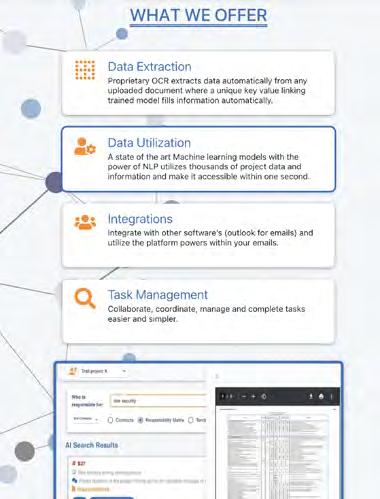
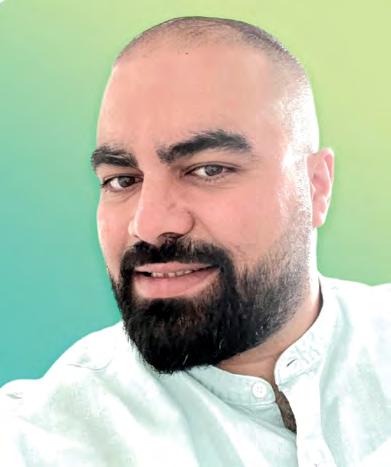
} “StonAI was created with an aim to digitize and automate tedious management tasks in the construction industry, thereby making access to contractual references and documents faster and easier,” says Yaseen Alkaisi, founder and CEO of StonAI. “Coming from the construction industry myself and having managed big projects, I also had a passion for new technologies such as artificial intelligence (AI) and
machine learning (ML)- these were the main drivers that led me to innovate and solve the issues in construction projects.”
Claiming to offer the first ever intelligent assistant software for construction projects, the StonAI platform uses AI-driven models that can prioritize essential time-consuming tasks within a given project. The platform also offers a proprietary optical character recognition solution that extracts data automatically from any uploaded document, which can then be used to automatically fill in information on other forms. Using ML models that are powered by natural language processing, StonAI also offers the ability to access and utilize thousands of project-related data and information within a few seconds. Using these tools, different
StonAI’s beta version was launched in May 2022, with the platform having officially launched in November that same year. Bootstrapped so far, the startup expects to have paying customers by the end of 2023’s first financial quarter. “StonAI is currently exploring UAE and Saudi markets, and shall expand to other GCC countries by the second quarter of 2024 and globally by the third quarter of 2025,” Alkaisi adds. “The support and initiatives by the Dubai government to support startups and innovation in the city have always been a core benefit to us, along with access to high level mentors and advisor networks.” Here, Alkaisi also highlights the benefits of his startup being a part of the MBRIF accelerator program. “The MBRIF program has been an elite program for innovators like us,” he says. “We’ve been greatly helped through its systemized program, access to high mentor profiles and networks, and the support offered by the program managers and organizers.”
77 March 2023 / ENTREPRENEUR.COM /
/stonai.com/
↑ YASEEN ALKAISI, founder and CEO, StonAI IMAGES COURTESY STONAI
OUR VALUE-ADDS INCLUDE SAVING TIME, RECOVERING COSTS, AND INCREASED EFFICIENCY OF UP TO 30%
AI Supply Chain Sensing
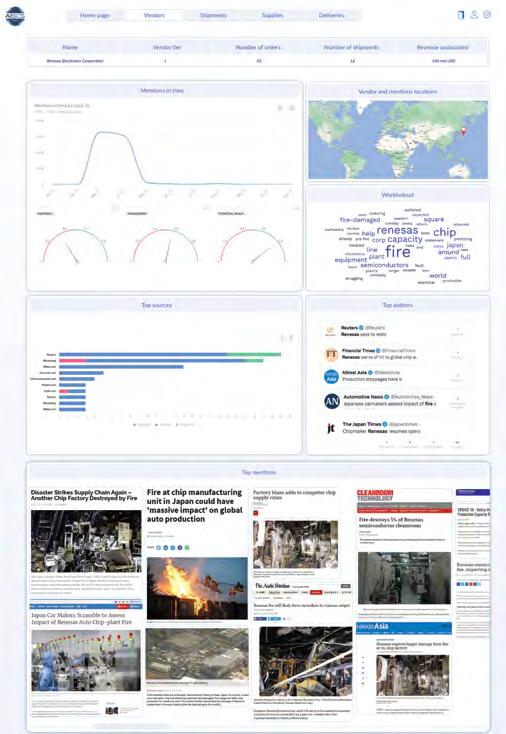
Out of stock”: this is a phrase many of us may have become familiar with thanks to our purchasing experiences. But behind this three-word epithet is an issue that comes with a heavy price: supply chain disruption. A report by American cloud-based warehouse management system solution company 3PL Central shows that in 2021 -in the midst of the e-commerce boom- global businesses lost US$184 million due to supply chain disruptions alone. Having realized that the Middle East isn’t insulated from the same problem, Greg Urban and Piotr Sulima founded Dubai-based AI Supply Chain Sensing (AISCS) in 2022.
“Supply chain disruptions are one of the current economy’s biggest challenges, leading to sales and production blockages,” says Urban. “Classic supply chain management does not solve the problem, and even modern solutions are limited to providing information, not predictions. However, the internet is full of data that can be used as warning signals. Our solution allows customers to predict supply shortages, before vendors inform them about orders cancelation or delays. Customers can take proper action to prepare for this situation.”
} Indeed, prevention is better than cure. In the case of supply chain disruptions, the solution often follows after they occur. But Urban argues that AISCS’ solution bypasses the need for such a reactive response by adopting a more proactive approach.
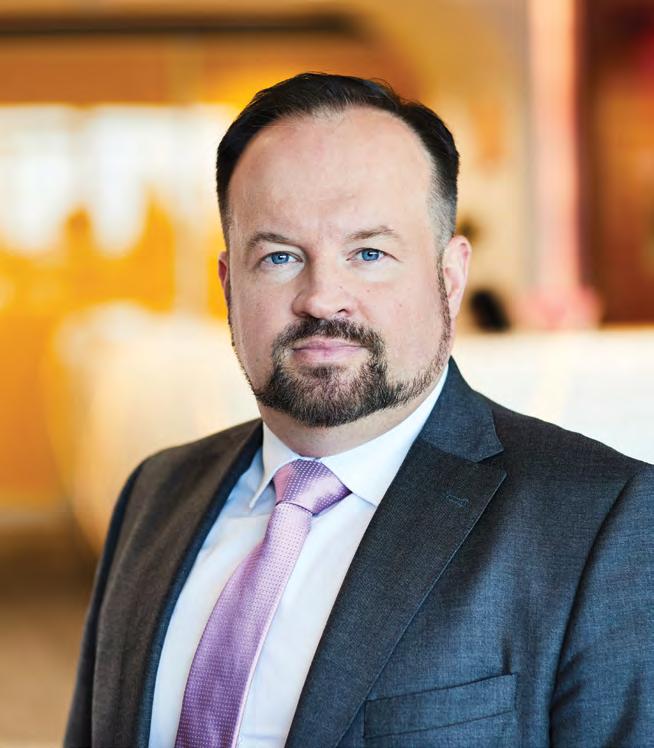
78 / ENTREPRENEUR.COM / March 2023
↓ GREG URBAN , co-founder and CEO, AI Supply Chain Sensing
/scsensing.ae / S /Q&A IMAGES COURTESY AI SUPPLY CHAIN SENSING
↑ AISCS ' artificial intelligence algorithms draw conclusions from different internet sources and learn from previous disruptions
“To do that, we combine know-how from the supply chain and internet monitoring using artificial intelligence to understand natural language, and to learn customers’ supply chains,” he says, while adding that AISCS delivers on this promise in three ways. First, its technology maps a given supply chain to detect and monitor transportation and logistics bottlenecks. Next, it offers early alerts and what-if analyses regarding changes in transportation flowsthis, for example, could mean information on the selected means of transport before an order leaves a factory. And finally, using artificial intelligence, AISCS sends clients warning signals on rapid changes in orders, stock management, as well as for placing new orders with other vendors.
} The reasoning behind the AISCS operational model is backed by hard facts, of course. A 2022 study published in The Network Effect, a platform that discusses the latest logistics tech innovations, notes that legacy systems and traditional software solutions mainly contribute to supply chain inefficiencies. The same study notes that companies require “modern, technology-based solutions that provide them with greater visibility and actionable insights to handle potential supply chain disruptions.” And it is a solution built on precisely such ideals that AISCS offers. “We predict supply chain disruptions, while other solutions only provide information about them when they happen,” Urban
SUPPLY CHAIN DISRUPTIONS ARE ONE OF THE
BLOCKAGES
explains. “Technology innovation thus has a crucial role in our future success. We develop artificial intelligence algorithms to draw the proper conclusion from different internet sources, and learn from previous disruptions. Our software learns the supply chains of our clients to predict problems better.”
} Currently in the initial stages of its launch, AISCS has gathered select clients to gain inputs for any further required development of its solutions. “The service is based on business-to-business subscriptions which depend on the level of integration with customers’ enterprise
resource planning and transportation management systems, as well as the number of vendors tracked,” Urban explains. “At the moment, there are three people on our team and a bunch of external subcontractors.” In setting up his business in Dubai, Urban admits that while there are plenty of benefits, there have been some significant downsides to it too.
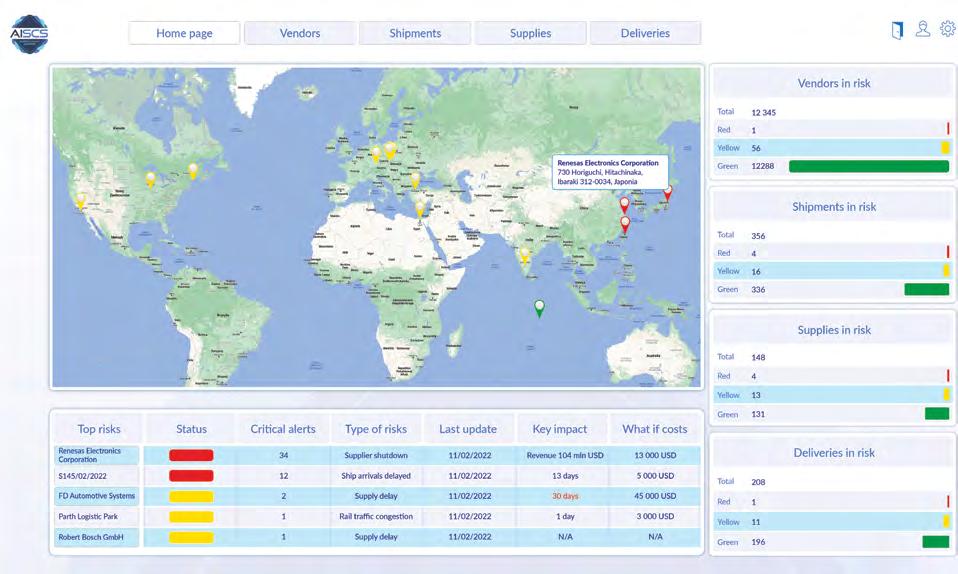
}“Dubai offers a friendly environment for entrepreneurs with a lot of institutional support to set up business,” Urban says. “However, there is a lack of early-stage investment funds ready for higher risk [projects], and no financial support similar to
European Union funds. The biggest challenge up till now was to set up a bank account- something which takes 10 minutes online in other countries, took five months with tons of paperwork in Dubai.” Fortunately, however, the startup has found some guidance on how to navigate any other potential issues by enrolling in the MBRIF accelerator program. “The MBRIF program has allowed us to access the local market, and to have a critical look at our business,” Urban declares.
↓ AISCS ' early alerts about transportation issues allow conducting what-if analysis on any changes that occur within transportation flows.
79 March 2023 / ENTREPRENEUR.COM /
CURRENT ECONOMY’S BIGGEST CHALLENGES, LEADING TO SALES AND PRODUCTION
Arabic is an incredibly complex language with a rich vocabulary and intricate grammar, and it is spoken by 467 million people, but most people are not able to use it without errors.” That is how Noor Alasadi summarizes the need for his startup Lisan, an Arabic proofreading platform and integrated writing assistant. “There has not been any successful implementation of artificial intelligence (AI) infrastructure for Arabic, which has rendered machines incapable of comprehending it,” Alasadi adds. “Hate speech, gender-biased language, and extremist content are very common on the web. But there was no awareness, as such, regarding that- whether it was in media, in books or in social media. We felt like we bear part of the responsibility to change that.”
} Born out of such keen observations, Lisan -which quite literally translates to “tongue” in Arabic- was launched in Dubai in 2021. “Lisan is an AI writing platform offering state-of-the-art proofreading and grammar checking to help individuals who write in Arabic to maximize their productivity, create exceptional content using cutting-edge generative AI models, and automate tasks with AI accelerators,” Alasadi says. “It has 12 products, including a state-of-the-art spelling and grammar checker, generative AI models, text mining engines, social networking analysis, and optical character recognition systems for the Arabic language. Lisan is not a product; it is a path that seeks to dominate AI, content technology, and even the cybersecurity sectors in the MENA region.”
The 12 products Alasadi alludes to aim to correct 12 specific types of errors, which include spelling, grammatical, morphological, semantic, and stylistic errors, as well as mistakes related to checking quotations and proper names. As per the Lisan team, these are some of the most commonly repeated types of mistakes, and the platform can detect them with a 98.6% accuracy rate. It is also important to highlight that Lisan’s AI-driven model can also search and cite verses from religious texts such as the Holy Qur’an, as well as scientific and
legal documents. “We are targeting the Arabic market and offering a unique product to help improve writing skills, but our platform also provides outstanding learning experiences and analytical tools,” Alasadi adds.
} Lisan’s services, therefore, have received interest not just from individuals looking to write better, but also from governmental entities and e-learning platforms. “For business-toconsumer users, we offer a freemium model,” Alasadi explains. “However, for business-to-business and business-to-government customers, we have a shared-revenue business model with our partners, allowing us to profit as they benefit from and sell our products. We believe Lisan is currently the most comprehensive provider of artificial intelligence and natural language processing solutions in the MENA region!”
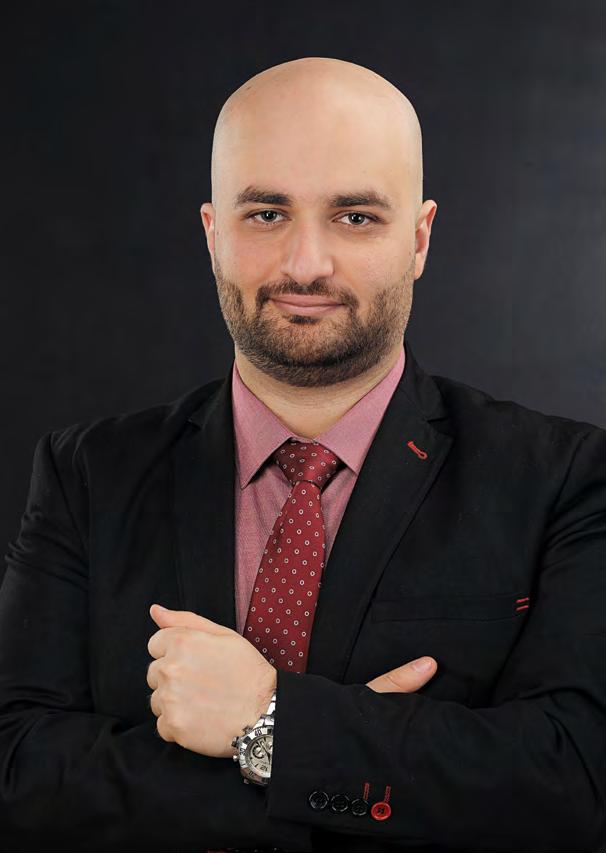
80 / ENTREPRENEUR.COM / March 2023 S /Q&A IMAGES COURTESY LISAN
Lisan /
lisan.ai/
LISAN IS NOT A PRODUCT; IT IS A PATH THAT SEEKS TO DOMINATE AI, CONTENT TECHNOLOGY, AND EVEN THE CYBERSECURITY SECTORS IN THE MENA REGION.
→ NOOR ALASADI, co-founder and CEO, Lisan
} But it wasn’t easy getting Lisan off the ground, at least in its early days. “Things were really hard at the beginning; Dubai, in general, is an expensive city,” Alasadi recalls. “The biggest challenges of operating in the UAE have been the high costs in renting business premises, and the difficulty of finding and retaining qualified staff, as the employment market is quite competitive.” But despite such challenges, Alasadi and his team managed to navigate their way towards success. For one, their enrollment in the MBRIF accelerator program brought forth such much needed respite. “I chose the MBRIF, due to its comprehensive accelerator program, which provides an abundance of resources, connections, and mentorship,” Alasadi says. “Furthermore, its amazing and supportive team has always been with us, no matter what hardships arise.”
} Things have now started looking up for Lisan- and it is this sense of optimism Alasadi will hope for his team to carry into the rest of 2023. “Everything really got exciting once we had a solid foundation, and customers started to respond to our products,” he says. “It was also exciting to see others in the UAE showing support for our business, which made it easier to scale up and reach more customers. The biggest benefits of operating in the UAE are the numerous incentives and resources that have been put in place to help young entrepreneurs and startups get started, such as funding and tax exemptions.”
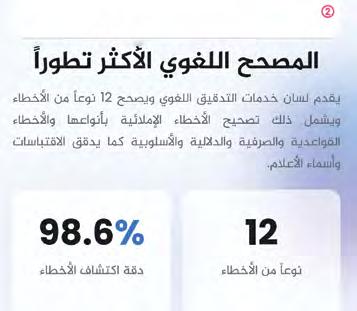
The Future of Food
KHALED BIN ALWALEED'S KBW VENTURES INVESTS IN SEATTLEBASED REBELLYOUS FOODS’ EQUITY ROUND
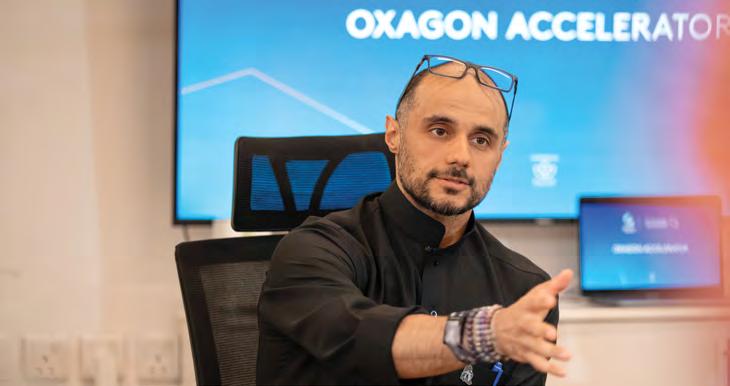
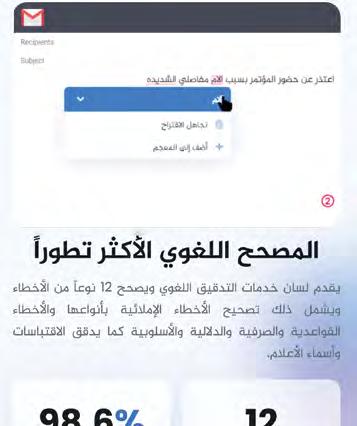
AFTER PARTICIPATING in Rebellyous
Foods’ US$6 million Series A round in April 2020, KBW Ventures, the investment firm founded by Saudi Arabia’s Prince Khaled bin Alwaleed bin Talal Al Saud, has backed the Seattle-based food manufacturing technology company again by investing in its new $9.5 million equity round.
Founded in 2017, Rebellyous Foods, whose current offerings include plant-based faux chicken nuggets, patties, and tenders, has developed patented technology that unlocks production at cost-parity to animalbased chicken. The company, which is led by founder and CEO Christine Lagally, aims to use its latest investment to deploy its breakthrough equipment, while continuing on its mission to grow accessibility and availability of plant-based meat through tech-backed solutions.
Speaking to Entrepreneur Middle East, Prince Khaled pointed towards Rebellyous Foods’ revolutionary tech as being the main driver for his company’s investment in the company. “Over the past three years, Rebellyous has focused a lot of its resources on honing its proprietary technology and approaches to food production; it’s one of the main reasons KBW Ventures has so much confidence in the company,” Alwaleed said. “In addition to the technology, a real sector gamechanger, we have confidence in Rebellyous’
leadership, products, and business development, this all leads to renewed interest in supporting their growth with funding. We also found the expansion roadmap very promising with the increased number of vendors and retailers opting for Rebellyous products.”
In a statement, Lagally, who was once an aerospace engineer, contended Rebellyous Foods’ latest fundraise to be a reinforcement of the objectives with which the company was launched. “During a tough economic slump, we are thrilled by this testament to investor belief in Rebellyous, and in price parity as a solution to sustained growth of plant-based meat in the marketplace,” she said. “The world is in desperate need of viable solutions to animal agriculture, and we are delighted we are one step closer to delicious, affordable plant-based meat for all.”
Besides KBW Ventures, Rebellyous Foods has secured the support of investors like Clear Current Capital, Fifty Years, Liquid 2 Ventures, CPT Capital, and Agronomics. After being founded to provide the plant-based meat industry the tools needed to radically increase production capacity while dramatically lowering costs for high-quality plant-based meat, Rebellyous Foods now finds its products in more than 1000 retail locations and more than 100 school districts across the United States. kbw-ventures.com
81 March 2023 / ENTREPRENEUR.COM /
→ PRINCE KHALED BIN ALWALEED BIN TALAL AL SAUD, founder and CEO of KBW Ventures
startups or entrepreneurs who feel as passionately as we do for a sustainable future to apply to the Greenhouse Accelerator Program, and join us in shaping a better tomorrow.”
The participants that are chosen for the six-month program will be challenged to demonstrate collaboration and measurable progress based on a mutually developed action plan. They will receive support in the form of a US$20,000 cash grant, one-onone mentorship via access to experts from PepsiCo and partners, market activation, and access to networks and business opportunities. When the program ends, one winning company will be awarded an additional $100,000 in funding to continue its expansion, as well as a potential opportunity to extend its partnership with PepsiCo to further expedite its growth.
Shaping a Better Tomorrow
PepsiCo’s
Greenhouse Accelerator Program: MENA Sustainability Edition returns
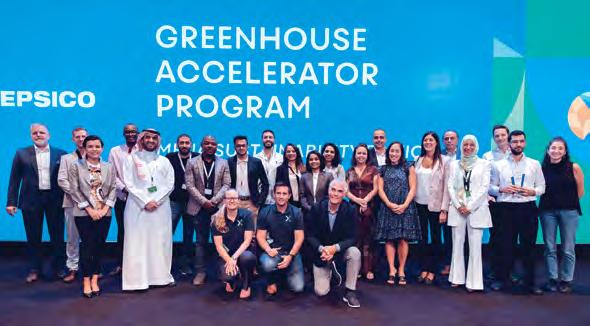
PEPSICO HAS LAUNCHED the second edition of its Greenhouse Accelerator Program: MENA Sustainability Edition.
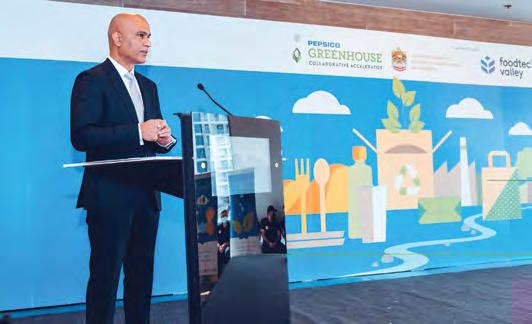
Run in partnership with the UAE Ministry of Climate Change and Environment (MOCCAE) and Food Tech Valley, the program will be accepting applications from startups with innovations capable of advancing sustainable practices in agriculture across the MENA region until April 10, 2023.
The theme for the new edition -sustainable agricultural practices- is closely aligned with PepsiCo’s end-to-end transformation strategy, PepsiCo Positive (pep+) and its underlying ambitions for positive agriculture, as well as aiding in the region’s relief from food insecurity.
Following the success of its inaugural MENA edition, this second edition of the Greenhouse program will seek applications from established and revenue-generating startups that are developing business models related to processes, products, and/or technologies supporting the management of direct farming operations that will help both reduce the carbon footprint in the agricultural space and enhance food security in the region.
Aamer Sheikh, CEO - Middle East, PepsiCo, noted that innovation, a passion for sustainability, drive, and a solutionsoriented mindset are the values that the company would like to see applicants demonstrate throughout the program. “What will set them apart is a solid understanding of the geographical and food security challenges in the region, a unique perspective on the solution, the ability and technology to innovate, the desire to learn through mentorship, the flexibility to pivot, and ultimately, the ambition to scale,” Sheikh said. “We believe this combination can create the kind of positive change that will benefit generations to come. Innovation is critical to us addressing some of the most pressing climate challenges we’re facing. We want to encourage all
PepsiCo’s Greenhouse Accelerator Program is a global mentorled initiative to help entrepreneurs in the sustainability space grow through collaboration and knowledge sharing. The program was launched in Europe in 2017, and then in North America in 2019. The first regional edition of the Greenhouse Accelerator Program: MENA Sustainability Edition was launched in 2021 with the theme of sustainable packaging and recycling, with the winner being UAE-based Nadeera, a social enterprise that leverages technology to promote waste sorting at source.
Looking back on his participation in the program last year, Rabih El Chaar, co-founder and CEO, Nadeera, said that the experience was very different from any other initiative he and his team had partaken in. “An overwhelming corporate ownership was evident from the launch event until closing,” he noted. “PepsiCo was mobilized in its entirety to ensure startups are well supported and pushed beyond their limits... Also, the exposure that Nadeera received as a result of this program is overwhelming. As such, this program catapulted Nadeera to be literally at the forefront of the waste diversion industry in the GCC and we are still experiencing the effects of this momentum until now.”
El Chaar’s advice for this year’s applicants to the program is to focus on the results, and communicate them clearly and effectively. “PepsiCo is a results-driven organization,” El Chaar pointed out. “They want to see tangible return on investment of the program to your startup. So, take the program seriously, and ensure you are able to specifically demonstrate the impact you were able to realize throughout the program.” greenhouseaccelerator.com/MENA
82 / ENTREPRENEUR.COM / March 2023
In The Loop/ IMAGES COURTESY PEPSICO
↑ AAMER SHEIKH, CEO - Middle East, PepsiCo
↑ The candidates of the first installment of PepsiCo’s Greenhouse Accelerator Program - MENA Sustainability Edition
































 by MEGHA MERANI
by MEGHA MERANI








































 Véronique Courtois, the CEO of French beauty brand Guerlain, feels a sense of responsibility for her future female successors
Véronique Courtois, the CEO of French beauty brand Guerlain, feels a sense of responsibility for her future female successors

































 GOPALANI
GOPALANI









 AALIA MEHREEN AHMED
AALIA MEHREEN AHMED































